The Annual Review of GIRTON COLLEGE
University of Cambridge 2023/2024


The Annual Review of GIRTON COLLEGE
University of Cambridge 2023/2024

Details of events in the calendar can be found in due course on our website at:
Hosting events is an important way for the College to stay connected with alumni and supporters, and we look forward to welcoming as many of you as possible to the College during the upcoming year. Our provisional schedule for 2025 is set out below. To ensure you receive your invitation, and the latest news and information, please update your contact details by using the form or QR code accompanying The Year mailing or on our website at Update your details | Girton College All events take place in College unless otherwise stated
FEBRUARY
17 Mountford Humanities and Arts Communication Prize 27 Jane Martin Poetry Prize
MARCH 3 Hammond Science Communication Prize
5 Law and Finance Networking Reception in London
15 Girton Alumni Sports Association Sports Matches and Dinner APRIL 4 MA Dinner
5 MA Congregation MAY
3 Medical and Veterinary Symposium and Dinner
JUNE
21 May Bumps and Boat Club Dinner
TBC May Week Concert
SEPTEMBER
13 Alumni Reunion Dinner for 2014 and 2015
26 Alumni Reunion Dinner for 1998, 1999 and 2000
27-28 Roll of Alumni Weekend
27 Library Talk (all welcome)
27 Lawrence Room Talk (all welcome)
27 Concert for the Roll (all welcome)
27 Roll of Alumni Dinner (all welcome, especially Matriculation years 1965, 1975, 1985)
28 Gardens Talk (all welcome)
OCTOBER
18 Commemoration of Benefactors Ceremony and Foundation Dinner
NOVEMBER
4 Girton Global History Lecture
The Annual Review of GIRTON COLLEGE
University of Cambridge 2023/2024
Welcome to The Year 2023/ 24
Dr Elisabeth Kendall Mistress

It’s hard to believe another year has flashed by at breakneck speed. There’s no denying that Girton has its own unique momentum propelling the terms along in a happy blur of energy. Thankfully, it’s easy to press ‘Pause’ and savour any given moment. Indeed, as I look back over the year, I can’t help feeling both warmth and pride as I marvel at how this College pulls together to make the whole greater than the sum of its parts. Two years in, the Girton gloss has not worn off.
As the year began, we celebrated 150 years since our College moved to its current site in 1873. We planted our flag on the fringes of Cambridge so our studious young ladies could thrive in beautiful green surroundings – whilst residing at a safe distance from their male counterparts. But our early pioneers did not hang around on the outskirts. They cycled or rode into town to attend lectures and sit the full-blown university exams (shunning any diluted version), though it would be nearly eight decades before women were finally awarded degrees.
It's safe to say that pushing boundaries is in Girton’s DNA. But we’re not resting on our past wins. Not at all. Today, even as Cambridge inches up to the very doorstep of Girton with the new West Cambridge Innovation District, our sights are set firmly on the world beyond.
We are a first-class community of scholars, conscious of our ability –indeed our duty – to make a difference on the global stage by attracting the very best students and Fellows, irrespective of means or background. In doing so, our glorious 50-acre estate is a tremendous asset, and we have exciting plans to enhance it to extend our College’s pulling power and global reputation (watch this space).
Our mission is not only to ensure our scholarly community thrives at Girton, but also to build strong pathways to the world outside Girton. For students, that might mean smoothing the transition from degree to job through new internship, volunteering and mentoring initiatives. For Fellows, our support includes helping to communicate their ground-breaking research in new and creative ways to audiences around the world. To see this in action, follow us on YouTube, LinkedIn, Twitter, Facebook or Instagram.
Girton is now known not only as a buzzing, joyful College, with an ethos of inclusive care, but also as a scholarly powerhouse – the place where exciting research happens. Our Fellows are tackling big game-changing questions, often from angles that are – in true Girtonian spirit – highly innovative: from why animals talk, the quantum possibilities of time travel, and extraordinarily ambitious ways to halt Arctic melt, right through to the geopolitics of volcanoes, the secret history of the wellness movement…and even how Arabic poetry can inform counter-terrorism!
There’s very little this College doesn’t do, and do well, supported by our outstanding staff. Educational excellence is at its core. But we do so much more, from student presentation nights, science and arts communication prizes, our ‘Skills Programme’, internships, Green awards, drama, recitals, singing, sports of all kinds, right through to apple picking and beekeeping. You can read all about it in the pages that follow. We hope you like The Year’s new look which we’ve designed to reflect the creative spirit that runs through Girton.
Girton is more than just an institution, it’s an exceptional community and a vibrant enterprise. It’s a place where the extraordinary is everyday.
Many thanks to all our contributors this year, and as ever to the stalwart editorial team of Jill Jondorf, Cherry Hopkins, Ross Lawther, Hannah Sargent and Rachael Humphrey. Also much gratitude to our new designers — www.thedistrict.co.uk. Caroline Shenton (Editor), theyear@girton.cam.ac.uk


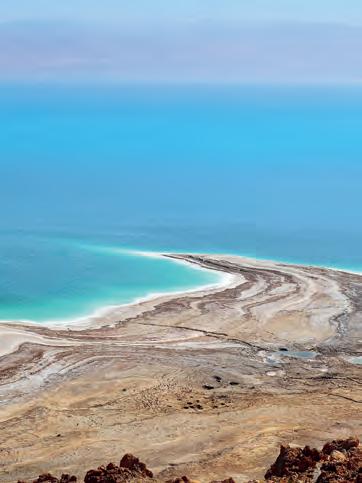
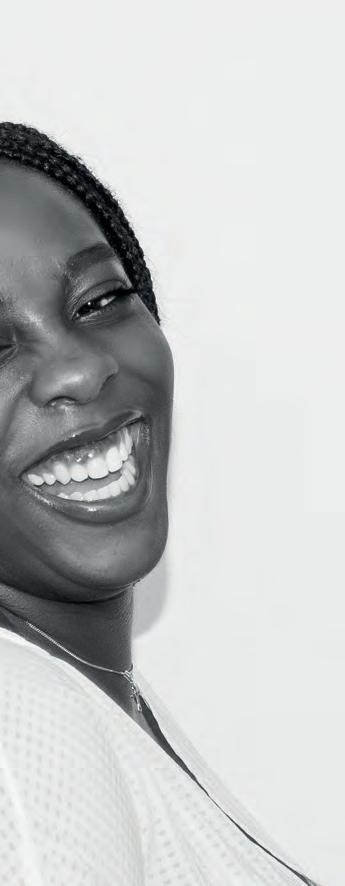







Friends Reunited Over 300 Girtonians and their guests attended our 2023 Alumni Weekend. It featured talks, discussions, a concert, and a full house at the Roll of Alumni Dinner in the evening with a series of joyous reunions for those from 1963, 1973, 1983 and 1992–94. Time for Girton ① During the Weekend there was a book launch for Girton Time, illustrated by Dr Carol Adlam, based on her residency at Girton in 2021–22 and including poems by poetry group convenors Dr James Wade and Adam Crothers. Library and Museum Talks We welcomed Dr Brigitte Stenhouse (Lecturer in the History of Mathematics at The Open University) as the speaker for the annual Library Talk, this year on ‘Quaternions at Twilight: Mary Somerville's studies of mathematics in old age’, followed by Dr Emma Brownlee’s Lawrence Room Talk on Girton’s ancient burial grounds. Both demonstrated the importance of networking in academia, showing that some things have not changed in 150 years. Concert for the Roll Tim Watts (Fellow of St John’s College and alumnus) returned to Girton for the Weekend to give a piano-duet concert with the Director of Music, featuring sonatas for four hands by Mozart and Poulenc, and suite movements by Koechlin and Debussy. The People’s Portraits ⑤ Unveiled at the People’s Portraits reception were two new paintings for the national collection held at Girton and open to the public: Leonard McComb’s ‘Rebecca Hawkins' and 'Vanitas' by Miriam Escofet RP. Girton in Space The International Astronomical Union announced that in partnership with the Catalina Sky Survey and the British Astronomical Association two asteroids have been named after Annie Maunder and Alice Everett, Girton mathematicians who arrived at College in 1886.
Freshers’ Welcome ② A total of 335 new undergrads and postgrads arrived and matriculated as students of Girton. The MCR Freshers’ events made good use of Cloister Court and Storey’s Field Centre at Eddington with improv, board games, movies and even a brass band. A Place Called Home ④ Girton marked 150 years on our current site. On or close to Saturday 18 October 1873 some 22 women moved into the first building at Girton, now known as Old Wing. An exhibition continued through the month, drawing on records in the College Archive, looking at the first building, the people who helped fund it and the early College members who lived in it. Giving Day Raises Over £115K 360 donors from 25 countries made a gift during the day: an incredible display of generosity from Girtonians all over the globe. Most donations went to the Annual Fund which will make a real difference to our students, now and in the future. Thank you so much! Jazz from the Heart ③ Multi-award-winning international saxophone star Tony Kofi visited Girton to lead a concert as part of our celebrations during Black History Month, with Chaplain Tim Boniface also on saxophone and renowned jazz artist and Musicianin-Residence James Pearson on piano. An energetic Old Hall swung to the sounds of some international–standard jazz. A Moving Event This year’s Commemoration of Benefactors and Foundation Dinner celebrated the 150th anniversary of the relocation to Girton and the supreme energy and effort of our founders in achieving it. Music by former student Alice Rivers featured at the ceremony, and dinner was preceded by a concert with former Music student Jâms Coleman (piano), fresh from his Proms debut, and cellist Jamie Walton, director of the North York Moors Festival.

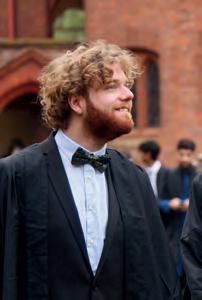






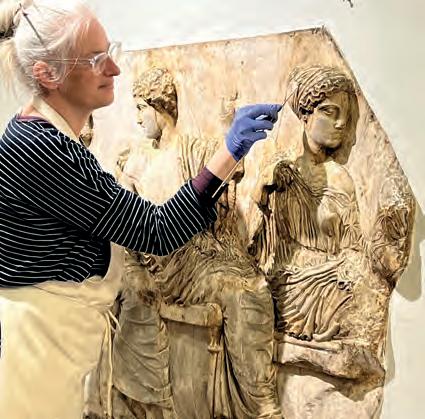
Yes, Prime Minister! ① Former Prime Minister of Australia, Julia Gillard AC, was admitted as an Honorary Fellow. ‘In conversation’ with the Mistress before a College audience she discussed her famous ‘misogyny’ speech, politics, education and advice for young adults embarking on their careers.
Remembrance Day Concert A programme of elegiac Baroque music was performed in Chapel by Tomma Wessel (celebrated recorder player from Belgium), Professor Margaret Faultless (Bye-Fellow), Geirþrúður Anna Guðmundsdóttir (Icelandic–American cellist) and Dr Martin Ennis (Director of Music). The concert included the premiere of a piece by Dr Marta Gentilucci, Official Fellow in Music Composition. Opera in the Chapel On three successive evenings, Girton students and friends presented Gian Carlo Menotti’s The Medium, a two-act opera, directed by Alex Wrathall and conducted by Emily Clare-Hunt. A Girton Scrapbook ② We received various new acquisitions for the Archive this year, including a scrapbook by Muriel Pearce (1936, Natural Sciences). It contains material from Muriel’s time at College and beyond, and captures some of student life in the 1930s, adding to our record of the Girton experience. We are grateful to everyone who has donated material throughout the year. Cambridge Jazz Festival A sold-out evening celebrated ‘Oscar Peterson and the saxophonists’ with Musician-in-Residence James Pearson on piano, Chaplain Tim Boniface on sax, Jeremy Brown (Royal Academy of Music) on bass and Sophie Alloway, the ‘Goddess of Groove’ on drums. Betty Wood Symposium We marked the life and work of Dr Betty Wood (1945–2021), Life Fellow and pioneering historian of slavery, with a special afternoon of talks and reflections on our own Legacies of Enslavement project. A Chorus of Approval Just as volumes 1–3 of our Choir’s Ingegneri recordings all reached the Top 10 in Sweden, we welcomed the Chapel Choir of Ardingly College for a joint evensong. and finished off term with the Advent Carol Service.
Bridgemas An end-of-term concert, featuring Girton College Orchestra (conducted by Emily Clare-Hunt and Daniel Sandell), GirTen brass ensemble and A Cappella Voices, performed festive music from Tchaikovsky’s The Nutcracker to Leroy Anderson’s Sleigh Ride. Festive Christmas trees were found throughout the College and there was a major drive by the Green Society in aid of the intercollegiate foodbank appeal. All Change in Cloister Court ③ The longawaited refurbishment began, as diggers started to turn it from a drab car park into a welcoming entry to the College. Red Sea Conflict The Mistress, a world expert on Yemeni politics, appeared in over 40 interviews across international media over the next few weeks as the Houthis escalated tensions in the region and US–UK forces attempted to protect global shipping routes. Art Conservation ④ Conservation took place throughout the year on our works of art. A plaster cast copy of a section from the Parthenon’s eastern frieze was given to the College in 1886 by Alice Barlow (1883 History) but over time it had suffered a few bumps and knocks. So during the year Stephanie De Romer, UCM Conservator of Objects at
the Fitzwilliam Museum, came to clean and consolidate the cast for us. We were also particularly grateful to Polly Saltmarsh who cleaned and glazed John Opie’s portrait of Hannah More.
Giustizia per Giulio ④ A plaque was unveiled in memory of Giulio Regeni, the Girton postgraduate murdered in Egypt in 2016 during his research. It is permanently installed in the Library Corridor. The College and University continue to stand in support of Giulio’s family and friends, and with Amnesty International, in their tireless efforts to uncover the truth of what happened to him eight years ago. Professor Dame Lesley Regan ⑤ The President of the Royal College of Obstetricians and Gynaecologists from 2016 to 2019 was admitted as an Honorary Fellow. A towering figure in women’s health, and an expert on miscarriage and menopause, former Girton fellow Dame Lesley is now the government’s first Women’s Health Ambassador, tasked with tackling the gender health gap in England. Library Hotspots During the year, 2,205 items were issued and 962 were renewed. The most-borrowed items from the Library this year were its external DVD drives and a translation of the classic text The Royal Touch by Marc Bloch, published by Routledge & Kegan Paul in 2020 as part of their ‘Routledge Revivals’ series (evidence of the newly reformed History Tripos, in which Part IA students examine a single work of history that has significantly influenced historical thinking). Return Fixture ① The Choir held a joint service with the Charter Choir of Homerton College, following their visit to Girton in May 2023. Sermon of the Year ③ Among the many memorable sermons this year, the one by the Revd Azariah France-Williams, vicar of Ascension Church Hulme, Manchester, celebrated author, speaker and musician, stood out. He gave a subversive interpretation of the ‘parable of the talents’: a 15-minute rhyming performance poem plus a passionate song at the piano, which held the congregation in rapt attention.
Wartime Girton Among the new collections catalogued this year in the Archive were the personal papers of Sheila Crawford (1941 Natural Sciences). These give a glimpse into the life of a Girton student during the 1940s, adding to our growing wealth of material relating to wartime Girton. Girton in Peterborough Girton Choir sang a full weekend of services at Peterborough Cathedral. Sir Stephen Hough ⑥ The internationally acclaimed pianist, composer and writer was admitted as an Honorary Fellow. ‘Growing up as a dysfunctional teenager in Cheshire, Cambridge University seemed far away, both geographically and educationally’ he said at his admission. ‘That I am about to become an Honorary Fellow of Girton almost 40 years later makes me smile at such an unlikely but deeply appreciated outcome.’ 60th Founders' Memorial Lecture ② Professor Olivette Otele, Distinguished Research Professor of the Legacies and Memory of Slavery at SOAS, spoke to a packed audience in Old Hall. Her topic for Girton’s major public lecture was ‘Europe and America engaging with Transatlantic Enslavement: Memories, Legacies and Restorative Justice’.
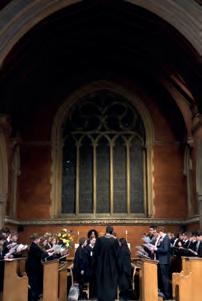


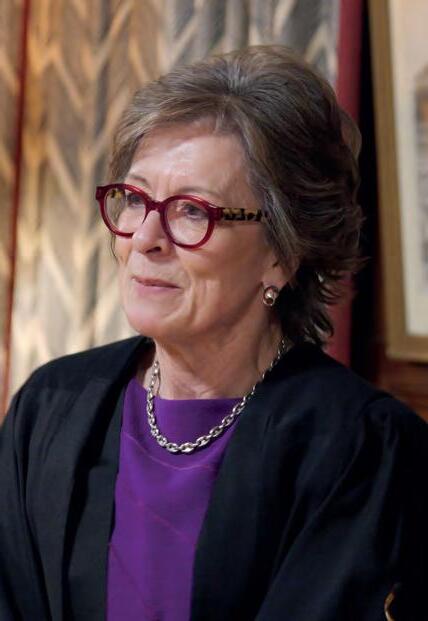




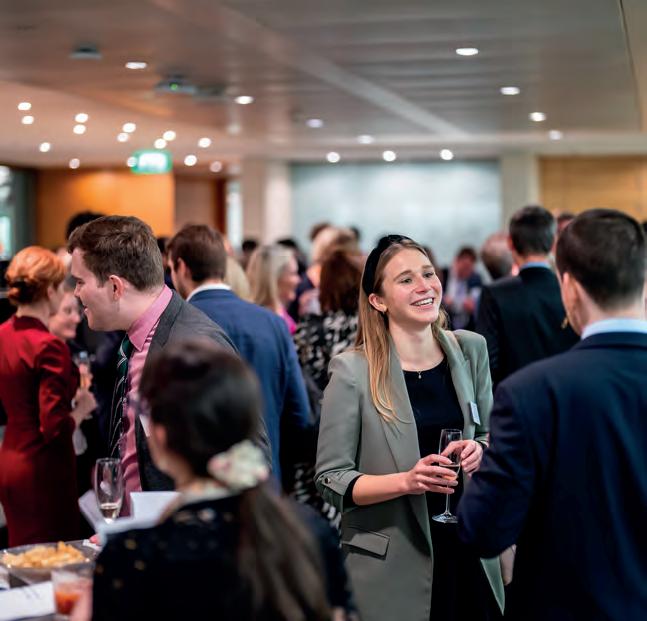

Geographers Assemble! The biennial Geographical Society reunion is an occasion for all Girton Geographers, both past and present. This year the event started with a tour of the Orchard and new Sensory Garden led by Dr Roland Randall, followed by student dissertation talks, an afternoon tea and reflections by Girton alumni on their experiences and the role that Geography has played in their lives. The Beautiful Game Both football and rugby matches were played at this year’s Alumni v Students Sports Fixtures. A bumper number of Old Girtonians turned out for the football, but not enough to halt the current team’s winning streak. The rugby featured current and former members of Pembroke and Girton, where again the current Pirton team triumphed. Ridding Reading Prize This year’s Ridding Reading Prize riffed on the Girton Talks theme of 'A Just World?'. Student competitors tackled ‘I scream, you scream, we all scream for ice cream’, a poem about the experiences of asylum seekers by British–Somali author Momtaza Mehri, and an extract from the 14th century anonymous poem ‘The Owl and the Nightingale’ with gusto. It was a fitting competition at which to launch a new audience prize (won by Gayathri Rajesh) and a new judges' prize (won by Maria Karinatan) in addition to the main prize (won by Joseph Hanlon). City Slickers ② At our 15th annual Law and Finance Reception in London, students joined a networking session beforehand and received career and life advice from a panel of our stellar alumni. Our guest speaker this year was Jaroslava Korpanec (1993 Law) who spoke about navigating her fascinating career path. We are immensely grateful to Guy O’Keefe (1990 Natural Sciences) and Slaughter & May for generously hosting this and previous events. Immersive Bach in Hall ④ The cream of Cambridge’s musicians—the University Chamber Choir and the University Collegium Musicum—alongside members of the Orchestra of the Age of Enlightenment Experience Scheme came together for a performance of Bach’s St John Passion in the round, directed by Professor Margaret Faultless (Bye-Fellow) and Nicholas Mulroy (Musician-in-Residence). School Impact The biggest school visit of the year saw a hundred Year 12 students from across the West Midlands descend on Girton for a day. They enjoyed masterclasses from our world-expert Fellows in Anthropology, Engineering, Medicine and Modern Languages/History, heard talks on university life and the applications process, and toured College with our fabulous Student Ambassadors. Some Enchanted Evening ① College was transformed into a magical kingdom and 873 guests danced the night away during the 2024 Spring Ball. Entertainment included a firebreather, ice rink, indoor mini golf, laser tag, a silent disco, artists, bands, singers and tribute acts, with a special focus on sustainability and accessibility. Girton at the Cambridge Festival ③ Fellow Dr Marta Gentilucci curated the inaugural Electroacoustic Day at the West Road Concert Hall. The day consisted of four concerts: one involving the choirs of Girton and St Catharine’s colleges, another featuring Fellows Professor Margaret Faultless and Dr Martin Ennis. Racing Greens ⑤ In the 78th Gemini Boat Race, Girtonians Hannah Murphy (2023 MPhil in Health, Medicine, and Society) coxed the Women’s Blue Boat to victory against Oxford, while Orlando Morley (2021 History) was in the winning crew for Goldie (the Men's Reserve Boat).

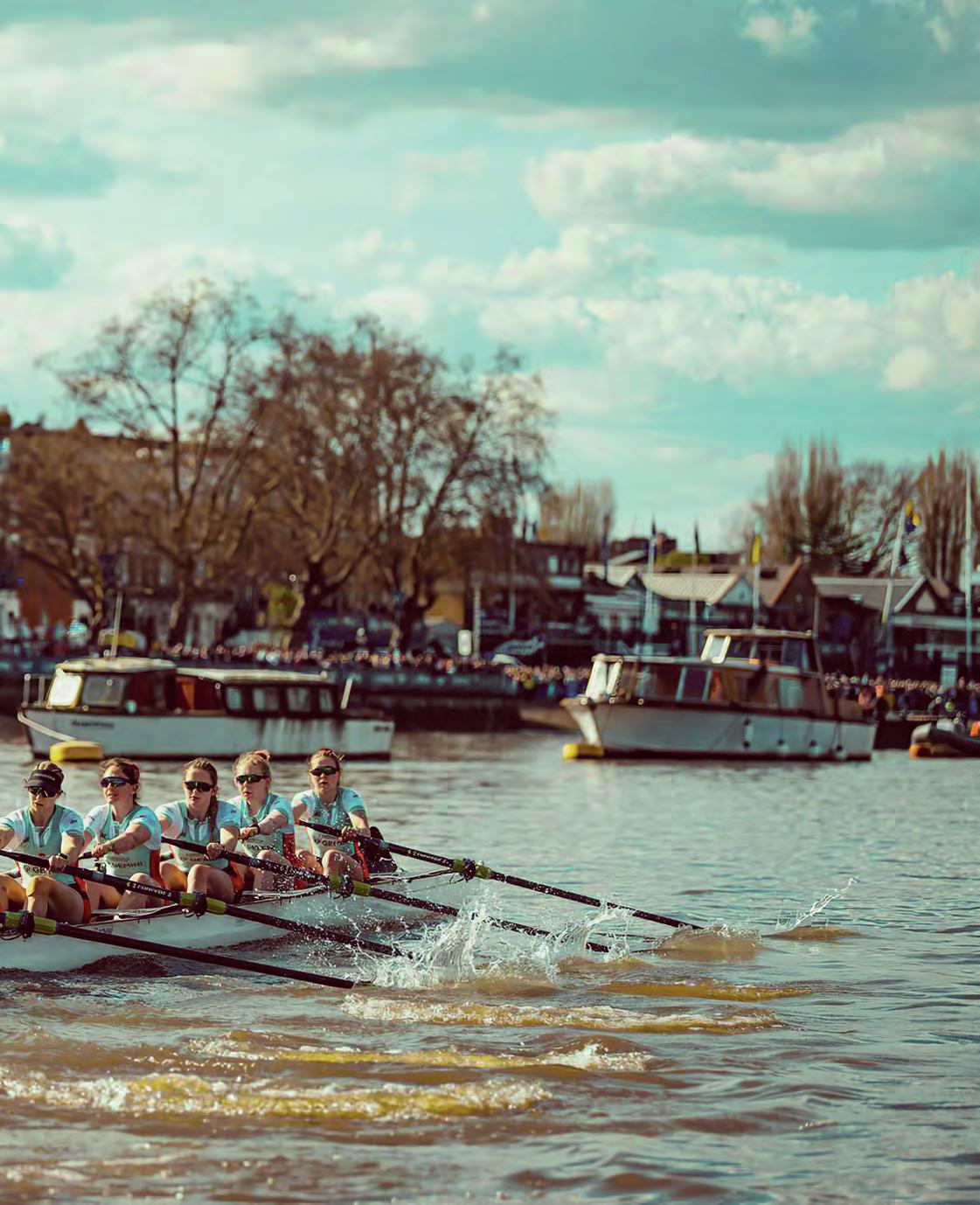
Girton in America ③ The Mistress and Development Manager travelled over the pond to spend time with alumni and supporters of the College in the USA. Events included a fireside chat with the UK Ambassador, alumna and Honorary Fellow Dame Karen Pierce at the British Embassy in Washington DC, an informal BBQ with Gates Scholars also in DC, alumni dinners in Boston and San Francisco, and lectures in New York and San Francisco on the Red Sea conflict. What Lies Beneath ② Fellow Dr Emma Brownlee led a re-exploration of the Roman and Anglo-Saxon burial sites in Emily Davies Court, first discovered in 1881. Archaeology, Classics and ASNC student volunteers worked alongside Fellows and archaeologists to revisit the sites, discovering a Roman brooch, medieval pottery sherds and human bone discarded by the 19th-century excavators. They will be further studied and added to our collections. In the case of the human remains, these will be respectfully preserved. Return of the Masters The MA Dinner this year was particularly special because this cohort’s BA graduation celebrations had been badly impacted by Covid-19 restrictions. It was wonderful to have the Hall filled with graduands and their family members, celebrating at last. Girt’s Bees ①⑤ After months of planning, honey-bees arrived as part of our development of the Sensory Garden and were installed in their smart new hives. A Big Telethon Thank You! Our Telethon raised £268,000 thanks to the generosity of more than 350 donors. This fantastic achievement supports our students during their time at Girton through our Annual Fund. We are grateful to all the 550 alumni who picked up the phone and spoke with our 15 student callers, and to those who donated to this year’s appeal. Top of the Pops
④ The Choir’s latest recording of the works of Marc’Antonio Ingegneri: Music for Holy Week and Easter, recorded in July 2023 and released in March, reached number 8 in the Worldwide Classical Charts. The Pursuit of Excellence The number of awards we can offer postgraduates has increased greatly in recent years thanks to some extraordinary generosity from alumni. In recognition of the support they have received to pursue their studies at Girton, postgraduate students attended a reception to share their thanks and discuss their work personally with donors. Jane Martin Poetry Prize Girton’s national competition for gifted poets aged 18–30 was won by the London writer Luke Dunne for his poem ‘Saltwater’. Second prize went to Neva Ensminger. The prize was founded by the late Professor Sir Laurence Martin in memory of his daughter, Jane Martin, who read Classics at Girton from 1978 to 1981. The judges this year were Abigail Parry and Bohdan Piasecki. Engaging in Difficult Discussions The MCR introduced a new type of event for us this year, as it sought to provide a space to have hard conversations. Our facilitated discussion on the current Israel–Palestine conflict did not pretend to present a solution but helped us all to understand our reality better and listen to each other.
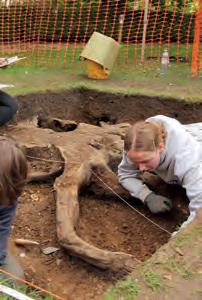







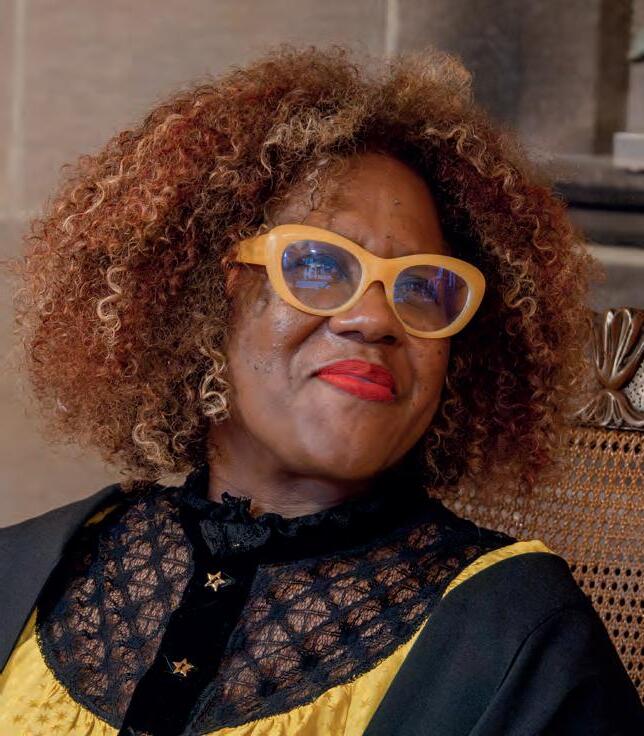
Exam Stressbusting Within the Library, the emphasis in Easter term shifted to stress-busting, with fidget toys and sweets on offer as well as helpful books… plus this year the famous Library doughnuts supplied by our stalwart Catering team came in trays of 80 at a time. The JCR Welfare Officers also held immensely popular ‘Tea and Biscuit Hours’ to provide additional help with revision. Remembering Joan Oates ① Archaeologist and Life Fellow Dr Joan Oates FBA (1928–2023) was an inspiring teacher and colleague. To mark Dr Oates's life, we reflected on her work on ancient Mesopotamia and its impact on the wider world. Singapore Sling While on a visit to Singapore, Vice-Mistress Dr Hilary Marlow met local alumni at a reception held at the Stumps Bar, Singapore Cricket Club. We are extremely grateful to Karen Fawcett (1982 Economics) for her invaluable assistance in supporting this event. MCR Somerville Exchange The highly anticipated second annual postgraduate dinner with our sister college in Oxford was a huge success. The MCR added a talks component this year with speakers from both colleges sharing their research from science to humanities, fiction to non-fiction, and poetry to prose. Errollyn Wallen CBE ② Renowned composer Errollyn Wallen became our 33rd Honorary Fellow. She was the first black woman to have a work featured in the Proms and the first woman to receive an Ivor Novello award for Classical Music for her body of work. Ms Wallen composed music for the opening ceremony of the Paralympic Games 2012, and for Queen Elizabeth II’s Golden and Diamond Jubilees among much else. Girton Paintings at Tate Britain ④ Two works by our co-founder Barbara Bodichon from our art collection were included in the exhibition, ‘Now You See Us: Women Artists in Britain 1520–1920’, which ran from 13 May to 13 October 2024. The College lent her paintings of ‘Chateau Gaillard on the Seine’ and ‘Roman Aqueduct Near Cherchel, Ancient Julia Caesarea’, as well as the portrait of Barbara Bodichon by Mary Emily Osborn. In addition to her many other feminist successes, Bodichon led the campaign for women to be admitted to the Royal Academy Schools. The Girton Canticles The Choir premiered the Girton Canticles by alumnus Tom Williamson (2019 Natural Sciences).
③ Girton achieved Platinum status in the Cambridge Green Impact Awards, the University's environmental accreditation scheme. Première Class Newly composed pieces by Girton students Jacob Robinson (2020 Philosophy) and Daniel Sandell (2022 Music) were performed by the Choir for the first time. Welsh Beauty The College was delighted to receive as a bequest from Mrs Jennifer Schofield (1950 English) ‘Welsh Mountains and Cottages’ by Kyffin Williams RA, the greatest Welsh painter of the 20th century. It has been added to our picture collection and will be on display soon. Mind Your Language In the age of Google Translate and AI is the study of languages dead? The answer from the students, Fellows and alumni guests at our Modern and Medieval Languages Symposium was a resounding Non! The rich and complex knowledge gained from exploring languages – history, politics, cultural identity and diverse perspectives – was on full display and the Mistress shared her own experiences of studying languages, especially Arabic.
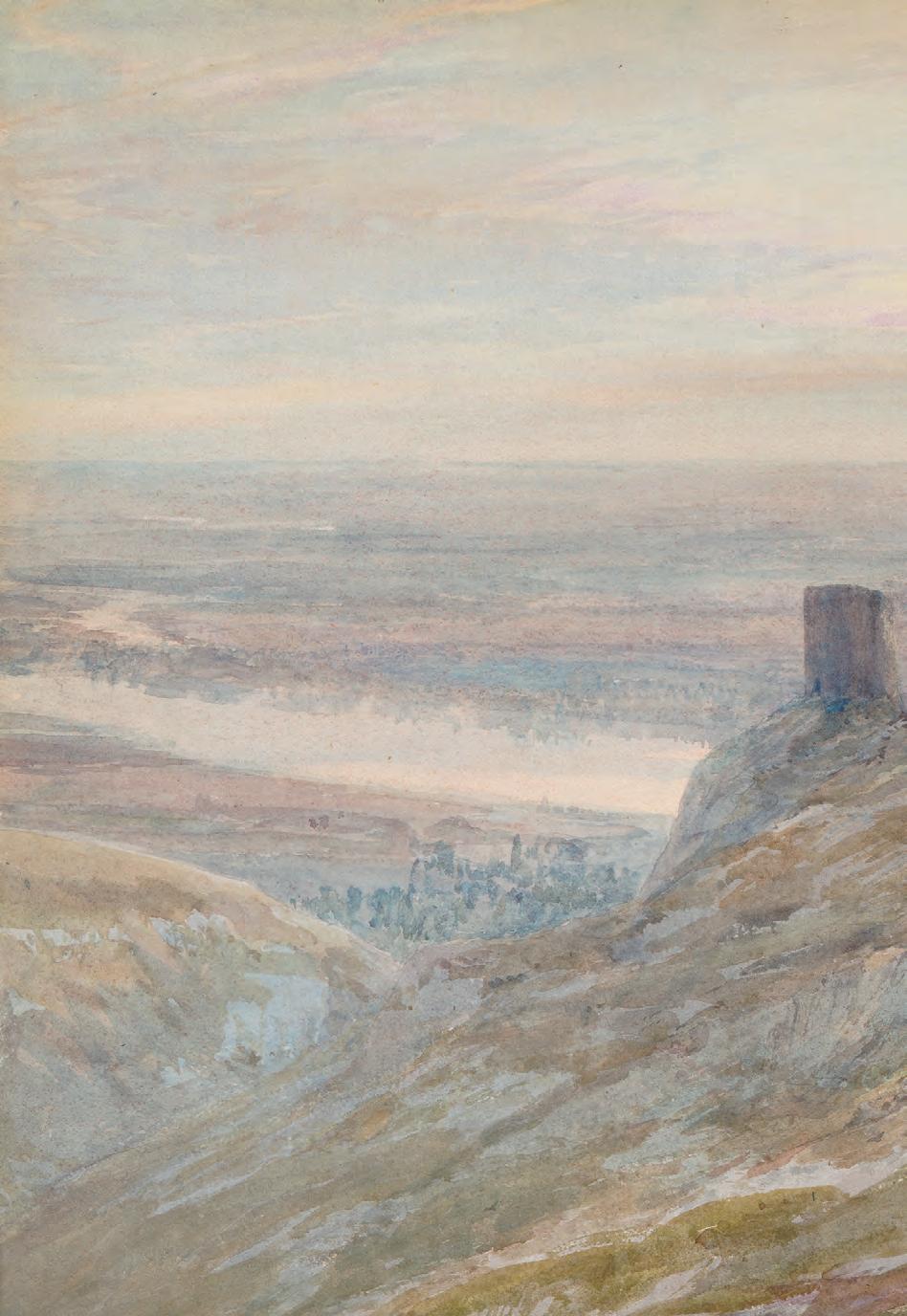

This Sporting Life The sun shone on our second Sports Awards Reception. It was wonderful to host over 40 captains and sports award recipients, representing rowers to runners, cricketers to climbers and many more disciplines besides. Guests heard about the many achievements of our students, and it was a great opportunity to thank the captains and co-ordinators for all their efforts in making such a wide variety of sports possible at Girton. Where the Wild Thyme Blows ① The GADS production of A Midsummer Night’s Dream filled the Fellows’ Garden with delight on a balmy summer evening. Summer Sizzle Charlie Siem (2005 Music), accompanied by Fellow Dr Martin Ennis, gave a thrilling performance of Romantic Favourites for violin and piano at the Fellows’ Summer Guest Night. General Admission ③ This year, 141 graduands received their degrees on Friday 28 June and over 500 family, friends, Fellows and staff celebrated their achievements with them on the day. Congratulations to them all! Annual Benefactors' Garden Party ② Over 150 Girtonians gathered for our annual Benefactors’ Garden Party this year. This is a special occasion held to thank our supporters for their generosity in all its forms: donations, pledging to include Girton in their will and volunteering for the College. Throughout the afternoon we were treated to wonderful music thanks to the Tim Boniface Jazz Band featuring Tara Minton. Guests this year heard from two of our postgraduate students about their research. Jack Naish spoke about how flying lessons have informed his approach to teaching drone swarms to perform aerial manoeuvres through Reinforcement Learning. Crystal Yu spoke about her research on past sea-ice dynamics and how this might inform future climate projections. Finally, Fellow Dr James Riley spoke about his new book Well Beings and how the 70s can teach us about the strange art of being well. A great day at the end of a great year. Thank you for sharing it with us.





In the second part of her personal account of work being undertaken at Girton, former Mistress Professor Dame Marilyn Strathern looks to the future.
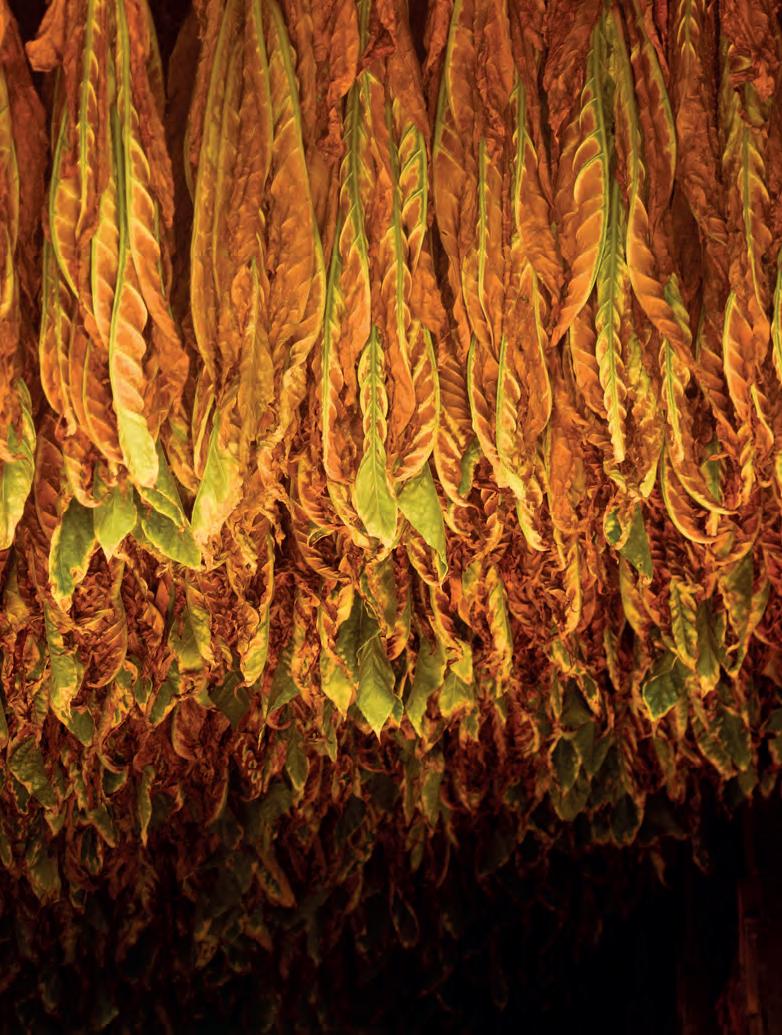
or tomorrow’s people today: that is one way of characterising the ‘Green Girton’ theme of the present issue. We might capture it for this sequel to the article on Girton’s Legacies of Enslavement Working Group (The Year 2022–23) The current question has been how to put in place an infrastructure that will carry forward College’s resolve in Legacies of Enslavement (LE) matters, especially in deepening awareness of the historical sources of its foundation. The initial enquiries were not intended as a tick-box exercise of the moment.
The Working Group itself has since become embedded in College as a standing committee, its new members including among others the Senior Tutor and student representatives. Although this is a personal account, both this year’s and last’s articles have drawn on the work of several of its members, some of whom will recognise their direct words. With a step change in activity, the Legacies of Enslavement Committee (LEC) now oversees the realisation of the Group’s recommendations. Some associated events have already happened, such as the Betty Wood symposium (Michaelmas 2023), at which student interns presented their reflections on what kind of legacy enslavement has left, or the Founders’ Memorial Lecture (Lent 2024), when Professor Olivette Otele, from SOAS, spoke on ‘Europe and America engaging with transatlantic enslavement: memories, legacies and restorative justice’. However, many of LEC’s responses are oriented towards the longer term, with a view to creating the basis for interest and activity yet to come.
Two major areas are in focus here. One is public-facing: setting up the Research Hub, along with the task of transforming materials already amassed into an accessible resource for open scholarly use, whether by students, Fellows or visiting researchers. It will require internal effort on Girton’s part to make them into such a resource. The other attends to College’s internal plans for memorialisation but, as we shall see, will in fact reach beyond Girton. It envisages a wider university constituency, and – bringing in people from much further afield – what we might think of as an expanded community. Both areas will take our aspirations into the future.
The reason for this double focus is the unexpected impetus given to the LEC by two Life Fellows and their very generous donations to College. Given the initial attention our enquiries paid to monetary gifts (research is ongoing into the period 1869–1929), they have afforded a timely turn to our fortunes. While College’s own investment has underwritten basic activities, these gifts have shaped two specific ventures.
The first has come from a former member of the Working Group, Dr Alastair Reid, a historian of modern labour movements. Presciently, his funding is in the main for the initial appointment of an archivist who will, within the new Research Hub, create a repository with a view to facilitating general access to LE materials. It has also made funds immediately available for maintaining


An unexpected impetus was given to the LEC by two Life Fellows and their generous donationsAlastair Reid in memory of Jean Reid and Juliet Dusinberre in memory of William Dusinberre
the small stream of research undertaken by the LEC. The gift is presented in memory of Alastair’s mother, Jean, herself with no other connection to Girton, but (in Alastair’s words) an instinctive feminist who was proud of her academic son’s position at College.
Dr Juliet Dusinberre’s gift is made in memory of her late husband, William Dusinberre. Her own discipline is English; he was a renowned historian of enslavement, writing about several states of the USA, including Virginia. The donation enables Girton to establish an annual essay prize to recognise student research addressing conditions of slavery; it may include coursework prepared for examination, and will be open to all current students of the University. The prize will carry William’s name to begin with, but it may be that Juliet’s gift becomes the first sponsorship of a ‘new’ name to represent the Virginian enslaved – those who were at the source of a no longer existing award once known as the Gamble Prize.
Both donations have led to further action on the Committee’s part. Let me round out the aspirations we have of the emerging infrastructure: institution-building in the first case and tentative explorations in the second.
A tiny set of documents in Girton’s archives, particularly a letter to Jane Catherine Gamble from one Robert Leslie, was the link that took us to the discovery of 60 years of business records. These concern the cousin and business associate who was an executor of Mr and Mrs James Dunlop’s wills: James and Nancy Dunlop were the uncle and aunt from whom the substance of Gamble’s inheritance eventually came. Not only do the records contain countless references to Roslin Plantation, where Jane’s mother grew up, but also revealed are the family’s interests in cotton, rice, and then predominantly tobacco, as part of a much wider network of mercantile ventures. The Leslie papers offer, among other things, research prospects for anyone interested in the traffic between Scottish migrants to the USA, Virginian enslavement and fortunes made in Glasgow, London and Richmond/Petersburg VA. The holding library is helping facilitate LEC’s digitisation of some 23 linear feet of these papers, to which Girton can subsequently grant access. That library will be given digital copies, and copies of any transcription we do.
From digitisation to transcription: keeping alive a research interest in LE matters will also result in resources that can be generally shared. In the repository to be formed within the Research Hub, these papers will join materials covering many aspects of the LE enquiries. They include the record of our initial steps in ascertaining the extent to which Girton gained from the proceeds of enslavement, a picture to be augmented over the years as a more comprehensive view develops. At the same time, like the Leslie papers, the materials themselves invite interest in topics beyond the LEC’s own remit, an opening into a future of possibilities. With an eye to the long term, a College Officer has been appointed to oversee

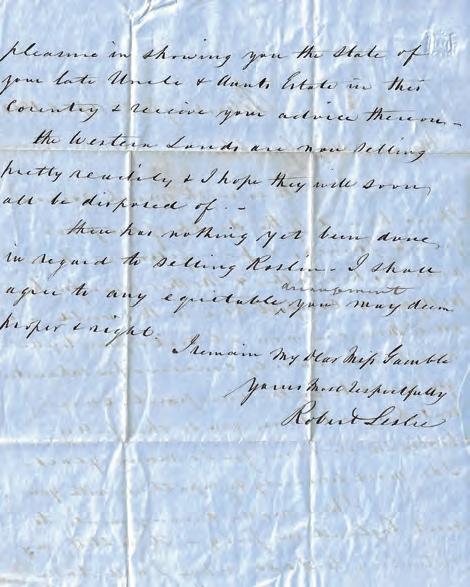
the Research Hub at large, and guide its future initiatives. The initial systematising and curating work of the Repository Archivist, funded by Dr Reid’s gift, will create a user-friendly resource for general consultation and a template for future accessions.
College has also designated a Research Associate post to attend to another side of its memorialisation endeavours, the creation of a collections and artefacts catalogue (‘log’). The issue is how and where to make our known connections public. As far as Gamble is concerned, you can now find further information on the wall beside the fireplace where her name is inscribed. However, plaques will not be the norm. Instead, supplementary details on certain names associated with diverse aspects of College’s architecture, its collections of art or furniture, or other benefactions, will be brought together in the publicly available catalogue. The intention is that it will both encompass all kinds of items and allow them to be put into context, for instance, as to how direct or indirect the connections to practices of enslavement turn out to be. Once established, the log can grow in increments as knowledge grows.
Entries for what will initially be known as the William Dusinberre Prize may address any aspect of the legacies and practices of enslavement, historical or contemporary. We are hoping to engage with diverse departments in the University of Cambridge, especially from the School of Humanities and Social Sciences, which is currently coordinating the University’s LE activities.
The prize has given LEC the direction it needed to follow through quite another aspect of College’s interest in names. William Dusinberre’s formidable historical work was oriented towards the circumstances of individuals and especially of women. The records we already have relating to Roslin Plantation yield – over a fifty-year period – more than 80 names of enslaved men, women and children. While not eclipsing College’s own knowledge of the person in whose memory the prize is funded, it would be an act of extended, public-facing memorialisation for College to draw on the Roslin names in giving this award its final designation. There is of course nothing straightforward about a name, especially when plantation record-keeping only put a first name, didn’t identify relatives, or entered made-up sobriquets. But a different order of consideration also enters in: before such names belong to College, they belong to others, notably the descendants of those known by them.
By the time The Year is published, we could have gained some sense of what views people in the former Roslin area not far from Richmond VA (the plantation no longer exists) might hold on College’s commemorative efforts; they might wish to see other forms of memorialisation. Knowing that there are local historical associations interested in tracing ancestors, LEC is supporting a short visit to Richmond by its present Researcher.

The location of Roslin Plantation (no longer standing), north of Petersburg, Virginia. Petersburg was once a thriving entrepot for tobacco and other plantation-produced goods destined for export elsewhere in the United States and across the Atlantic, Roslin being one of many plantations in the area.
This visit will be of a thoroughly exploratory nature, but the aspiration is to lay a foundation in personal relations that will enable some form of future collaboration. As significant as the knowledge that Girton gains is also the knowledge that it can share.
Every horizon of enquiry opens new vistas. It is very tempting for those working on the historical materials that have so enlarged our view of College’s place in the world to go further. Although, for instance, it was right to highlight prominent Girton women in the initial enquiries, the extent of men’s early support remains unexplored. Wider horizons also call. The Atlantic Slave Trade was part of British imperial endeavours elsewhere, as manifest in the East India Company, while no investigation of the plantation economy in the US can ignore the dispossession of indigenous peoples –important concerns nudged into view precisely by the original terms of enquiry set by the College Council.
We don’t have to plead the abominations of transatlantic enslavement as a special case in order to suggest that the LEC continue to take it as a focus: the point is that we know some of the specific connections it generated that contributed to Girton’s foundational funding.

And we do not at this stage need to know all the connections in order to recognise our accountability in the case of some: they speak loudly enough as a motive to create the means of keeping the issues in mind. What is important at this stage is to put in place the infrastructure that will both enable future research possibilities and give us the confidence to reach out to other publics with what we already have. While, as far as Girton’s early history is concerned, the Committee can see many research areas still a bit of a blank, it is now in a position to suggest what in the short term is needed to satisfy the conditions of accountability and what in the longer term to encourage by way of interests and enquiries still to take shape.
For tomorrow’s people today. By leaving the future open in this way, we do not circumscribe the constituencies of potential interest – students and scholars yet to be part of Girton’s community, and others further afield, in this country or overseas. But first, and for a little time ahead, we need to build a practical springboard for that future.
‘The earth is the Lord’s and all that is in it’ (Ps 24:1)

Vice-Mistress Dr Hilary Marlow, who is also Canon Environmentalist of St Albans Cathedral, looks at the discipline of Ecotheology and the ethics of environmental responsibility as expressed in the Hebrew Bible.

‘What has religion to do with the environment?’ This is the question that has undergirded much of my research over the past 20 years. My interest in ecology began in the 1980s through my involvement in a small UK environmental charity, called Arocha (www.arocha.org), that focused on biodiversity conservation. Then, in the year 2000, the chance to fulfil a long-held ambition by studying for a second undergraduate degree in Biblical Studies introduced me to the fascinating world of ancient religious texts, especially those of the Hebrew Bible which is set in the context of people living close to, and reliant on, the natural world. I started to investigate how biblical authors and their ancient readers understood their own relationship to nature and how this informed their theocentric worldview. My PhD at Cambridge was an opportunity to weave together my interests in biodiversity conservation and in the Hebrew Bible, and was published as Biblical Prophets and Contemporary Environmental Ethics (OUP, 2009). Since then, I’ve continued to research and write on the relationship between humans and nature in these ancient texts and have lectured at home and abroad to a wide range of audiences – secular and religious, academic and non-specialist. Increasingly many people I meet have a deep concern, even anxiety, about what is happening to and in the physical world. Practical solutions and the global political will to enact them seem to fall far short of what is needed. This has especially been true in my trips to places such as Kenya or Central America where the effects of climate change and habitat destruction are much more keenly felt, for example by subsistence farmers. Alongside this practical concern I’ve discovered a profound interest from many people in what religion might have to say to contemporary environmental issues.
So isn’t religion the cause of the problem? In 1967, just a few years after Rachel Carson’s Silent Spring first drew attention to environmental pollution in the USA, historian of science Lynn White Jr. published a seminal article arguing that the western Christian tradition was to blame for the worsening environmental crisis (Science, 155/3767). His article provoked a strong reaction: for some scientists it confirmed their hostility to religion, and his views continue to surface in discussions of the reasons for our present predicament. There was also a swift push-back from Christian theologians who maintained that White’s analysis took no account of the richness of theological traditions that highly valued nature as God’s handiwork. In reality, a complex array of social, political and economic factors has brought us to where we are, including industrialisation, colonial practices, economic growth models, global population growth and many others. One thing that stands out in recent discourse is an increasing awareness among environmentalists that values and beliefs are important drivers of actions and behaviour, as well as statistics and data. This comes alongside a de-centring of the scientific enterprise from its dominance by white, western (and often male) scientists into a global community. Many parts of the world, especially those designated as biodiversity hotspots, are strongly religious: trying to bring change without engaging these communities’ religious beliefs and practices is doomed to frustration, as secular environmentalists have often discovered This brings me back to my own research, which seeks to frame an ethic of environmental responsibility and action for religious communities by drawing on biblical texts and theological reflection. But, you might ask, what
about those of us for whom the Bible is not sacred scripture? Does it have anything to contribute to the conversation and how might it challenge secular worldviews? In response, I’d draw your attention to the field of ecocriticism in literary studies, which for the past 40 years has explored the relationship between human beings and the non-human. Initially focused on nature writers such as Thoreau, and on the re-enchantment of nature by the Romantics, ecocriticism now includes a wide range of texts in its remit, including Shakespeare, Chaucer and even classical texts such as Plato’s Republic
For many of its proponents, ecocriticism entails critical analysis of the term ‘human’, and implicitly and often explicitly includes a challenge to contemporary culture and ethics. It is in this context, then, that the texts of the Hebrew Bible might have relevance beyond their religious readers. Just one example is Psalm 104, often called ‘the ecologist’s psalm’. In this beautiful poem the wonder of the physical world is celebrated, including the diversity of life on earth (and in the sea). The psalm describes the habitats and life-cycles of different animals and birds, with human beings as just one species among many. Like other creatures, humans are made from dust and will return to it, a reminder of human transience and mortality that de-centres us from any presumption of superiority over the non-human. It finishes with an impassioned plea for the end of evil in the world, prompting us to take seriously our moral responsibility to speak truth to power. For contemporary readers that certainly includes the imperative of confronting our leaders with the reality of climate change and the devastation wreaked by humans on the natural environment.
Dr Emily Cockayne (1991 History), Associate Professor of Cultural History at the University of East Anglia, lifts the lid on the history of recycling.
In many ways I started to do the hard thinking for my third book, Rummage: A History of the Things We Have Reused, Recycled and Refused to Let Go (Profile Books, 2020) while I was a first-year undergraduate at Girton in the early 1990s. Living in College, managing a tight budget, I eked out my meagre student grant by buying second-hand clothes from Cambridge market and zigzagging down Burleigh Street, going from one charity shop to the next.
My maternal grandmother – ‘Nan’ – died in 1992, at the start of my first Easter Term. I returned to College from her funeral with her striped brown and orange cardigan made from several older items unravelled and reworked. I lengthened the arms using the spare bits of yarn that Nan had carefully saved. Nan taught me to knit, and also to patchwork. I had started my first quilt, aged eight, under her supervision, and worked away on it in Girton. I learned much from Nan, and Rummage is full of her hoarding spirit. Nan was 16 when the Second World War started and was a married young mother at its end. In those formative years of household management, she took to national salvage with aplomb. She saved and mended for the rest of her life. Nan was from Birmingham, which had been an exemplary salvaging city during the Great War. Her own mother had imbibed some of the recycling vibe in that city and passed this on. In my first term, Nan wrote to me on her usual stationery – paper chocolate bar wrappers kept flat, ready

for use, under the cushion of her armchair. In every age, complicated but everyday judgements are made about the usability of things: what to keep and what to discard. The relative value of leftovers constantly changes, influenced by the hopes, expectations and needs of human communities, whether we are looking at the stories, people or objects to carry from the past into the present.
Rummage concerns recycling, reuse, and material transformations in British society.
Whilst an undergraduate I started developing ways of researching that eventually knitted together into my historical approach and methodology. Like all of my books, it highlights the lives and endeavours of historical ‘nobodies’: people who might be forgotten if their lives were not uncovered in the archives.
History was once the study of the victorious. In the world of objects, antique furniture and paintings by the masters were victors of a kind; they gained value and became more cherished. Rummage shows how the vanquished and the forgotten have a value of their own. The history of the reused is a history of extraordinary reinvention by ordinary men and women, like Fritz Vietor, a German who gussied up simple pianos using bois durci, a plastic made from moulded blood and sawdust that looked like carved hard wood; Matthias Koops, who first recycled deinked wastepaper in 1800; and Clara Matéaux, who wrote for a juvenile audience about the potential for material reuse.
I followed a quirky chronology, starting with our current age—with all the washed-up, reused remnants of the past—going back to the late-medieval period through the sediments of time, picking through ever more distant
episodes and showing how people extended the lives of their things. There is a tipping point at which stuff becomes simply and stubbornly worthless – unusable rubbish. Rummage tells the story of the stuff that was saved, not dumped: the ‘unwasted’. By working backwards, down through the deposits and layers of culture, I unearthed forgotten recycling practices, standing many basic historical assumptions on their head. I became fascinated with various inconsistencies, particularly the British tendency to recycle small items like milk bottle tops, dog hairs, and razor blades, often as a means of assuaging guilt rather than making any significant lifestyle changes. I examined greenwashing in the 1970s, particularly related to bottle banks, which had minimal environmental impact and diverted energies from more effective reuse efforts, such as deposit-back bottle schemes.
Rummage exposes human ingenuity and adaptation in the face of changing environmental landscapes, introducing readers to various forgotten substances, including Kamptulicon and Boulinikon: innovative flooring products made from waste cork, rubber and animal wastes that prefigured linoleum (also made from wastes). Synthetic plastics were also crafted from waste by experimental Victorians, who gave their products names like Xylonite, Ivoride, Bonzoline and Parkesine, using up wastes like cotton, milk and coal tar (a by-product of coal gasification) in their creation. I traced their development from older industries, like papier-mâché making.
I finished my first patchwork quilt in Wolfson Court in my final year and immediately I started a new one – a bright log cabin design. That quilt (finished while I worked on my PhD) contains scraps of clothes from those Cambridge second-hand market stall purchases. It serves as a fabric archive – I wrap myself in my own material memories.
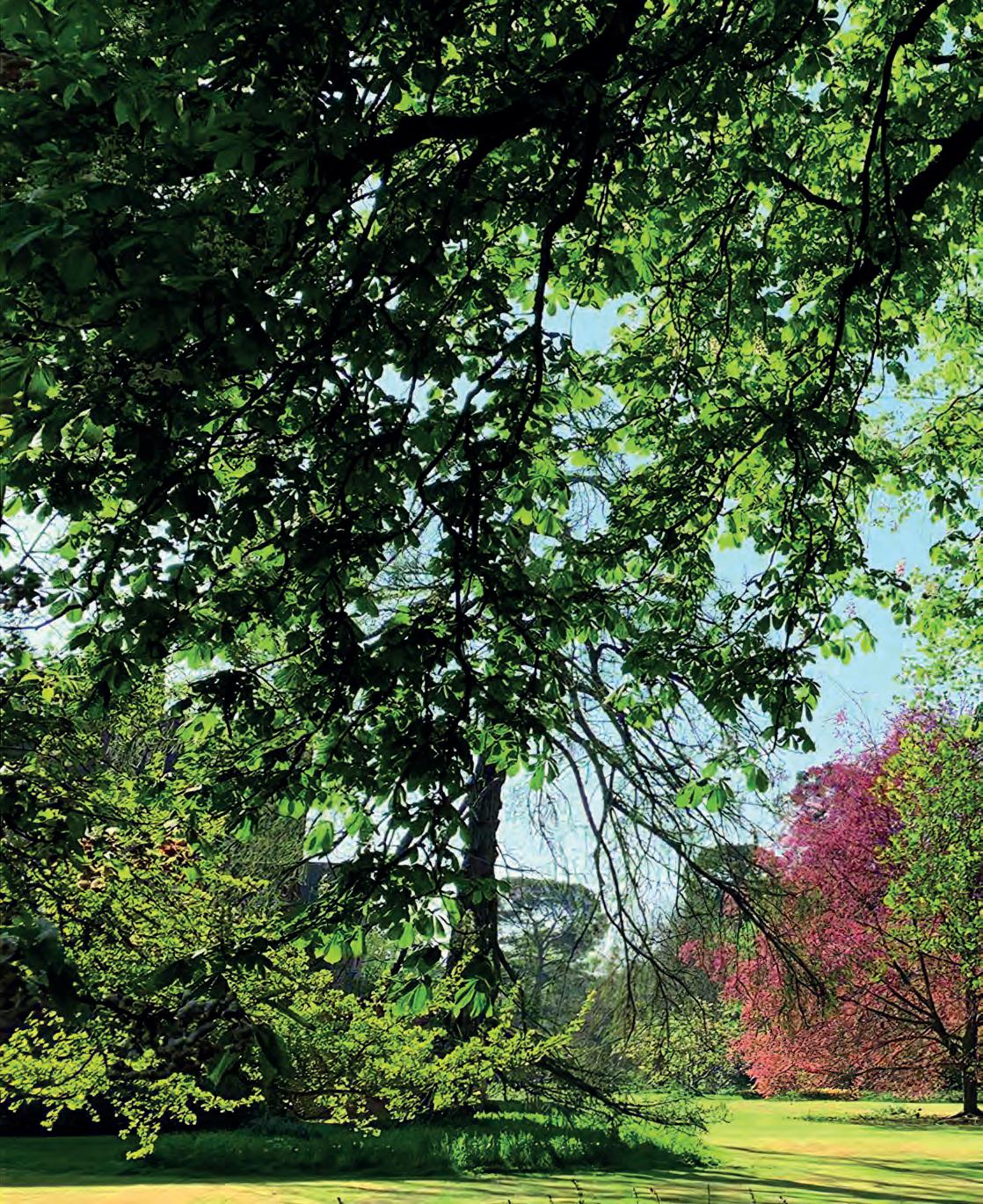

Deji Olaniyi-Maxwell considers the link between green spaces and mental health, and how the gardens and grounds at Girton are more than just a backdrop to our academic pursuits. They are a vital resource that supports the mental and physical wellbeing of our whole community.
As the Head of Welfare and Wellbeing at Girton College I have the distinct privilege of living on-site, giving me a front-row seat to the stunning natural beauty that surrounds us. Our College is uniquely blessed with over 50 acres of gardens and grounds—an enviable expanse compared to other Cambridge colleges. They are more than just picturesque: they are a sanctuary for relaxation, socialisation and mental rejuvenation. Numerous studies have established a clear link between access to green spaces and improved mental health. Nature has an incredible ability to reduce stress, anxiety and depression, while boosting mood and cognitive function. At Girton, our expansive gardens and grounds offer the perfect setting for these benefits. Whether it's a solitary stroll through the fractals of our woodlands or a leisurely afternoon in the Honeysuckle Walk, our campus provides a welcome escape from academic pressures. Our grounds are designed to support relaxation and reflection, essential components of mental wellbeing. The formal gardens of the College courts, the open parkland and the historic orchard each offer unique experiences. The pond, initially created to supply water for the College fire brigade, has evolved into a serene habitat for wildlife and a tranquil spot for contemplation. The Fellows’ Garden, the creation of world-renowned garden designer and
alumna Penelope Hobhouse, provides a secluded area for quiet reflection and mental rejuvenation. Additionally, our developing Sensory Garden can offer a calming environment for neurodivergent students, featuring plants and landscaping that engage all the senses.
Green spaces play a critical role in promoting social interaction, which is vital for mental health too. Girton's gardens and grounds are popular venues for socialising, whether through organised events or spontaneous gatherings. The extensive lawns and open spaces provide ample opportunities for picnics, impromptu games, and relaxed conversations, fostering a sense of community and belonging. The guided garden walks organised each term are particularly popular, offering a chance for everyone in the community to connect with nature and each other. Physical activity is another important factor in mental wellbeing, and Girton's outdoor facilities are some of the best in Cambridge. They accommodate a variety of sports and recreational activities, from running and cycling to team sports like football and rugby. Exercising in such a beautiful natural setting not only promotes physical health but also boosts mental health by releasing endorphins and reducing stress.
This Easter Term we piloted a student gardening programme through the Girton Skills Programme, giving students the opportunity to work alongside our dedicated Gardens team. The initiative allowed students to contribute to the maintenance and beauty of our surroundings while gaining hands-on experience and a deeper connection to nature. Engaging in gardening has been shown to reduce stress and improve mental health, making this programme a valuable addition to our wellness initiatives. We look forward to growing
our gardening volunteering opportunities in the coming year, further integrating our community with the natural beauty that surrounds us.
None of this would be possible without the dedication and expertise of our fantastic teams of outdoor staff. Their hard work ensures that our gardens and grounds are not only beautiful and functional but also thriving ecosystems that support good health. By providing space for relaxation, reflection, social interaction, and physical activity, our green spaces enhance the quality of life for everyone at Girton. When we nurture and develop these areas, we are reaffirming our commitment to the welfare and wellbeing of all in our College community. So, I encourage everyone, whether resident or visitor, to take the time to appreciate and utilise these wonderful green spaces, recognising their invaluable contribution to our overall happiness.

Girton PhD student Dami Folayan (2020 Education) explains why she is developing a sustainable alternative to textured hair extensions, supported by a 2024 Innovate UK Award.
Growing up in a Birmingham suburb as a Black British girl left me extremely limited in choice when it came to hairstyling. One of my earliest hair memories was begging my mum to take me to the local hairdresser, only to be greeted by glares of confusion upon entry. I could see the disappointment in my mother’s face, and it suddenly dawned on me that her refusal to take me to the hairdresser was an act of love and not deprivation. I overheard the stylist tell my mother that they did not ‘cater to my kind of hair.’
Suddenly, I recognised my difference. Everyone in the room had straight hair and white skin. The stylists had not been trained in how to work with my hair type. It became clear to me that my only hairstyling choice was to continue getting my hair done by my mother or enter into the often unregulated and sometimes insanitary informal hair economy. Many girls and women with textured hair have stories similar to mine. We struggle to find salons catering to our needs, extensions, and hair care products.
Often, where we are able to get hold of hair extensions, we are forced to choose between human hair, which has a very high average price of £300 per kilogram, and much cheaper plastic-based hair extensions, which retail at about £8 per kilogram, but are often coated in toxins that cause irritation and sometimes even hair loss. Given
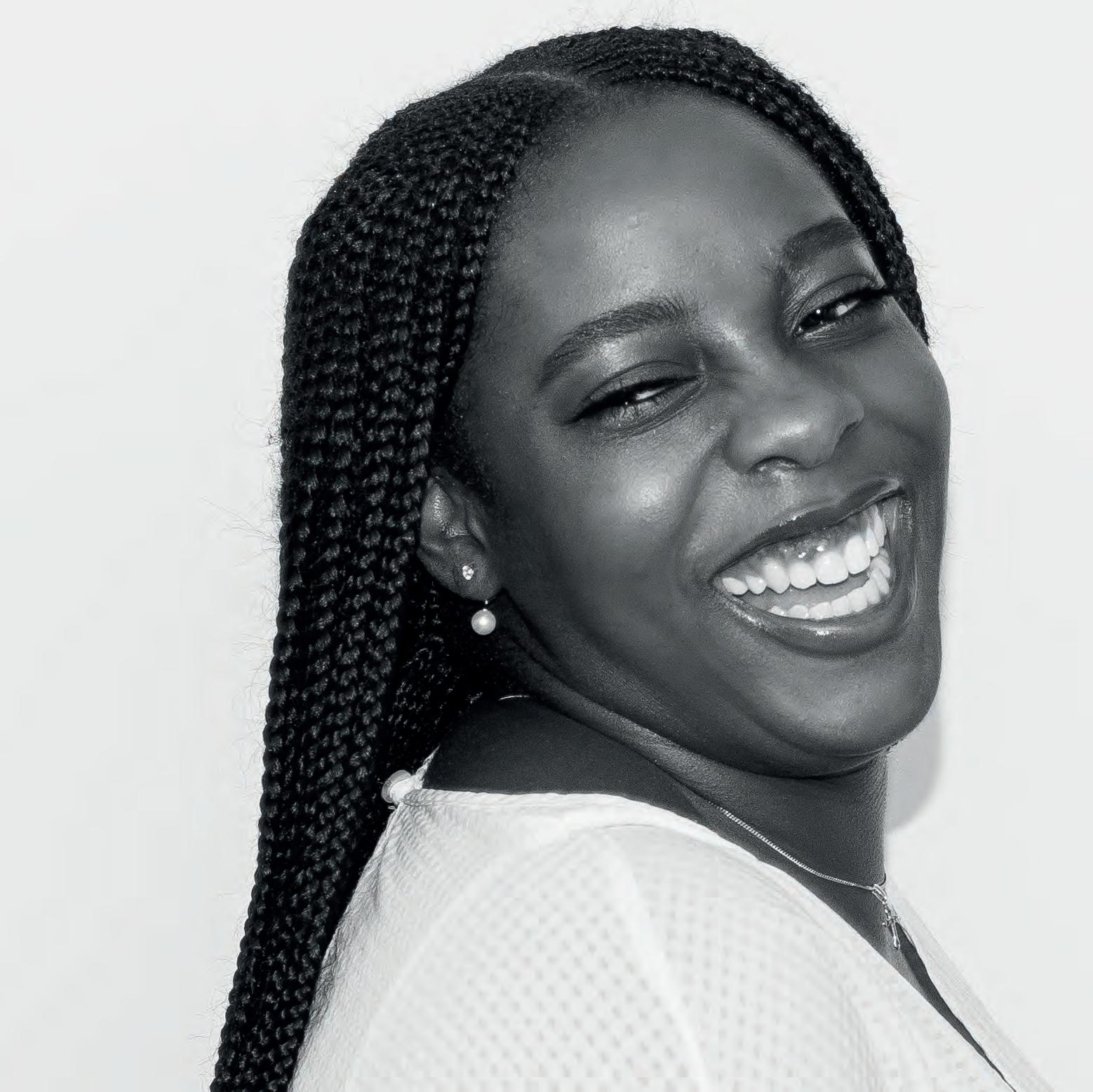
those differentials, most women with textured hair opt for plastic-based extensions, which can contaminate waterways during use and pile up in landfills at the end of the product lifecycle.
I recently received funding from Innovate UK to combat this major market and environmental challenge. My idea, which I am working on through my sponsor organisation, Niyo Group, entails creating plant-based hair extensions using biodegradable fibres. I am grateful to be among the 233 high-potential innovators across the country who have been awarded a grant by Innovate UK, and I look forward to developing my idea and nurturing it into a marketable product.
Plastic extensions can take between 50 and 500 years to decompose. Given that the textured hair extension industry grossed $5.7BN in 2020, there is a very large yet untapped market for plant-based extensions that nourish hair and do not contribute to pollution. I hope that by developing an alternative hair extension fibre, we will be able to eradicate plastic-based extensions from the textured hairstyling markets and prepare the industry for increased restrictions around plastic use.


In 2024, Girton won a Cambridge University Green Impact Platinum Award, the University’s highest accolade for environmental excellence. Our gardens, maintenance and catering teams were a large part of that success, working together to build sustainability across our operations.
At the front of College, Cloister Court has been transformed during the year. It was permanently closed to car parking in the autumn (apart from three blue badge spaces) and is now a beautiful and vibrant external living space, welcoming visitors and residents to Girton as they enter under the Tower. The dense and spiky evergreen bushes around the perimeter have been removed and the lawn extended. A colourful herbaceous planting scheme has been introduced, and a new lighting scheme installed. The dark tarmac has been replaced with a lighter bonded gravel surface to lift the space and a new terrace for daytime relaxation and evening entertainment has been constructed on the north-west side, outside the Social Hub. We have named it after Frank Wilkinson (1934-2021), our legendary Economics fellow, at the suggestion of a generous donor.
Honey-bees arrived at Girton in 2024. Two colonies are now housed in hives within an expanded wildflower area of the Sensory Garden. They are protected from badgers and other predators within a hand-made hazel hurdle compound and four Fellows, one gardener and a PhD student have become trained apiarists to look after them. The bees have rapidly settled in to their new home and have been buzzily exploring the Fellows’ Garden and the pond. They also love the wildflower and drought–proof plantings of the Sensory Garden, where one of the stars of our maintenance team, Wojciech Kolpak, has built a bench made from reused clay roof tiles from Wolfson Court, and also repurposed an old iron well pump into an ornamental feature to provide cool air in the Mediterranean space and the deliciously relaxing sound of running water.
Meanwhile, in the kitchens, Sous Chef Jamie Burton took part in Veganuary 2024, which meant eating no
animal products for a month. ‘Many of our students, Fellows, staff and guests now choose meat-free options at meals. The main reason I wanted to eat vegan for a month was to get an insight into the lifestyle and to give more time and attention to plant-based food in the kitchens. It has become part of everyday life in the catering industry and we have a responsibility for food sustainability. I really enjoyed being creative by experimenting with texture and flavour and I saw the health benefits. I’ll definitely continue to eat more vegan and vegetarian meals to balance my own diet and put my experiences to good use in developing our plant-based menus at Girton.’
Seasonal produce is widely used by the team, and our pastry chef Sylwia Waluszek focuses on using as much Girton-grown fruit and herbs as possible. The


catering team also gets through thousands of glass jars a year. Thanks to an initiative from Jamie these are now offered to College members to reuse, helping to reduce waste and encourage upcycling. The establishment of new cut-flower beds in the gardens also means that throughout the year floral displays for dinners and special events around College are gathered from our own grounds and arranged on-site. So, there’s now the prospect that Girton honey will soon be featuring on our menus and spare glass jars are already reused for table decorations.
Until last year, all green waste including any wood generated from annual tree works was removed for processing off-site. But we’ve now built a large capacity compost compound and no garden green waste has left the College since August 2023. This spring, our first batch
of compost was dug into the new herbaceous border in Cloister Court prior to its planting.
‘As well as composting all the garden green waste and some kitchen waste, we now also keep all the arisings (debris from tree works) on-site,’ explains Head Gardener Julia Andersson. ‘Where possible, tree trunks and larger logs have been left in situ for the benefit of invertebrates and other wildlife. Brush gets chipped and mixed into our compost or used on woodland paths. When choosing replacement trees for the woodland perimeter it is not always possible to choose native species, but we favour drought-resistant ones that bear fruit or nuts to support the College's wildlife. Overall, our aim is to provide flowers for pollinators and fruit for birds and mammals for as much of the year as possible.’
Finally, we often support Girton village in its green ventures. This year, our brilliant maintenance team helped with a parish project to refurbish the derelict and vandalised phone box on the corner of Girton Road by the College’s side gate. Wojciech reglazed it and made some custom-built shelving, which fitted like a glove. Then our painter and decorator Wayne Ardley gave it a fresh new livery and it was transformed into the ‘Girton Community Library’ for our neighbours’ pre-loved books. We have many other projects to reuse, recycle and repurpose under way. Perhaps some of these ideas will inspire you in your own green ventures?
Events and campaigns are always on our programme. They include those with a focus on welfare, while others target sustainability and ethical affairs.
In Michaelmas Term, we held an indoor plant sale that got more students engaged with the Green Society, tapping into the massive trend for house plant cultivation among our generation. Near the end of the term, there was the University–wide ‘Twelve Days of Bridgemas’ foodbank drive in aid of the Cambridge City branch. The Green Society played a huge role in encouraging donations and sorting them, ultimately leading to Girton students, staff and Fellows donating an incredible 287 items, putting us in second place in the inter-Collegiate league table (beaten only by Clare College).
At the start of Lent Term, we held a plant-repotting and bulb-planting session emphasising mindfulness, welfare and wellbeing. Meanwhile, at the end of term there was the Green Formal, alongside an accompanying talk on sustainability and food security. This included a panel of enlightening speakers including Anna Taylor OBE, Executive Director of the Food Foundation, and was part of the Girton Talks programme. Linking with the issues covered, the Green Formal after the talk boasted a plant-based sustainable menu that was designed in Girton’s Green Society is a vibrant and active part of the College and University community. Its President, Charlie Owen (2023 Natural Sciences), looks back at highlights of the last year.
collaboration with the catering team and was directly based on suggestions from current students. It was delicious.
As Green Society President, I want to collaborate more closely with our other student societies and JCR officers on issues of sustainability in the next year, alongside the range of welfare-focused events that have already been popular in College. I also want to concentrate more on ethical affairs and charitable events, whilst also maintaining enthusiasm for the important campaigns which have been so successful in the past.

Swarbreck, Janet Harker Fellow
in Biological Sciences, explains how her research at NIAB—a crop science organisation in Cambridge—is helping farmers to embrace regenerative agriculture.

The changes in our climate are now perceptible to most people and especially to farmers, many of whom struggled to drill their crops last autumn. Since the Industrial Revolution our reliance on fossil fuel for energy has led to the increase in atmospheric CO 2 concentration, but agriculture also has an impact on the major threats to humanity. Farmers are under enormous pressure to produce sufficient food for a growing population with higher expectations of a protein–rich diet, while at the same being expected to reduce the impact of their activities on the environment. In response to these pressures, many farmers are moving away from so-called conventional farming practices and adopting regenerative ones. Here’s where crop science research can help.
Conventional practices have evolved over the last 100 years or so and rely on the use of larger, heavier machinery to prepare the soil for drilling: in particular, high-disturbance cultivation such as the plough. This practice, while
efficient in removing weeds, can be damaging to soil structure. In addition, farmers have relied heavily on chemical solutions to counter the emergence of pathogens and enhance the provision of nutrients in order to greatly increase crop yields. The Haber-Bosch process, invented in the early 20th century, of fixing dinitrogen (N2) from the atmosphere to generate ammonium nitrate which can be applied to the field and is directly used by plants, helped to solve a major agricultural challenge: namely, the lack of sufficient nitrogen for plant growth. However, this process releases huge amounts of carbon in the atmosphere during its production, and can lead to nitrogen leaching into aquatic ecosystems as well as increasing emissions of greenhouse gases. While practices such as these, developed during the ‘Green Revolution’ of the 20th century, supported global population growth, we now recognise that there have been major environmental impacts associated with them. Improvements during the Green Revolution came to fruition because of the co-development and co-deployment of new crop varieties (such as semidwarf wheat and rice) as well as new farming practices: in particular, the application of nitrogen fertilisers. Many farmers in the 21st century are now keen to farm differently and they are seeking alternative solutions for sustainable food production. There is now a growing movement of farmers interested in adopting regenerative agriculture practices, revisiting and challenging the assumptions of the Green Revolution. While there is currently no agreed definition of ‘regenerative agriculture’ (unlike ‘organic agriculture’, which is strictly defined and regulated), there are generally agreed principles. They are, in no particular order: to increase diversity (through diverse rotation or co-cultivation); maintain living roots; protect the
soil surface (to prevent erosion); minimise soil disturbance; and integrate livestock. While there has been a lot of work evaluating these agricultural practices, very little has been done to develop crop varieties that are adapted to this regenerative approach.
My work at NIAB aims to investigate how plants respond to change in environmental conditions and how we can exploit this knowledge to develop crop varieties that can perform with lower input and under regenerative agriculture. In one of our lab’s projects, we are evaluating the performance of wheat varieties under different practices such as ‘no-till’ versus ploughing, or following the cultivation of cover crops. This is a six-year project, funded by the Morley Agricultural Foundation, a charity that supports farming in the East of England. This will enable us to test these different wheat varieties under different field conditions. The benefit of adopting regenerative agriculture practices can take many years to measure so it is important to study this in the long term. The project has a focus on wheat because it’s a major crop grown in the UK and worldwide, and is also demanding in terms of nitrogen requirement. In particular, a high grain-protein content is required for wheat to be used in bread baking and to ensure that the loaf rises sufficiently.
In our project, we are evaluating wheat varieties that are already commercially available and that differ in their use of nitrogen (some will have lower grain-protein content than others). We are also evaluating new genetic materials called synthetic hexaploid wheat derivatives that were developed at NIAB to increase the diversity of the wheat genome. Bread wheat is hexaploid, that is, it comprises three genomes (A, B and D) and emerged from the hybridization of a primitive cultivated tetraploid wheat (A and B genomes) with a diploid wild goatgrass (Aegilops tauschii, D genome) between
8,500 and 9,000 years ago. This event was quite rare and potentially led to a limitation of genetic diversity in bread wheat, because only a small portion of the Aegilops tauschii diversity was captured. A series of synthetic hexaploid wheat was obtained at NIAB by hybridising a diverse set of Aegilops tauschii together with a tetraploid wheat, thus replicating the original hybridisation and bringing increased diversity to the bread wheat genome. While some of these lines have been selected by plant breeders, we are testing them under regenerative agriculture.
While agronomic performance such as grain yield and grain quality are important, it is also critical to measure the impact of wheat production on the environment. My laboratory is measuring the impact on greenhouse gas emissions of wheat production under different practices. Critically, we are testing the interaction between genetic and agronomic practices to understand which varieties are better adapted to low-till and low-input conditions. In parallel to these field-based experiments, my lab also investigates the molecular basis for nitrogen responsiveness with the aim of identifying major regulators of the response that can be modified to improve the performance of wheat varieties under low-nitrogen conditions.
So it’s not only the climate that is changing. The countryside, and farmers’ attitude to managing the land, are changing too. To enable this transition, we plant scientists have a key role in tackling their questions.
Muriel Bradbrook Fellow in English Literature, Dr James Riley, author of the new book Well Beings: How the Seventies Lost its Mind and Taught Us to Find Ourselves (2024), ponders this most modern of words.
We might think of wellness as a 21st century phenomenon. The word conjures up high net-worth branding, global marketing campaigns and the aspirational – some might say confidence-sapping – content of countless social media channels. Optimising yourself, hitting a lofty peak of health and fitness beyond the seemingly neutral zone of being merely ‘not ill’ also aligns with the impossible standards of the celebrity elite. Being well and living life to the full so often seems to be the preserve of the wealthy, those who have already done well financially. It wasn’t aways like this. ‘Wellness’ – a word that’s been in circulation since the mid-17th century – used to signify a holistic approach to health that carried much more of a social agenda. In California in the 1970s, a group of physicians, health advocates and urban planners, who were variously disillusioned with the drug-based approach to medical treatment, started to offer workshops designed to examine and improve the lifestyles of their clients. Donald Ardell, Elizabeth Neilson and particularly John Travis, founder of Mill Valley’s Wellness Resource Center would consult on physical fitness, nutrition, mental health and, crucially, a sense of one’s purpose in life. There was no diagnosis nor specific treatment in mind. The idea was to work with clients who were often suffering from stress, burnout, chronic pain or migraines with
no apparent cause to help them determine why they were ‘sick’. At its heart, this early form of wellness was attuned to the problems caused by modern life: rising workloads, accelerating work rates, inflation, precarity and a widespread sense of diminishing expectations. The main point of inspiration for this approach was High Level Wellness (1961), a book by the statistician and hospital administrator Halbert Dunn. Dunn argued that to be well in the post-war world of growing cities, longer lifespans and increasing pressure, one had to attend equally to the mind, the body and the spirit. Good mental health was important, good physical health was important but so too was a sense of mission. That is what he meant by ‘spirit’. Dunn was not talking about one’s soul, but the animating force of life; the drive that gets you up in the morning, your reason for living, the energy that means you thrive in life rather than ‘merely’ survive. As far as Dunn was concerned, this was not a health recipe for the rich. Rather, it was a goal we all can and should be striving for. Being well, for Dunn and for the Californian practitioners who built on his work, meant taking the time to focus on yourself. Not with the intention of disappearing into self-regard, but with the aim of mapping out and mitigating stress-triggers and finding creative ways to realise one’s potential. This was the key to a life spent firing on all cylinders when you could be, to quote Dunn, ‘radiant with energy to burn’.
Talk of wellness might sometimes seem vague, but part of the secret is figuring out how to use the resources already at your disposal in a sustainable way. In this respect, Girton is the perfect place to do it. We’re primed to develop the mind, the body and the spirit in a way that Dunn and company would understand. It’s a place to study but it also of course offers excellent sports facilities, wonderful access to

nature and all kinds of opportunities to talk and exchange ideas. This is to say nothing of the College’s brilliant tutorial and well-being teams who can give specific advice in all kinds of eventualities.
No one need wait for an emergency, though. This is what we advise students (and it works for staff and Fellows too). Try organising your day in a way that attends to good mental and physical health. Schedule time in the library or office followed by a walk through the grounds and maybe even a session at the outdoor gym. Figure out what time works best for you depending on the type of tasks that need to be done. Listening carefully to your own needs can lead the way to better, happier and healthier productivity. Wellness does not need a retreat: you can be well here, now, right where you are.
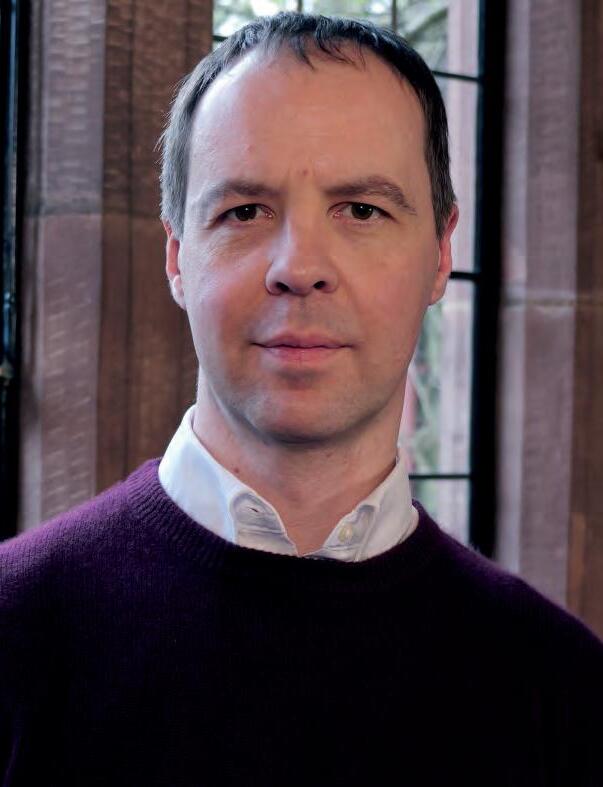
College Profiles
My first school report read ‘if left unattended, Ben will happily daydream for hours.’ It’s still true. I’m doing it now –idly wondering how to piece together an account of myself from the tapestry of accidents and achievements that make up a life. It’s a challenge, because this is a kind of history that I don’t normally write: I’ve never had any interest in writing a biography and I don’t usually find human interest stories very interesting. I’m far more curious about the ideas, processes and structures that have shaped the past than the stories of individuals. So perhaps I should begin with an explanation of how I worked out what kind of historian I am.
I grew up in Birmingham and left my single-sex independent school with good exam results, a loathing of team sports, and a conviction that homosocial institutions are deeply peculiar. At school I twice tried to drop history because it seemed more like storytelling than an attempt to explain something. Fortunately, I persisted, and the A-level course suited me far better than what had gone before. How had Henry VII stabilised his regime after seizing power? Why did some German states embrace the Reformation while others did not? These questions fascinated me, and I was lucky to have teachers who conveyed a sense that these were matters of vital importance. When it came time to think about applying for university, plans to study law were quietly postponed.
I arrived at Cambridge as the first member of my family to have done A-levels or gone to university, and consequently I had no idea what going to university involved. I immediately fell in love with the place: what a joy to be surrounded by clever, funny people who were as interested in their subjects as I was in mine! The course hooked me immediately, and being able to study topics ranging from the First Crusade to modern Japanese economic history helped me to clarify my core interests. Much of my later research career can be traced back to my very first essay, which was about women’s history. From that first supervision I took a set of questions about what men knew about feminism and, when I decided to embark on postgraduate research three years later, that is the topic I chose.
The result was my book The politics of gender in Victorian Britain: masculinity, political culture and the struggle for women’s rights (2012), which won the Royal Historical Society’s prize for the best first book on British history. The book offered an explanation of why an all-male parliament began to modify women’s legal position in the 19th century. It set me thinking more broadly about how changes in the history of masculinity have affected the ways that politicians interact with one another, the public images that they
have tried to project and the legislation that they have passed. Put simply, if we can agree that it matters that Britain’s political elites were overwhelmingly male until well into the 20th century, then I’m interested in how it mattered.
Exploring such questions required explicit reflection not just on hierarchies between men and women, but also between different forms of masculinity, because at any given point in time certain kinds of behaviour have been considered more ‘manly’ than others, and the qualities associated with masculinity have been contested. How should we conceptualise the relationships that exist between the multiple forms of masculinity within a particular society? Grappling with that question produced a series of methodological articles which have proved influential beyond the history of modern Britain.
I’m currently working on a book about the judiciary’s role in creating and sustaining gendered inequalities between 1760 and c.1960. It examines how the nature of law was reconceptualised in the late 18th century, and how a new understanding of the relationship between law and politics developed thereafter. Together, these developments created what I see as a distinctive phase of British gender politics.
Girton has proved a very happy home since I arrived as a Research Fellow in 2003. Given the College’s history, the top of the hill provides a peculiarly good vantage point from which to examine the gender politics of allmale institutions. I have benefited enormously from the daily interdisciplinary encounter that is lunch at high table. I have also benefited from 20 years of teaching Girton students. Their achievements (sometimes under incredibly difficult circumstances) are a source of great pleasure, and it’s a privilege to help them figure out what kinds of historian they are.
That’s never straightforward because the study of the past affords many different satisfactions. Some historians enjoy being detectives, piecing together clues to reconstruct what happened in the past. Others immerse themselves in the lives and experiences of others. Or there are the activists, who believe that their research can contribute to a cause. For my part, I’m an anatomist: I like to take things apart to see how they work. By studying the historical context, I try to explain why they work in that particular way rather than another. That draws attention to the fact that the things we take as common sense are not fixed and unchanging but contingent products of historical circumstance. That should be a hopeful thought: it means that there are always alternatives; it means that things can change. To that extent at least, the study of the past is far more than another idle daydream.





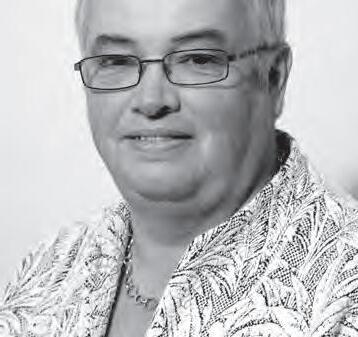

Ihave been a member of Girton College for more than 50 years. Over this period, there have been seven Mistresses and significant changes in the College in terms of its undergraduate population, professional staff and estate, all driven by Girton’s pioneering ethos of educational excellence and opportunity. I started life at Girton as an undergraduate before progressing through various categories of

College Profiles




College membership as a PhD student, Bye-Fellow, Research Fellow, Official Fellow and Professorial Fellow. I was a Director of Studies in the Biological Sciences for 19 years and have been involved in both admissions and supervising multiple courses in the biological, veterinary and medical sciences. I am now a trustee of the College through membership of the College Council, and a Life Fellow.
My route to Girton was not straightforward. I come from an academic background but, as a child, I was slow to read and failed many of the early educational milestones. I hated reading aloud, could not spell and had very poor literacy skills. I frequently ran away from my primary school, citing boredom. Today, I would probably have been diagnosed with dyslexic-type learning difficulties, unrecognised conditions then. The initial assessment of my abilities was that I was unlikely to obtain many, if any, O–Levels. However, the school was in transition to higher academic standards at the time, so by the sixth form, I had eight O–Levels with good grades in the sciences. For A–Levels, I took Mathematics, Biology and the new Nuffield Advanced Level in Physical Sciences that emphasised practical skills better suiting my strengths. Finally, with three A grades and school encouragement, I applied to one of the more science-based Cambridge colleges for men admitting women for the first time in 1972. After interview, I was rejected but Girton College accepted me from the new admissions pool, so I arrived here serendipitously in October 1972, never having visited the place.
The 1970s was an exciting time for women students in Cambridge. With a reinvigorated feminist movement and more female undergraduates, there was a wider range of extra-curricular activities for women than ever before. However, Girton was a studious and academic place, dedicated to providing excellent teaching and expanding women’s roles in society. There was no bar, gym, Ball or Social Hub in College then, no cafeteria service and no People’s Portraits on the walls. There were few College societies and social interactions in College were limited largely to meals in Hall and sherry with our Directors of Studies. It meant that we developed resilience, worked hard and felt empowered by the predominantly female environment and by College’s support for our career aspirations. We embraced the 1970s vibe that ‘women could do anything’.
During my Part II course, I decided to become an academic. I was, and still am, fascinated by how pregnant animals know when their fetuses are ready to be born. I wanted to discover what controlled fetal maturation and survival at birth. I considered PhD studentships in several universities worldwide but decided to stay in Cambridge where there were the expertise and facilities to study these questions in farm animals. With a first-class
degree in Physiology and a MRC studentship, I began my PhD investigating the role of insulin in regulating fetal development in sheep. This involved many hours working with pregnant ewes and then at the laboratory bench carrying out assays. With input from PhD students, postdoctoral fellows and many collaborators, my research broadened over the years to consider the role of fetal hormones more generally in preparing tissues for their new postnatal functions like respiration, digestion and glucose homeostasis. We now know that insulin, thyroid hormones and cortisol are all essential for normal fetal development and act not only as maturational signals but also as environmental cues determining lifelong health and adult disease risk. These findings have direct relevance to both human and veterinary medicine.
Before completing my PhD, I was appointed to a temporary demonstratorship in the Department, which began my career trajectory to Professor over the next 25 years. I was the only woman University Teaching Officer in the Department for the first 15 years but now more than 50% are women. I had periods being acting Head of Department, the most stressful of which was during the merger of the Departments of Physiology and Anatomy to become the new Department of Physiology, Development and Neuroscience. I also spent periods of sabbatical leave working in the USA and Australia, which provided new ideas, techniques and collaborators.
In 2015 I was appointed as the first female Head of the School (HoS) of the Biological Sciences, a post with oversight of the governance, finances, teaching and estate of nine Departments and three Research Institutes plus the Botanic Garden and the Museum of Zoology. The HoS acts at the interface between the University’s strategic and operational activities, representing their constituencies in central management while implementing Universitywide initiatives. Skills acquired across this portfolio of research and administration have proved invaluable to me in other arenas including College committees, promotion processes at other Universities, grant panels and in UK and European Research Councils. I have learned that listening carefully to people, awareness of the views of different constituencies and consensus building are key to good academic governance. I formally retired in 2021 but remain busy contributing to teaching, examining, committees and research publications. In my spare time, I am researching my working-class roots in the Lancashire mills and London docks during the late 19th century.
I have a steadfast loyalty to Girton which has played such a major part in my life and a deep commitment to its continuing progressive philosophy. Without the chance that the College took on me back in 1972, my life would be totally different, and I would not be writing this profile today.
Margaret Tyler Research Fellow in Geography

My research focuses on infrastructures. Despite being highly technical objects, ports, railways, pipelines and dams can be enchanting things that frequently become catalysts for public discussions and controversies about ideas of the future. For this reason during the past decade I have been studying different infrastructural projects in Italy and Georgia, mapping the promises that they come to embody and the conflicts that they often generate. Although I am a human geographer today, I was trained as a social anthropologist and my research remains indebted to this discipline. Anthropologists have always excelled in making the familiar strange in order to show the inner workings of our societies. As mundane yet somewhat obscure objects, infrastructures are perfect for such a pursuit.
I grew up in Rome and as a teenager studying was definitely not my passion. I scraped through high school and once finished, my dream was to become a fashion journalist. After some lonely months in Paris working as an intern for Karl Lagerfeld—where I spent most of my time cutting out pictures of my favourite outfits to fill a gigantic scrapbook that the designers used for inspiration—I moved to London and started working as a PR assistant at the British Fashion Council. It was my boss at the time who suggested I should go to university and get a proper degree before committing the rest of my life to the mercurial world of fashion. I was curious about the rituals and customs that underpin our societies, so I applied for a degree in Anthropology and Media at Goldsmiths. By the time I completed my degree my life in fashion seemed very distant. I have been lucky to have met some extraordinary teachers who didn’t just teach me how to interpret the world, but passed on their commitment to change it.
This commitment remains at the core of my research practice. Observing infrastructures closely it is possible to see what feminist geographer Doreen Massey has called ‘the geometries of power’ that make certain projects possible, to the detriment of others. Many of the projects I have studied, for example the planned Namakhvani Hydropower Plant, a large dam in West Georgia, are at the centre of heated conflicts between local populations, developers and the government. Between 2019 and the present I have been observing the Namakhvani conflict unfold, escalate and finally, bring the project to a halt. Like many other struggles over infrastructure, this controversy combines diverse
elements ranging from concerns about the impact of the planned dam on Georgia’s ecosystems, to opposition to the economic underpinnings of the project, to the locals’ attachment to their ancestral land. I believe that, brought together, study of these concerns can offer a different perspective on what infrastructures do and whose visions of the future they serve.
I have never enjoyed lone research and have always sought intellectual exchange. During my PhD I met Georgian artist Tekla Aslanishvili as we were both researching the construction and subsequent failure of a deep-sea port in the remote village of Anaklia in West Georgia. What started as a joyful interdisciplinary dialogue gave rise over the years to several multi-media projects that have now culminated in an experimental documentary ‘A State in A State’. Released in 2022, the film traces the history of the Baku-Tbilisi-Kars railway that crosses the South Caucasus. Similarly to my work on the Namakhvani dam, the documentary aims to show the diverse worlds that this infrastructure brings together by following different personal accounts of the railway. The name of the film was suggested to us by veteran workers who used to define the railway system as a sort of state running in parallel to the Soviet Union. This state within a state is made up of the relationships of solidarity between workers who became connected through the railway’s steel tracks. During the making of the film, the stories we were told of this ‘other’ state came to represent an alternative to the weaponisation of infrastructural systems which has sadly become commonplace in the conflicts that plague the region from Azerbaijan’s war against Armenia over the enclave of Nagorno Karabakh to Putin’s invasion of Ukraine. Besides pursuing my research, at Girton I supervise students across a range of human geography topics. I teach them about economic globalisation and its effects on labour and the lives of communities. For a geographer it is really important to be able to trace the intersection between global and local processes. We look closely at real-life examples, like the story of a group of Scottish workers employed in the Rolls Royce factory who refused to work on the military engines that had been purchased by the Chilean dictator Pinochet. Sharing with the students these small acts of solidarity with transnational impact such as this one gives me hope that university will be for them what it has been for me: a place where I have learned the necessity to fight for a more equal world.

Iwas born and brought up in a small Suffolk town, leading a very active childhood. I’d still much rather be in the open air than sitting at a desk. My earliest memory of numbers (since I am Head of Finance, I ought to be comfortable with them) was being taught how to calculate football league tables, cricket results and even totting up darts scores at a young age. Being a Suffolk lad, my lifelong love of Ipswich Town developed and I started to support them, often travelling on a
College Profiles
smoke-filled bus with my Dad in the glory years under Sir Bobby Robson. Music was also a part of my childhood, albeit listening more than playing (although I secured a few grades learning the cello). I now listen to anything from indie-based rock music to musicals. Our family love theatre too, and go when we can (including supporting our stage manager son).
As my Mum was an accountant, I guess that and my affinity for all things numeric led me down the finance path. As I didn’t really want to go to university, I spent a foundation year in Plymouth getting prepared for four years studying to be a Chartered Accountant in Suffolk. Luckily I passed first time (especially helpful since I married Ann in the same year as my finals: re-takes would have been hard!). We have been married for 32 years and have two children (who themselves are approaching 30 years of age). After six years of auditing (which I discovered was not for me), I worked at the John Innes Centre in Norwich for seven years and then moved to Cambridge in 2002. This led to 20 memorable years at Pembroke College, where my path crossed with Girton for the first time when I worked closely with Geoff Willis (a predecessor here at Girton) and others in putting in new finance systems across four colleges. After trying unsuccessfully to relocate to Oxford in spring 2022 (due to the housing market, and the role not being right for me), I then worked briefly at the University Library before the Girton post emerged. I can honestly say I’ve always loved visiting Girton, from those days in 2003 onwards. The grounds and buildings have always held an appeal. As some will know, my predecessor Catherine Rawlings left Girton in mid-2022 to take up my former role at Pembroke. Once I heard of the opportunity in late 2022 to belatedly swap places, I jumped at the chance. And it was certainly a great move, as like Pembroke the place and the people are excellent and I feel lucky to have the opportunity of working here.
From the beginning, the Finance team have made great strides in building on Catherine’s fine work. Management reporting has been further developed, taking on board comments from across the College. Reports have been refined for users and are less time-consuming to produce. We have greatly improved the understanding and utilisation of our many funds, which principally support students. We meet regularly with budget holders and have created a good interactive relationship, where Finance is there to support them. We have also simplified processes leading to the production of our annual accounts. Furthermore, we have an
on-going project to streamline and improve our key processes, sharing the ideas of the team on a more regular basis. Together with the Human Resources Department, we have also spent significant time implementing the HR/Payroll system and making changes to the staff benefits package, for example salary exchange for pensions, a health cash plan and an electric vehicle salary sacrifice scheme. It has been a great team effort, including all departments in College who have embraced the changes. And I have enjoyed working with the Mistress and Fellows who have both made me feel welcome and allowed me to contribute in a range of areas.
As well as building on the changes already started, we will need to modernise our financial systems over the next two to three years. This will enable the College to further improve processes and financial reporting, ensuring we make best use of new technology and attempt to eliminate paper from the Finance Office. The Finance team will also be playing a key role in supporting the future development of the College estate.
I should not finish without mentioning that by some people’s standards, I am also a semiprofessional runner. I probably spend time every day doing something related to running: whether running itself, strength training, stretching, watching too many YouTube videos for inspiration, going to races or to the Hunts AC running club in St Ives. I run about five times a week, covering anything from 40 to 60 miles in total. I began, like most people, just to keep fit in 2005 and ran many road races up to marathon distance. Now I run on all terrains but mainly off-road and over large distances. As I like hiking too, my race distances are usually around 30 to 50 miles, which include a mix of predominantly running but walking too. I have travelled further than this, completing distances over 70 miles a few times (the furthest was 110 miles!). I have run all over the country as I prefer hills, including the West Highland Way, north and south Wales, the Cleveland Way, the Lake District, the Ridgeway and the South Downs among others. My next race is 70 miles in the Lake District in September 2024.
As I love nature and the outdoors, this is the perfect hobby. It also makes me appreciate my surroundings, navigating through exciting and challenging conditions (including at night), but also by seeing the effects which man-made climate change is having on our environment (never more so than this year – the number of shoes and clothes drying in our airing cupboard testifies to that). I would never have thought that taking a few steps 20 years ago would have led to the adventures I now undertake.

Dr Carol Adlam (Visiting Fellow Commoner 2021–22) was promoted to Associate Professor in the Nottingham School of Art, Nottingham Trent University. She published The Russian Detective (Penguin, 2024); ‘The Bobrov Affair: creating a graphic novel adaptation of a “lost” Russian-Empire crime novel’, Adaptation and Illustration: New Cartographies. Palgrave Studies in Adaptation and Visual Culture, ed. S Wells-Lassagne and S Aymes (Palgrave Macmillan, 2024), pp. 199–216; (jointly) ‘Lost detectives: intermedial adaptations of 19th century Russian crime fiction’, Adaptation (OUP, 2023).
Professor Matthew Allen was elected a Fellow of the Orthopaedic Research Society (ORS). He published (all jointly) ‘Do locking plugs improve implant strength? Biomechanical comparison of polyaxial locking constructs with and without locking plugs in a fracture gap model’, BMC Veterinary Research 19 (2023); ‘Partial parasagittal patellectomy in dogs – a retrospective case series of 19 dogs’, Veterinary and Comparative Orthopaedics and Traumatology 36(6) (2023), pp. 317–323; ‘3D-printed, patient-specific cutting guides improve femoral and tibial cut alignment in canine total knee replacement’, Veterinary Surgery 52(5) (2023), pp. 674–685; ‘Three-dimensional morphometry of the canine pelvis: implications for total hip replacement surgery’, Veterinary and Comparative Orthopaedics and Traumatology 36(4) (2023), pp. 175–183.
Dr David Arviddson-Shukur published (jointly) ‘Nonclassical advantage in metrology established via quantum simulations of hypothetical closed timelike curves’, Physical Review Letters 131(15) (2023), pp. 150–202.
Professor Dame Frances Ashcroft (Honorary Fellow) was awarded the 2022 Manpei Suzuki International Prize for Diabetes Research which recognises original and excellent achievements in diabetes research, the first woman to win it in its 15 years; awarded the 2023 Vanderbilt Prize in Biomedical Science, which recognises women scientists with a stellar record of research accomplishments who have made significant contributions to mentoring other women in science; and was appointed Vice-Chair of the Science and Innovation Advisory Board at the Novo Nordisk Foundation Centre for Basic Metabolic Research, University of Copenhagen (2024). Dame Frances has also started ‘A Good Science Read’ podcast series discussing with guests their favourite popular science books and their love of science.
Dr Hannah Banks was awarded a PhD by the University of Cambridge, for her thesis ‘Exploring Non-Minimality in New Physics Beyond the Standard Model’. She published (jointly) ‘Gravitational wave backgrounds from colliding exotic compact objects’, Physical Review D 108 (2023); ‘Broad sterile neutrinos and the reactor/gallium tension’, Journal of High Energy Physics 4 (2024).
The Revd Dr Charlie Bell is now Official Fellow in Medicine and Public Theology. He was recently elected to the General Synod of the Church of England. During the year he was appointed as the Scholar in Residence at New York Episcopal Cathedral; as Associate Tutor at St Augustine’s College of Theology; and as Visiting Scholar at Sarum College. He published Queer Redemption (Darton, Longman and Todd, 2024) and also appeared on the BBC World Service’s ‘Heart and Soul’ episode reflecting on same-sex love and marriage in the worldwide Anglican community.
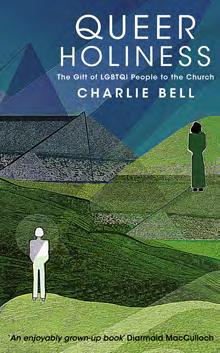
Dr Margaret Bent (Honorary Fellow) published The Motet in the Late Middle Ages (OUP, 2023). She also received the Nino Pirrotta award of the Centro Studi sull’Ars Nova italiana del Trecento ‘Marcello Masini’ (2023).
The Revd Dr Tim Boniface premiered a new six-part jazz suite ‘Psalter: Themes for Peace’ with Musician-in-Residence, James Pearson, Malcolm Creese, and Jon Ormston at St Albans Cathedral (January 2024). At Newcastle Cathedral in May, he gave a lecture on ‘Theology, Imagination and the Arts’ with The Revd Dr Malcolm Guite, followed by a performance of his jazz suite ‘The Eight Words’, an instrumental exploration of Jesus’ speech in St John’s Passion, along with Malcolm’s passion poetry between each movement.
Dr Matthew Bothwell, University Public Astronomer joined Girton as a Bye-Fellow. He published Astrophysics for Supervillains (DK Books, 2024).
Dr Caroline Brett edited (jointly) Multi-Disciplinary Approaches to Medieval Brittany,450–1200: Connections and Disconnections (Brepols, 2023).

Professor Ted Briscoe presented ‘Large Language Models (like ChatGPT): The Hype and the Reality’ at a Fellows’ Research Evening focusing on how ChatGPT has exposed an unprecedented number of people to cutting-edge natural language processing using large language models.
Dr Emma Brownlee published ‘A radiocarbon-based model of changing burial rites in early medieval England’, Radiocarbon 65(6) (2023), pp. 1232–1252. At a Fellows’ Research Evening she presented ‘Girton Excavations: a way-too-early first take’ about the archaeological excavation she led in the College grounds this year.
Juliet Campbell published Playing Britannia. How I Became Her Excellency (Holywell Press, 2023), a memoir of her career in the diplomatic service, and launched it at Girton.
Dr Collin Constantine published ‘Income inequality in Guyana: class or ethnicity? New Evidence from Survey Data’, World Development, 173 (2024); ‘Fiscal dominance and the financial resource curse: the paradoxes of plenty and banking’, Latin American Journal of Central Banking (April 2024).

Dr Jasmine Cooper joined Girton as our first Fairlie–Hutchinson Research Fellow in French. This new postdoctoral opportunity is for an outstanding early-career researcher in the field of French studies (encompassing literary studies, history of thought, cultural history, film, art history or linguistics). It is named jointly in honour of the literary scholar and critic Professor Alison Fairlie FBA, Fellow of Girton from 1946 to 1972, and holder of the first personal Chair in French at Cambridge; and Joyce Hutchinson (Baker, 1939 MML) whose generous bequest funds this threeyear fellowship.
Professor Nik Cunniffe published (all jointly) 'Modelling quantitative fungicide resistance and breakdown of resistant cultivars: designing integrated disease management strategies for Septoria of winter wheat', PLoS Computational Biology 19(3) (2023); 'What can be learned by a synoptic review of plant disease epidemics and outbreaks published in 2021?', Phytopathology 113(7) (2023), pp. 1141–1158; 'Expanding growers' choice of
plant disease management options can promote suboptimal social outcomes', Plant Pathology 72(5) (2023), pp. 933–950; 'Coupling machine learning and epidemiological modelling to characterise optimal fungicide doses when fungicide resistance is partial or quantitative', JRS Interface 20(201) (2023).
Dr Stuart Davis published ‘This woman’s memory work: futurity, family and photography in Pedro Almodóvar’s Madres paralelas (2021)’, Bulletin of Spanish Visual Studies 8 (2024), pp. 1–25.
Professor Stephan De Bièvre of the University of Lille was elected our Brenda Ryman Visiting Fellow (2024). He explained the intriguing and counterintuitive nature of quantum theory and how to harness it during his talk on ‘The Many Marvels of Quantum Mechanics: all you always wanted to know and never dared to ask’ at a Fellows’ Research Evening.
Dr Michael Degani was a finalist for the Bethwell A. Ogot Prize for his book The City Electric: Infrastructure and Ingenuity in Postsocialist Tanzania (Duke University Press, 2022) at The African Studies Association Annual Meeting in 2023.
Professor Amy Donovan published (all jointly) ‘Archivos de tefroestratigrafía en Patagonia como herramienta de conservación, divulgación y concientización de riesgos volcánicos’, Revista de Estudios Latinoamericanos sobre Reducción del Riesgo de Desastres REDER 8(1) (2024), pp. 56–74; ‘Disproportionate impacts of the COVID-19 pandemic on early career researchers and disabled researchers in volcanology’, Frontiers in Earth Science 11 (2023); ‘Insights into volcanic hazards and plume chemistry from multi-parameter observations: the eruptions of Fimmvörðuháls and Eyjafjallajökull (2010) and Holuhraun (2014–2015)’, Natural Hazards 119(1) (2023),
pp. 463–495; ‘International development and disaster risk reduction research: a UK research practitioner stocktake’, International Journal of Disaster Risk Reduction 96 (2023); ‘Contrasting memories and imaginaries of Lonquimay volcano, Chile’, International Journal of Disaster Risk Reduction 97 (2023). She also gave an insight into her research on interdisciplinary approaches to disaster risk management at a Fellows’ Research Evening.
Dr Martin Ennis published ‘“Quod licet Bacho non licet Francisco”: a new perspective on the continuo realisations of Johannes Brahms and Robert Franz’, Figured Bass Accompaniment in Europe, ed. Livio Ticli (Brepols, 2024), pp. 231–258; Brahms/Busoni: Tradition and Renewal’ in Brahms and Busoni Violin Concertos (Chandos Digital: CHSA 5333, 2024).
Congratulations to Simon Fairclough on his marriage to Emmanuel Lebaut in London on 4 July 2024 followed by a service of celebration and blessing and dinner at Girton.

Dr Judith Farman joined Girton as a Bye-Fellow in Engineering.

Professor Margaret Faultless released ‘J.S. Bach: Harpsichord Concertos, BWV 1052, 1054, 1055 and 1059’, Orchestra of the Age of Enlightenment and Steven Devine (harpsichord and director) (Resonus Classics); ‘De Pasión Mortal: Songs from Two Golden Ages’, Nicholas Mulroy , Liz Kenny, Toby Carr and Music for Awhile (LINN Records). Margaret also directed, jointly with Musician-in-Residence Nicholas Mulroy , the immersive performance of Bach’s St John Passion at Girton (March 2024).
Dr Shaun Fitzgerald had his work at The Centre for Climate Repair featured on BBC News, in The Times , and on Dutch TV. He also gave the annual David Mackay Memorial Lecture at the Institution of Mechanical Engineers (December 2023).
Dr Jonathan Fuld was appointed National Clinical Director for Respiratory Diseases at NHS England (January 2024).
Dr Evelina Gambino published (jointly) ‘Projects of transition’, Economy and Society (2024) and screened her film collaboration with Tekla Aslanishvili, ‘A State in a State’ (2022), at a Fellows’ Research Evening.
Julia Gillard AC (Honorary Fellow) spoke with Baroness Helena Kennedy at the Hay Festival about one of the most iconic speeches in modern politics, her career in the Australian government and what is still to be achieved when it comes to equality.
Professor Mia Gray published (jointly)
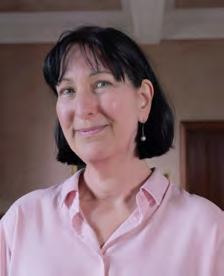
‘Understanding the post-COVID state and its geographies’, Cambridge Journal of Regions Economy and Society 1(16) (2023), pp. 1–18; ‘The power of platforms—precarity and place’, Cambridge Journal of Regions, Economy and Society 2(16) (2023), pp. 245–256; ‘Ageing power’, The Global Encyclopaedia of Informality: A Hitchhiker’s Guide to Informal Problem-solving in Human Life, ed. Alena Ledeneva, 3 (UCL Press, 2024), pp. 517–552.
Dr Ben Griffin published ‘Perceptions of crisis in the history of masculinity: power and change in modern Britain’, Men and masculinities in modern Britain: a history for the present, ed. M Houlbrook, K Jones and B Mechen (Manchester University Press, 2023), pp. 158–177.
Dr Sam Grimshaw published (all jointly) ‘A review and reassessment of the aerodynamics of cricket ball swing’, Flow 4(6) (2024); ‘Design and analysis of a lift fan for EVTOL aircraft’, Proceedings of the ASME Turbo Expo 2024, GT2024-123904 (Session: 01-12 Propellors and Open Rotors) (2024).
The Revd Dr Malcolm Guite received a Lambeth Award for Education and Scholarship and was awarded the Lanfranc Medal by the Archbishop of Canterbury for ‘outstanding multifaceted promotion of the Gospels through poetry, public speaking, and scholarship’ (June 2023). He was also awarded an Honorary Doctorate in Divinity by the Virginia Theological Seminary. He published Sounding Heaven and Earth. A Poet’s Corner Collection (Canterbury Press, 2023), of his columns from the back page of the Church Times

Dr Tom Hawker-Dawson was awarded a PhD by the University of Cambridge for his thesis on ‘Penal Communication in Crown Court Sentencing’.
Professor John Hendry published Emily Davies and the Mid-Victorian Women’s Movement (OUP, 2024).
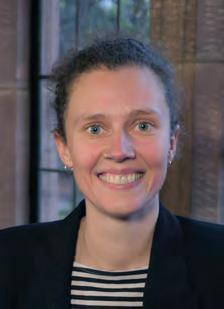
Dr Lena Holzer joined Girton as our first Sheila Lesley Official Fellow in Law. During the year she was awarded the 2023 Prix

Senior Maurice Chalumeau from the Centre Maurice Chalumeau of Social Sciences of the University of Geneva for the best PhD thesis addressing issues of sexuality in Switzerland.
Dr Aaron Hornkohl was awarded the 2024 British and Irish Association for Jewish Studies (BIAJS) Book Prize for The Historical Depth of the Reading Tradition of Biblical Hebrew. Cambridge Semitic Languages and Cultures 17 (Open Book Publishers, 2023). The citation declared it ‘an impressive piece of research in establishing the antiquity of the Tiberian reading tradition as far back as the Second Temple period’.
Dr Liliana Janik presented her innovative work combining visual art with machine learning to assess the emotional potency of art during a Fellows’ Research Evening.
Dr Gillian Jondorf has, since shortly before her retirement in 2004, been preparing English surtitles for the semi-staged readings produced and directed, once or twice a year, by Professor Boyde of St John’s College. Her surtitles have accompanied texts in Greek (Homeric, Classical, Septuagint, New Testament), Hebrew, Latin, Italian, French and Polish and are now all accessible online at www. boydesclassicdramas.org.uk.
Dr Elisabeth Kendall provided expert commentary on conflict escalation in Yemen, the Red Sea and the Middle East across major national and international television networks and news outlets in over 40 interviews. She also published ‘The Houthis’ forgotten war goes global’, Engelsberg Ideas (January 2024).

Dr Arik Kershenbaum published Why Animals Talk (Viking-Penguin, 2024); (jointly) ‘Not afraid of the big bad wolf: calls from large predators do not silence mesopredators’, Wildlife Biology (2024); ‘A multifaceted framework to establish the presence of meaning in non‐human communication’, Biological Reviews 98(6) (2023), pp. 1887-1909; 'Message in a bottle—An update to the
golden record: 1. Objectives and key content of the message', Earth and Space Science 10(12) (2023). He also presented to the College community a behind-the-scenes look at his book Why Animals Talk on researching animal communication in the wild at a Fellows’ Research Evening.
Dr Marthe Kiley-Worthington (Visiting Fellow 2002–3) published ‘What every shepherd knows: commentary on Lori Marino and Debra Merskin, Sheep complexity’, Animal Sentience 25(26) (2019); ‘How to measure quality of life in equines’, Journal of Animal Law and Interdisciplinary Animal Welfare Studies / Revista General de Derecho Animal y Estudios Interdisciplinares de Bienestar Animal 3 (2019); ‘Conflicts between wildlife conservation, animal welfare and human interests, and ways forward’, Acta Scientfica Veterinary Sciences 4 (2022), pp. 96–101; ‘Communication in a group of semicaptive black rhino (diceros bicornis). A reconsideration of their cognition and social organization’, Journal of Animal Research and Veterinary Science 8 (2024).
Dr Tor Krever joined Girton as Official Fellow in Law. He published ‘From Vietnam to Palestine: peoples’ tribunals and the juridification of resistance’, Making Endless War: The Vietnam and Arab–Israeli Conflicts in the History of International Law, ed. B Cuddy and V Kattan (University of Michigan Press, 2023), pp. 233–260; ‘Heretical enemy or vanguard of commerce? The pirate in the 16th-century legal and literary imagination’, Law, Culture and the Humanities (2024).
Dr Stephanie Lahey joined Girton as its Oschinsky Research Fellow 2023–24, in partnership with the University Library, where she presented ‘Uncommonly common copies: new insights into Cambridge Libraries’ Statuta Angliæ manuscripts’ (June 2024). She will become the Mark Andrews Fellow in Book Science at the University of Toronto in autumn 2024.
Karen Lee held a Visiting Fellowship at the National University of Singapore (February–March 2024) where the focus of her research was case-law from Southeast Asian countries relevant to the development of public international law. She (jointly) edited International Law Reports: Volumes 204 to 207 (CUP, 2024).
Dr Alex Liu published (jointly) ‘A late Ediacaran crown-group sponge animal’, Nature 630 (2024); ‘‘‘Conga lines” of Ediacaran fronds: insights into the reproductive biology of early metazoans’, Royal Society Open Science 11 (2024); ‘Taphonomic experiments fixed and conserved with Paraloid B72 resin via solvent replacement’, Lethaia 57 (2024), pp. 1–11; ‘Three-dimensional reconstruction, taphonomic and petrological data suggest that the oldest record of bioturbation is a body fossil coquina’, Papers in Palaeontology 9 (2024).
Dr Simone Maghenzani published ‘Hypocrisy, “Prudence”, “Conscience” in administration: the Congregation of Bishops and Regulars in seventeenth-century Italy’, Studies in Church History 60 (2024), pp. 216–237; ‘Global Calvinism and Protestant empires’, Storica 85 (2023), pp. 127–142; ‘Italy and its reformations reconsidered’, Reformations Compared: Religious Transformation from across Early Modern Europe, ed. H A Jefferies and R Rex (CUP, 2024), pp. 266–286; ‘Fratture e ricomposizioni. Il Risveglio tra realtà e mito’, Storia dei valdesi 3, Dal rimpatrio all’emancipazione, ed. P Naso, S P Rambaldi, G P Romagnani and F Tasca (Claudiana, 2024), pp. 315–332. Congratulations also to Simone and his wife Dr Joan Redmond on the birth of their daughter Anna Siobhán Maghenzani Redmond on 25 January 2024.

Professor Jill Mann published ‘Death and betrayal in The Book of the Duchess’, Essays in Criticism 73 (2023), pp. 379–405.

Hisham Matar (Visiting Fellow Commoner 2008) spoke about his new book My Friends (Viking, 2024) at the Hay Festival in 2024. My Friends went on to win the 2024 Orwell Prize for Political Fiction, and is the story of three Libyan men in political exile in London, and the emotional homeland that friendships can provide.
Dr Stephen Oppong Peprah published ‘The Concept of partnership in Book II of the Republic’, Polis: The Journal for Ancient Greek and Roman Political Thought 41(2) (2024), pp. 275–303. Stephen left Girton at the end of the year to take up a Postdoctoral Fellowship in Philosophy at the University of Toronto.
Dr Bryn Pickering joined Girton as ARUP Official Fellow in Engineering.
Dr Antonis Ragkousis joined Girton as Joan Robinson Research Fellow in Heterodox Economics. He was awarded a PhD by King’s College London for his thesis ‘Ontology, Ethics and Economics: Comparing Critical Ethical Naturalism and Amartya Sen’s Capability Approach’. He published ‘Amartya Sen as a neoclassical economist’, Journal of Economic Issues 58 (2024), pp. 24–58. This paper was awarded the Gavin C. Reid Prize by the Centre for Business Research at Cambridge Judge Business School for the Best Paper by a CBR Early Career Researcher.

Dr Maria Reyes Baztán joined Girton as Jean Sybil Dannatt Official Fellow in Modern and Medieval Languages (Spanish), and contributed to the Modern Languages Symposium in Easter Term.
Dr Sally Ricketts published (jointly) ‘Multiocular defect in the old English sheepdog: a canine form of Stickler syndrome type II associated with a missense variant in the collagen-type gene COL11A1’, PLoS One 18 (2023).

Dr James Riley published Well Beings. How the Seventies Lost Its Mind and Taught us to Find Ourselve s (Icon Books, 2024), held its book launch at Girton, and spoke about it at the How the Light Gets In Festival at Hay-on-Wye.
Professor Angela Roberts published (all jointly) ‘Subcallosal area 25: its responsivity to the stress hormone cortisol and its opposing effects on appetitive motivation in marmosets’, Neurobiology of Stress 31 (2024); 'Chemogenetic parsing of primate subcallosal area 25 networks involved in reward, threat and treatment responses’, Science Translational Medicine 15 (2023); ‘The aversive lens: stress effects on the prefrontal-cingulate cortical pathways that regulate emotion’, Neuroscience and Biobehavioral Reviews 145 (2023); ‘The ventromedial prefrontal cortex and emotion regulation: lost in translation?’, The Journal of Physiology 601 (2023), pp. 37–50.


Dr Maria Roca Lizarazu joined Girton as Official Fellow in Modern and Medieval Languages (German).
Professor Lucio Sarno published (all jointly) ‘Risks and risk premia in the US Treasury market’, Journal of Economic Dynamics and Control 158 (2024); ‘Nonstandard errors’, Journal of Finance 79(3) (2024), pp. 2339–2390; ‘Currency risk premiums redux’, Review of Financial Studies
37(2) (2024), pp. 356–408; ‘Foreign exchange intervention: a new database’, IMF Economic Review 71(4) (2023), pp. 852–884.
Dr Sabesan Sithamparanathan was awarded an OBE in the 2024 King’s New Year’s Honours for services to Innovation Technology and the Promotion of STEM Subjects in Education, and was elected FREng by the Royal Academy of Engineering (September 2023). He presented his work on inventing and developing the world’s most accurate passive (battery-free) radio frequency identification (RFID) tracking technology at a Fellows’ Research Evening.
Professor Dame Sarah Springman (Honorary Fellow) was awarded honorary doctorates in 2023 from the Universities of Ghent and Strathclyde. She was appointed a member of the Committee for Design Engineering and Innovation, Royal Commission for the Exhibition of 1851; and became a Commissioner, Royal Commission for the Exhibition of 1851. She gave keynote lectures to the Quaternary Research Association Annual Discussion Meeting for ‘Theme 1: Engineering in glacial and periglacial sequences. Applications of Quaternary Geoscience to Engineering: process, properties and behaviour’ and to the European Universities’ Sports Association on ‘Women in (academia, sport and) leadership as role models’.
Robert Ssempijja, artist and dancer, was our Cavendish Arts–Science Visiting Fellow Commoner for 2023–24, and presented a performance of ‘The Bound State’ with Dr David Arvidsson-Shukur at a Fellows’ Research Evening. Ssempijja was introduced to the term ‘The Bound State’ by Robert Laughlin in his book A Different Universe. He has been considering its meaning in art and society and exchanging ideas with physicists at the Cavendish Laboratory to explore its resonances as part of his Fellowship (made possible by the vision and generous gift of Dr Una Ryan OBE).

Professor Dame Marilyn Strathern published ‘Life with and without its antithesis’, Interdisciplinary Science Reviews 49(1) (2024), pp. 23–37; ‘World beginnings: a perspective from a forgotten place’, Open Lecture, trans. into Greek, Festschrift for Dimitra Gefou-Madianou, ed. R Astrinaki and A Angelidou (Athens: Patakis Publishers,2023), pp. 395–419.
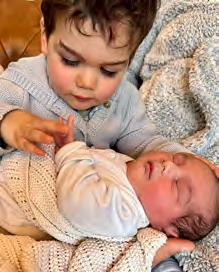
Professor John Tadross has been elected to the John Marks Official Fellowship in Medicine. He published (all jointly) ‘The vagus nerve mediates the physiological but not pharmacological effects of PYY 3-36 on food intake’, Molecular Metabolism 81 (2024); 'The gastrointestinal tract is a major source of the acute metformin-stimulated rise in GDF15’, Scientific Reports 14 (2024); ‘A cutaneous spindle cell neoplasm characterized by a COL3A1:PDGFRA fusion’, Journal of Cutaneous Pathology (2024). Congratulations also to John and his wife, Jennifer Parker, on the birth of their daughter Sadie Isobel Parker-Tadross on 11 June 2024, a sister to Felix.
Dr Dorothy Thompson published ‘The papyrus trail: houses and households in Ptolemaic and Roman Egypt’, Households in Context. Dwelling in Ptolemaic and Roman Egypt, ed. C Eilís Barrett and J Carrington (Cornell University Press, 2023), pp. 125–144; editor (jointly), Slavery and Dependence in Ancient Egypt: Sources in Translation (CUP, 2024); ‘Ptolemaic Egypt’, Slavery and Dependence in Ancient Egypt (CUP, 2024), pp. 211–273.
Sandi Toksvig (Honorary Fellow; 1977 Archaeology and Anthropology) was awarded the inaugural Qantabrigian Fellowship (known as the Q+ Fellowship) for 2023–24 by the LGBTQ+ research programme in Cambridge University’s Department of Sociology. She was the first Q+ Fellow.
Dr James Wade featured in ‘The Heege Manuscript’ episode of ‘Ian Hislop’s Oldest Jokes’ on BBC Radio 4 (January 2024). He also gave the annual lecture of the Dorothy Dunnett Society on ‘Hugh Miller: Folklore Hunter’ in April 2024.
Errollyn Wallen (Honorary Fellow) published Becoming a Composer (Faber & Faber, 2023) which combines memoir, observations, diary entries, poems and essays.
Congratulations to Dr Claire White and her husband, Tom, on the birth of their son Samuel on 3 December 2023, a brother to Joshua.
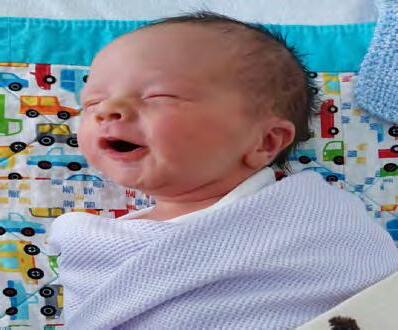
Dr John Wills published (all jointly) ‘Label-free cell segmentation of diverse lymphoid tissues in 2D and 3D’, Cell Reports Methods 3 (2023); ‘Distinct lung cell signatures define the temporal evolution of diffuse alveolar damage in fatal COVID-19’, EBioMedicine 99 (2024); ‘N-Nitrosodimethylamine investigations in Muta™Mouse define point-of-departure values and demonstrate less-than-additive somatic mutant frequency accumulations’, Mutagenesis 39 (2024), pp. 96–118; ‘In the murine and bovine maternal mammary gland signal transducer and activator of transcription 3 is activated in clusters of epithelial cells around the day of birth’, Journal of Mammary Gland Biology and Neoplasia 29 (2024).
Dr Gareth Wilson with Musician-in-Residence, Jeremy West, released Marc’antonio Ingegneri: Volume Four: Missa Gustate Et Videte; Motets For Holy Week and Easter, Girton College Chapel Choir, The Western Wyndes (Toccata Classics, 2024).


This year, Dr Sam Grimshaw (Mitsubishi Heavy Industries Senior Research Fellow in Engineering) reviewed and reassessed the phenomenon of cricket ball swing, using new results freely available online in a paper in the fluid dynamics journal Flow. Swing bowling impacts the outcome of cricket matches but the existing scientific literature does not fully capture the behaviour recorded by ball tracking data in professional matches. This means that personal experience and anecdote still drive players’, coaches’, pundits’ and fans’ thinking around swing. Better understanding of the phenomenon will improve talent identification, coaching, selection, tactics and the wider public's enjoyment of the game. Oh well played, Sir!
ARTSOC met up once a week, with members utilising a range of styles and media. It was wonderful to see a broad variety of work and for everyone to progress throughout the year, enjoying doing art together in a collective space. The BASKETBALL (03) team produced some spectacular scores in this year’s Cuppers Semi Final against Wolfson College. There were seven BINGOSOC events, including a ‘Night Before Bridgemas’ festive special with students and staff. And over 80 students attended the hugely popular final event in Easter Term, held in Old Hall. In early January, the BOAT CLUB went on a winter training camp in Figueira da Foz, Portugal, with Sidney Sussex. It took place on a Championship 2k Lake and was an excellent opportunity for the rowers and coxes of Girton to experience not only rowing off the Cam, but out of England altogether. 2024 marked the 50th Anniversary of Women in Bumps (01). Crews were originally graded on 'style' with competitors rowing with their college flag in coxed fours. Alongside Newnham and Murray Edwards (formerly New Hall), GCBC’s women greatly enjoyed the opportunity to show off their own 'style' in a celebratory row-through between divisions on the final day of Bumps. The May Boat Club Dinner was themed for
the occasion and there was a brilliant welcoming speech from College – and Boat Club – alumnus, John Taylor KC. At the end of June, Girton W1 raced in the Henley Royal Regatta Qualifiers. Extremely excited to get the opportunity to take part in such an iconic and historic event in the global rowing calendar, the crew showed the calibre of their rowing – despite the tidal conditions which they had never previously experienced. This inspirational day closed the Club's year, and leaves GCBC extremely excited about 2025 (and maybe actually qualifying for Henley Royal Regatta next year!). The CLIMBING SOC (02) was regularly spotted during the year bouldering at Kelsey Kerridge Sports Centre and at Rainbow Rockets in town. After months of hard work and dedication, the CLOUD LEOPARDS (04) were placed first in the Colleges Mixed Lacrosse League. In the 2024 Cuppers, the team progressed further than ever, reaching the semi-finals before finally being knocked out after an intense match against Emmanuel. The first league game of the year for the FOOTBALL CLUB against Downing College proved to be a perfect start for the season, with Girton winning 2–1. The GADS production for Freshers’ Week was Gir’Tons of Love written by co-President Lauren Court, and the
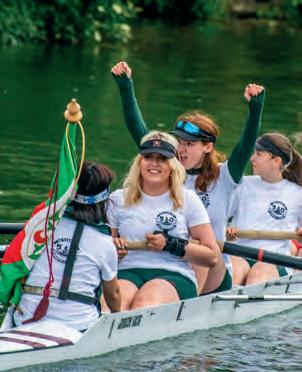


At the end of June, Girton W1 raced in the Henley Royal Regatta Qualifiers. Extremely excited to get the opportunity to take part in such an iconic and historic event in the global rowing calendar, the crew showed the calibre of their rowing – despite the tidal conditions which they had never previously experienced.


pantomime was Peter Pams written by Lauren Court and Heather Irvine, which received glowing reviews. The Stanley Library was the venue for a freshersonly production of The Importance of Being Earnest in Lent Term, with A Midsummer Night’s Dream the finale in May Week. A new magazine was begun in Lent Term as a termly vehicle for student literature, art, and photography edited by Jack Hitchcock, Anouska Cowen, and Amelia Treasure and publicised by Anna Costa. GRAMMATIKE (05) sets no themes, but represents the diverse and eclectic interests of Girton students: so far, poetry, travel photography, and articles, from film and book reviews to essays on ancient literature. The magazine takes its title from the name of Girton's resident mummified scholar, Hermione, and hopes to reflect in its content the spirit of that word, whilst providing room for students to try their hand at creative work freely and on their own terms. The ISLAMIC SOCIETY hosted a welcome brunch for new Muslim Girtonians in Michaelmas Term and a games night, plus a movie night in Lent Term. Then on the first night of Ramadan in March, there was a Swirles Court Iftar. There was
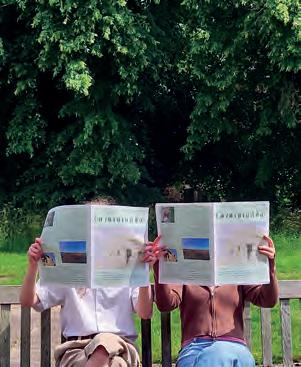
a great sense of community as everyone embraced the beauty of accomplishing a day’s fast together, marked with traditional dates and a meal and the shared joy of observing this important religious practice. There were many highlights of the MUSIC SOCIETY (08) concerts which ran weekly through most of the academic year. At the end of Michaelmas Term, GCMS held a concert featuring Girton College Orchestra (conducted by Emily Clare-Hunt and Daniel Sandell, winner of this year’s Siem Prize), GirTen brass ensemble and A Cappella Voices, performing festive music from Tchaikovsky’s The Nutcracker to Leroy Anderson’s Sleigh Ride . In early February, GCMS members performed a varied programme of works for voices and instrumental ensembles at Great St Mary’s Church, followed by a trip up the tower. Later the same month, its ‘ExtrABBAganza’ marked the 50th anniversary of ABBA’s victory in the Eurovision Song Contest with arrangements of their songs by Daniel Sandell for Girton College Orchestra, GirTen and A Cappella Voices. The May Week Concert, our end-of-year celebration, featured music for all tastes: highlights this year included concertos by Vivaldi and Bach, jazz numbers, and selections from Bernstein’s West Side Story . The NATURAL SCIENCES
SOCIETY (06) was given a tour of the University Herbarium by its curators in Michaelmas Term, learned about the preparation and uses of the specimens housed there, and contributed their own. During the year, they also learned how to set up wildlife camera traps in the grounds at Girton, and how to review footage. Badgers, foxes, rabbits and songbirds were recorded and members learned valuable field skills for studying animal behaviour. The POETRY GROUP has been meeting three times a term for many years now and has developed into a strong creative community. Members take turns reading aloud each poem in a way that keeps the author anonymous. Discussions are always encouraging and sensitively tuned to support everyone. There is a real sense of connection that comes out of these nights sharing poetry. It is a cherished space to relax and be inspired. The JCR funded a new wheel for the POTTERY SOCIETY and there were weekly sessions in the summerhouse. This year, a pottery session in aid of the charity Freedom from Torture raised £400. The SWIMMING team came fifth out of 12 teams in Cuppers, with a strong showing in the relays and with Sally Rutledge winning the 50m butterfly. Their Girton-branded caps did not go unnoticed among the other colleges.



Congratulations to Lucy Hinde who was shortlisted for 'Newcomer of the Year 2024' at the University Sports Awards. As a new member of CU Riding Club and CU Equestrian Team this year, Lucy put an impressive performance at trials and was immediately placed on the University 1st team.
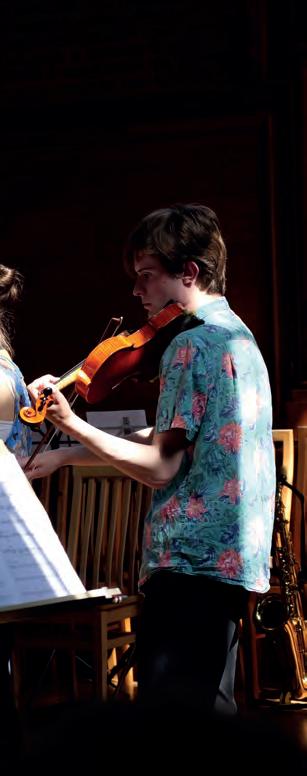
The TABLE TENNIS team secured promotion to the Colleges' 1 st Division and completed its long journey from the 6th Division begun in 2021. In Men’s TENNIS (09) Tristan Vornbäumen, Laurent Trepanier, Callum O'Kane, Ajay John, Taiyi Wang and Finley Peake, won Cuppers 2024! The Girton–Lucy Cavendish VOLLEYBALL CLUB topped their pool in the group stage of Cuppers, soundly beating Pembroke and Sidney Sussex, and putting up a strong fight against the combined Clare/Fitz team, but then suffered defeat in the knockout stage. There were many individual sporting achievements by our students during the year. One of those was ARIANA STRAIT, (07) President of the University Gymnastics Club. During the year she competed in BUCS and Varsity gymnastics competitions and trained with the team in venues as far afield as Milton Keynes and Innsbruck. And congratulations to LUCY HINDE (10) who was shortlisted for 'Newcomer of the Year 2024' at the University Sports Awards. As a new member of CU Riding Club and CU Equestrian Team this year, Lucy put an impressive performance at trials and was immediately placed on the University 1st team.


Dawn Airey (1981 Geography) was appointed CBE in the 2024 King’s Birthday Honours List for services to Theatre and to Charity (right).
Liza Barry (2001 Natural Sciences) was appointed MBE in the 2024 King’s New Year’s Honours List for services to National Security.
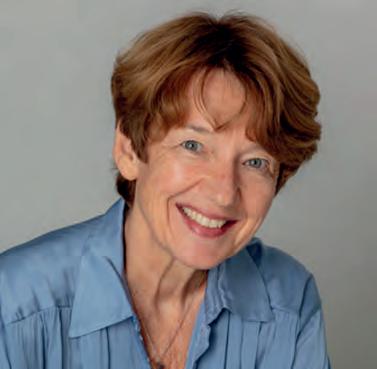
Lottie Birdsall-Strong (2013 Multi-Disciplinary Gender Studies) won the UK Women of the Future Award for Sport, as Head of Youth Strategy, The England and Wales Cricket Board (ECB) (November 2023).
Chris Brain (2023 Mathematics) won the 2024 Clare Chamber Music Composition Competition with ‘Unstable’, scored for violin, viola, cello and bass. It was premiered in the concert held in Clare Great Hall on 12 March 2024.
Mary M Brooks (1974 English) published ‘“Rags of Popery”: Dressing and addressing disrupted faith in the material culture of Roman Catholics in early modern England’, In-Between Textiles 1400–1800: Weaving Subjectivities and Encounters, ed. B Marín-Aguilera and S. Hanß (Amsterdam University Press, 2023), pp. 185–204; (jointly) published ‘Fragments of faith: unpicking Archbishop John Morton’s vestments’, The Antiquaries Journal 100 (2020), pp. 274–303; (jointly) ‘Forgotten histories and possible futures: learning from twentieth-century fibres and films made from waste regenerated protein sources’, The Plastics Heritage Congress 2019; Proceedings ed. M.E. Callapez (Ludus, 2020), pp. 131–148.
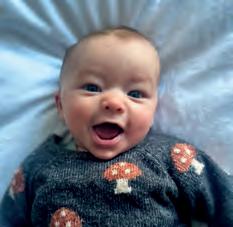
Congratulations to Rachel Butterfill Pace (2009 Theology and Religious Studies) and Elliott Pace on the birth of their son Solomon Bryn Butterfill Pace on 20 October 2023, a brother to Helena.
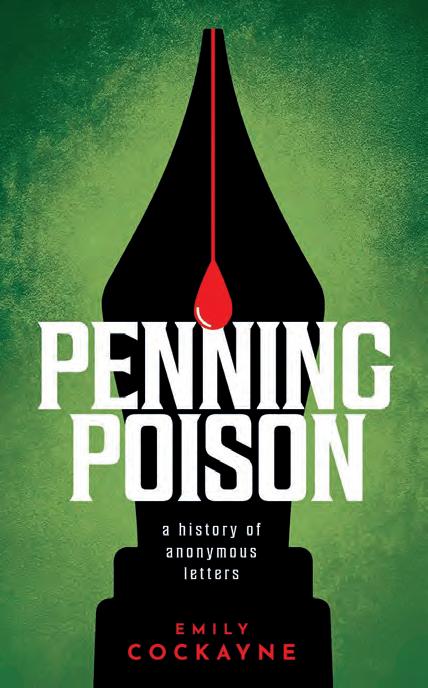
Emily Cockayne (1991 History) published Penning Poison. A History of Anonymous Letters (Oxford University Press, 2023) and was historical consultant on the 2024 feature film Wicked Little Letters starring Olivia Colman and Timothy Spall.
Claudia de Rham (2002 Mathematics) was elected as an International Honorary Member of the American Academy of Arts and Sciences (April 2023) and published The Beauty of Falling: A Life in Pursuit of Gravity (Princeton University Press, 2024).
Pauline Eaton (1956 MML) published Mothers Voicing Mothering? The Representation of Motherhood in the Novels and Short Stories of Marie NDiaye (Peter Lang, 2021).
Anna Faherty (1987 Natural Sciences) published Writing Online and Audio Stories: Crafting Nonfiction for Websites, Podcasts and Social Media (Routledge, 2024).
Rebecca Fitzgerald (Parker, 1986 Medical Sciences (Clinical)) was elected a Fellow of the Royal Society (April 2024).
Dami Folayan (2020 Education) won an Innovate UK Unlocking Potential Award 2023 for her project ‘Enhancing Textured Hairstyling with Sustainable Products: the Plant-Based Future of Textured Hair Extensions’.
Chung Yan (Crystal) Fu (2023 MPhil Holocene Climates) won the prize for the best student talk at the 5th International PalaeoArc Conference (May 2024), her attendance partly funded by a Cody and Pillman postgraduate travel award from Girton. She presented on her research developing a Bayesian calibration for the Arctic sea ice biomarker IP₂₅.

Ben Glassberg (2012 Music) was appointed Music Director of the Wiener Volksoper Orchestra (January 2024).

Lucy-Marie Hagues (Sharpe, 1996 Engineering) was appointed MBE in the 2024 King’s Birthday Honours List for services to Education and Skills.
Congratulations to Lydia HatfieldBarton (2010 MML) and Matthew Hatfield-Barton (2010 Natural Sciences) on the birth of their daughter, Cleo Alexandra HatfieldBarton, on 30 May 2024.

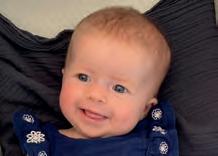
Congratulations to Rebecca Emily Hazzard Canning (2012 Architecture) on the birth of a daughter, Ophelia Margaret Hazzard Canning, on 22 January 2024.

Congratulations to Katherine Henshaw (Wagstaffe, 1990, Natural Sciences) who married Lee Henshaw in August 2022.
Seán Hewitt (2009 English) published Rapture's Road (Jonathan Cape, 2024).
Wendy Holden (1983 English) published The Princess (Mountain Leopard Press, 2024).
Matthew Isaacs (2015 Law) and Nathan Bottomley (2015 Engineering) were recognised by Forbes in its 2024 30 under 30 (Europe) List (Social Impact category) for their company My Emissions, which works with companies to add ‘carbon labels’ to food products as well as providing emissions reporting and analysis.

Nilesh Jethwa (1997 Mathematics) has won the Rising Issuer Award for his company Marex Solutions at the 2024 SPi Structured Products Conference (Europe) in Lisbon.
Nabil Khabirpour (2008 Law) and his team at The Law Corner were presented with a special recognition award at the Cambridge University Law Society Pro Bono Awards (March 2024).
Kay-Tee Khaw (1969 Medical Sciences (Clinical)) was placed fifth worldwide and topped the list for Europe in the Research.com Best Female Scientists in the World 2023 rankings.
Stephen Kirk (1987 Natural Sciences) published (jointly ) Next Generation Quantum Theory of Atoms in Molecules: From Stereochemistry to Photochemistry and Molecular Devices (Springer Singapore, 2023).
Jill Lam (2023 Law) won the European round of the University of Oxford Price Media Law Moot Competition (February 2024) as
part of the Cambridge University student team. Jill also received an individual award for Best Oralist.
Carenza Lewis (1982 Archaeology and Anthropology) was awarded the British Academy’s Landscape Archaeology Medal 2023, in recognition of her contribution to the field and her lasting impact on social sciences (September 2023).
Sarah Lingard (Cobb, 1998 SPS) was appointed OBE in the 2024 King’s New Year’s Honours List for services to British Foreign Policy and to the Coronation of Their Majesties The King and The Queen.
Kai-Yin Lo (1958 History) was one of the International Women’s Forum’s ‘Women Who Make a Difference’ Honorees in 2024 for her achievements in design, as pioneer behind one of Asia's first international brands.

Myriam Lowe (2023 Music) released her first recording ‘Tu del Ciel ministro eletto, G.F. Handel’ with the Lowe Ensemble.
Antonia Lynn (Dean, 1977 Theology and Religious Studies) was awarded a Professional Doctorate in Practical Theology by the Cambridge Theological Federation (July 2023).
Jonathan McGoh (McIntosh, 1999 Classics) was appointed OBE in the 2024 King’s New Year’s Honours List for services to Education.
Rafmary M Millan Reyes (2017 Development Studies) won an Innovate UK Unlocking Potential Award 2023 for her project which aims to narrow the skills deficit projected to cost the United Kingdom £120 billion by 2030.
Alison Morgan (1978 MML) published World Turned Upside Down: The Psalms and the Spirituality of Pain (BRF, 2023).
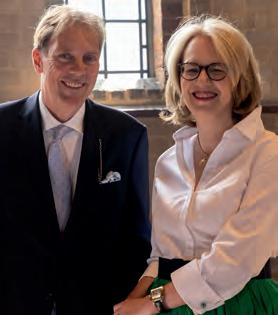
Congratulations to Cecilia Oram (Hughes, 1977 MML) who married John Fawcett-Ellis on 20 May 2023.
Maxine Purdie (Head of Catering and Conferencing) was appointed MBE in the 2024 King’s New Year Honours List, for services to Knowledge Exchange.
Congratulations to Sabrina Rodriguez (2007 MML) who married Domingo Widen in April 2024 (right).
Congratulations to Alexander Rossiter (2013 Engineering) who married Catherine Foot (2013 English) in July 2023.


Congratulations to Karolina Saar-Skramstad (2007 Archaeology) who married Ole Kristian Flatebø Skramstad in June 2023 and on the birth of their daughter Charlotte Saar-Skramstad on 2 September 2023.

Dmitri Safronov (2016 PhD, Politics and International Studies) published Nietzsche’s Political Economy (De Gruyter, 2023).


Congratulations to Valerie Sanders (1975 English) who married Bruce Collins in October 2023.
Priyanka Savjani (2012 Economics) was recognised by Forbes in its 2024 30 Under 30 (Europe) List (Retail and eCommerce category) for her plant-based baked-goods business, Pri Bakes.
Ann Shukman (King-Farlow 1950 MML) published 44 Days in Prague: The Runciman Mission and the Race to Save Europe (Hurst Publishers, 2024).
David Smith (1985 Natural Sciences) was appointed Pro ViceChancellor and Executive Dean at Swansea University (January 2023).
Jon R. Topham (1984 Natural Sciences) was promoted to Professor at the University of Leeds and published Reading the Book of Nature: How Eight Best Sellers Reconnected Christianity and the Sciences on the Eve of the Victorian Age (University of Chicago Press, 2022).
Holly (formerly Majorie) Trusted (1974 English) was awarded a Fellowship at the Clark Institute, Massachusetts for 2025, and will be conducting research into the work of the Spanish sculptor Luisa Roldán (1652–1706) in preparation for a catalogue raisonné, which she is compiling with the Australian scholar Catherine Hall-
van den Elsen. Holly also edited (jointly) Discovering Women Sculptors (Public Statues Sculpture Association, 2023).
James Walsh (2021 Engineering) won the 2024 Wilkes Award for his joint paper ‘Near Real-Time Social Distance Estimation in London’, The Computer Journal 67(1), pp. 95-109. James, our MCR President in 2023-24, also won the Outstanding Contribution Award for his work on behalf of Girton postgraduates at the Cambridge Students’ Awards (June 2024).
Sarah Watkinson (Day, 1961 Natural Sciences) published Native Soil ( Moore & Weinberg, 2023).
Irene Weber (1971 Natural Sciences) published Baswin: 5 (Taxyon Space) (2022).

Ruth Whippman (1993 History) published BOYMUM, Raising Boys in the Age of Toxic Masculinity (Quercus, 2024).
Bryan Zhang (2012 Geography) was appointed to the board of the Financial Conduct Authority (FCA) (February 2024).



Fellows
The Rt Hon Baroness Hale of Richmond, PC, DBE, MA, Hon FBA, Hon LLD, Hon FRCPsych
Dr Elisabeth C Kendall, MA, DPhil, PhD, Hon DLitt (Glasgow)
Professor Anita Desai , CBE, BA, FRSL
The Rt Hon the Lord Mackay of Clashfern , KT, PC, Hon LLD, FRSE
Queen Margrethe of Denmark, Hon LLD
Miss E Llewellyn-Smith, CB, MA
Dame Bridget Ogilvie , DBE, AC, PhD, ScD, FIBiol, FRCPath, FMedSci, FRS, Hon DSc (Nottingham, Glasgow, Bristol, Dublin, Durham, Kent, ICL, Leicester, Manchester, St Andrews)
Professor Dame Gillian Beer , DBE, MA, LittD, BLitt, Hon DLitt (Liverpool, Leicester, London, Sorbonne, Queen’s Belfast, Oxon, Harvard, St Andrews), FBA, FRSL
The Rt Revd David Conner, GCVO, MA
The Rt Hon Lady Arden, PC, DBE, MA, LLM, LLM, Hon LLD (Liverpool, Warwick, Royal Holloway, Nottingham, UCL)
The Rt Hon Baroness Perry of Southwark, MA, Hon LLD (Bath, Aberdeen), Hon DLitt (Sussex, South Bank, City), Hon DEd (Wolverhampton), Hon DUniv (Surrey), Hon DLitt Hum (Mercy College NY), FRSA
Dame Rosalyn Higgins, GBE, LLB, MA, Hon LLD, Hon DCL (Oxon), Hon LLD (LSE), FBA
Dame Ann Bowtell, DCB, MA, PhD
Professor Dusa McDuff, BSc , PhD, FRS, Hon DSc (Edinburgh, York, Strasbourg)
Dame Ruth Runciman, DBE, BA, BA
The Rt Hon Baroness Symons of Vernham Dean, PC, MA
Lady English, MA, MB, BChir, MRCP, FRCPsych
Ms J Rachel Lomax, MA, MSc
Dr Margaret H Bent, CBE, MA, MusB, PhD, Hon DMus (Glasgow), Hon DFA (Notre Dame), Dr hon c (Montreal), FBA, FSA, FRHistS
Dame Elizabeth L A Forgan, DBE, BA,
Hon FBA
Professor Dame Frances M Ashcroft, DBE, MA, PhD, ScD, FRS
Professor Dame Athene Donald, DBE, MA, PhD, FRS
The Rt Hon Dame Elizabeth Gloster , PC, DBE, MA
Professor Dame Madeleine J Atkins, DBE, MA, PGCE, PhD
Professor Dame Sarah M Springman , DBE, MA, PhD, FREng, FICE, Hon DUniv (Ghent, Strathclyde)
Ms Daphne Todd , OBE, Hon PhD (De Montfort)
HIH Hisako, The Princess Takamado of Japan, MA, PhD, Hon LLD (Alberta, Prince Edward Island), Hon EdD (Hannam), Hon PhD (Josai)
Professor Dame Pratibha Gai, DBE, BSc, MSc, PhD, FRS, HonFRMS, FRSC, FREng
Ms Sandra B Toksvig, OBE, MA, Hon DLitt (Portsmouth, York St John, Surrey, Westminster, Leicester)
HE Dame Karen E Pierce, DCMG, MA, MSc
Dr Suzannah C Lishman, CBE, MA, BChir, MB, Hon FRCPI, Hon DSc (Swansea)
Ms Julia Gillard, AC, BA, LLB, Hon DLitt (Newcastle NSW), Hon LLD (Deakin, Glasgow Caledonian, RMIT), Hon DUniv (Adelaide, Ben-Gurion, Canberra, Victoria, Vrije Universiteit Brussel)
Professor Dame Lesley Regan, DBE, MD, FRCOG, Hon DSc (UCL), Hon FCOG (America, Sri Lanka, India, Royal Australian and New Zealand), Hon FRCPI, Hon FRCMidwives
Sir Stephen A G Hough, Kt, BMus, MMus, CRNCM, Hon DMus (Liverpool)
Ms Errollyn Wallen, CBE, BMus, MMus, MPhil , Hon Fellow (Goldsmiths), Hon PhD (Royal Conservatoire of Scotland)
BARBARA BODICHON FOUNDATION FELLOWS
Mrs Sally Alderson , MA
Mrs Margaret Llewellyn, OBE, MA
Mrs Veronica Wootten, MBE, MA
Dr Margaret A Branthwaite, BA, MD, FFARCS, FRCP
Dr Ruth Whaley, BA, MA, PhD
Miss Sarah C Holt, MA
Mr Colin S Grassie, MA
Mr Leif O Høegh, MA, MBA
Ms Gladys Li, MA
Enid A C MacRobbie, MA, PhD, ScD, FRS, Life Fellow
Dorothy J Thompson, MA, PhD, Hon DLitt (Liverpool), FBA, Life Fellow
Melveena C McKendrick, MA, PhD, LittD, FBA, Life Fellow
Nancy J Lane Perham, OBE, MA, PhD, ScD, MSc, DPhil, Hon LLD (Dalhousie), Hon ScD (Salford, Sheffield Hallam, Oxford Brookes, Surrey, Heriot Watt), Life Fellow
Gillian Jondorf, MA, PhD, Life Fellow
Jill Mann, MA, PhD, FBA, Life Fellow
Ruth M Williams, MA, PhD, ScD, Life Fellow
Julia M Riley, MA, PhD, Life Fellow
A Marilyn Strathern, DBE, MA, PhD, FBA, Hon DLitt (Oxon, St Andrews, ANU), Hon ScD (Edinburgh, Copenhagen, Helsinki, Durham), Hon Doctorate (Panteion), Hon DPhil (Papua New Guinea), Hon DSocSci (Queen’s Belfast, Yale, KCL), Hon LLD (Harvard), Life Fellow and Former Mistress
Roland E Randall, MA, MSc, PhD, FCIEEM, Life Fellow
Martin D Brand, MA, BSc, PhD, Life Fellow
John E Davies, MA, BSc, PhD, Life Fellow
David N Dumville, MA, PhD, Life Fellow
Abigail L Fowden*, MA, PhD, ScD, Life Fellow
Juliet A S Dusinberre, MA, PhD, Life Fellow
Thomas Sherwood, MA, MB, BS, FRCR, FRCP, Life Fellow
Richard J Evans, MA, PhD, MRCVS, Life Fellow
Alastair J Reid, MA, PhD, Life Fellow
Sarah Kay, MA, DPhil, LittD, FBA, Life Fellow
Howard P Hodson, MA, PhD, FREng, Life Fellow
Peter C J Sparks, MA, DipArch, RIBA, Life Fellow
Stephanie Palmer3, LLB, SJD, LLM, Non-Stipendiary Fellow
Frances Gandy, BA, MA, MCLIP, Life Fellow
Christopher J B Ford1, MA, PhD, Professorial Fellow
Charity A Hopkins, OBE, MA, LLB, Life Fellow
W James Simpson , BA, MPhil, PhD,
Life Fellow
Anne Fernihough, MA, PhD, Life Fellow
Angela C Roberts1, PhD, FMedSci, Professorial Fellow
Hugh R Shercliff3, MA, PhD, Official Fellow and Director of Studies in Engineering
Martin W Ennis3, MA, PhD, FRCO, KRP (Organ), KRP (Harpsichord), Austin and Hope Pilkington Official Fellow, Director of Studies in Music and Director of College Music
John L Hendry, MA, MSc, PhD, Life Fellow
Jochen H Runde1, BCom, BCom (Hons), MCom, MPhil, PhD, Professorial Fellow
Dennis Barden, MA, PhD, Life Fellow
Andrew R Jefferies, MA, VetMB, FRCPath, MRCVS, Life Fellow
Juliet J D’A Campbell , CMG, MA, Life Fellow and Former Mistress
Peter H Abrahams, MBBS, FRCS, FRCR, Hon DO, Life Fellow
Deborah Lowther, MA, ACA, Life Fellow
Clive Lawson, MA, PhD, Frank Wilkinson Official Fellow and Director of Studies in Economics
Julian D Slater, PhD, BVMS, Supernumerary Fellow
A Mark Savill, MA, PhD, FRAeS, Life Fellow
S-P Gopal Madabhushi1, PhD, FICE, Professorial Fellow and Director of Studies in Engineering and Manufacturing Engineering
Mia Gray2, MA, BA, MRCP, PhD, Supernumerary Fellow
Ruth M L Warren, MA, MD, FRCP, FRCR, Life Fellow
Alexandra M Fulton, BSc, PhD, Official Fellow in Biological Sciences
Maureen J Hackett, BA, MA, Official Fellow and Junior Bursar
Crispin H W Barnes1, BSc, PhD, Professorial Fellow
Judith A Drinkwater*, MA, Official Fellow, Tutor and Director of Studies in Linguistics, Modern and Medieval Languages, and History and Modern Languages
Edward J Briscoe, BA, MPhil, PhD, Supernumerary Fellow
K M Veronica Bennett , MA, BSc, PhD, Life Fellow
Harriet D Allen*1, MA, MSc, PhD, Professorial Fellow, Tutor and Director of Studies in Geography, and Education
Shaun D Fitzgerald 11 , OBE, MA, PhD, FREng, Official Fellow and Director of Studies in Engineering and Manufacturing Engineering
Stephen Robertson, MA, MSc, PhD, Life Fellow
The Revd A Malcolm Guite, MA, PhD, Hon DD (Virginia Theological Seminary), Life Fellow
Stuart Davis9, MA, BA, MPhil, PhD, Deputy Senior Tutor, Tutor, Foundation Year Tutor and Director of Studies in Modern and Medieval Languages, and History and Modern Languages
Benjamin J Griffin*3, MA, PhD, Official Fellow and Director of Studies in History
Fiona J Cooke8, MA, BM, BCh, PhD, MSc, FRCP, FRCPath, DTM&H, SFHEA, Official Fellow in Medicine and Dean of Discipline
Ross Lawther, MA, PhD, Olga Taussky Official Fellow and Director of Studies in Mathematics
Karen L Lee7, MA, Supernumerary Fellow
Stuart A Scott2, MA, PhD, Official Fellow and Director of Studies in Chemical Engineering
Stelios Tofaris3, MA, PhD, Official Fellow and Director of Studies in Law
Liliana Janik6, MPhil, PhD, Official Fellow, Tutor for Postgraduates and Director of Studies in Archaeology
Samantha K Williams2, BA, MSc, PhD, Official Fellow and Director of Studies in History and Politics
Susan J Smith, BA, MA, DPhil, PhD, FAcSS, FBA, FRSE, Life Fellow and Former Mistress
Nik Cunniffe2, MA, MPhil, MSc, PhD, Official Fellow and Director of Studies in Biological Sciences
Katherine Hughes3, BSc, BVSc, MRCVS, PhD, Dip ACVP, FRCVS, NonStipendiary Fellow
Helen A Van Noorden*, BA, MPhil, PhD, Wrigley Official Fellow and Director of Studies in Classics
Amy R Donovan2, MA, MPhil, MSc, PhD, Official Fellow, Tutor and Director of Studies in Geography
Alexander G S C Liu4, MEarthSci, DPhil, Christine McKie Official Fellow in Natural Sciences
Morag A Hunter8, MA, PhD, Official Fellow, Tutor for Admissions, Tutor and Director of Studies in Physical Sciences
Heidi Radke 3 , DVM, DrVetMed, FRCVS, Supernumerary Fellow
Emma J L Weisblatt, BA, MB, BCh, MRCP, MRCPsych, PhD, Official Fellow, Tutor and Director of Studies in Psychological and Behavioural Sciences
Sophia M I Shellard-Von Weikersthal , BSc, PhD, Official Fellow, Tutor for Postgraduates, Director of Studies in Medicine and Postgraduate Admissions Tutor
Henrik Latter2, BA, BSc, MSc, PhD, NonStipendiary Fellow
Matthew J Allen1, MA, VetMB, PhD, FORS, Professorial Fellow and Director of Studies in Veterinary Medicine
James Wade , BA, MA, PhD, Jane Elizabeth Martin Official Fellow, Director of Studies in English and Fellow for Postdoctoral Affairs
R James E Riley, BA, MA, PhD, Muriel Bradbrook Official Fellow, Director of Studies in English and Fellow for Postgraduate Affairs
Simone Maghenzani*9, MA, BA, MA, PhD, Marilyn Strathern Official Fellow and Director of Studies in History
Samuel D Grimshaw, MEng, PhD, Mitsubishi Heavy Industries Senior Research Fellow and Director of Studies in Engineering
Arik Kershenbaum, MA, PhD, ScD, FZSL, Official Fellow, Tutor and Director of Studies in Biological Sciences
Andrew C Irvine7, BSc, DPhil, MA, Official Fellow and Director of Studies in Physical Sciences
Sebastian L D Falk14, BA, MA, PGCE, MPhil, PhD, Official Fellow in History and Philosophy of Science, Tutor for Admissions, Tutor, Foundation Year Director of Studies and Praelector
Aaron Hornkohl, BA, MA, PhD, Official Fellow, Tutor and Director of Studies in Asian and Middle Eastern Studies
Claire E White 3 , MA, PhD, Brenda Stacey Official Fellow and Director
of Studies in Modern and Medieval Languages, and History and Modern Languages
Shona Wilson Stark4, LLB, LLM, PhD, Official Fellow in Law
Jenny K Blackhurst * , MA (Hons), MA, MCLIP, Official Fellow and Librarian
Carolina C Alves , MA, BSc, MSc, PhD, Supernumerary Fellow
Hilary F Marlow*, BA, BA, PhD, Official Fellow and Vice-Mistress, Tutor for Postgraduates and Director of Studies in Theology, Religion and Philosophy of Religion
Diana Fusco4, BPhys, MPhys, PhD, Official Fellow in Physical Sciences and Tutor for Postgraduates
The Revd Charles J M Bell*, MA, MA, PhD, MB, BChir, MRCPsych, Official Fellow in Medicine and Public Theology, Director of Studies in Medicine and Praelector
Marie-Aude A C Genain2, MA, DMV, MSc, DipECVDI, MRCVS, Official Fellow, Director of Studies in Veterinary Medicine and Tutor for Postgraduates
Soudabeh Imanikia, BSc, MSc, PhD, Official Fellow and Tutor
David R M Arvidsson-Shukur , BSc, MASt, PhD, Official Fellow and Tutor
James S Anderson*, MA, MA, Official Fellow and Bursar
Emma C Brownlee, BA, MA, PhD, Official Fellow, Ottilie Hancock Research Fellow in Archaeology and Tutor
Collin M Constantine, BSc, MSc, PhD, Official Fellow in Economics and Tutor
Thomas C Hawker-Dawson, MA, MPhil, PhD, Brenda Hale Official Fellow and Director of Studies in Law
Sally L Ricketts7, BSc, PhD, Official Fellow and Tutor for Postgraduates
Stéphanie M Swarbreck9, BSc, MSc, PhD, Janet Harker Official Fellow in Biological Sciences
Matthew R J Neal, MA, PhD, Official Fellow, Tutor and Director of Studies in History and Politics
William E V Barker, MSc, PhD, Rosamund Chambers Research Fellow in Astrophysics
Simon N Fairclough*10, MA, Official Fellow for Music Performance
John A Tadross, BSc, PhD, MBBS, FRCPath, John Marks Official Fellow and
* Member of Council (trustee of the College)
1 University Professor (Grade 12)
2 University Professor (Grade 11)
3 University Associate Professor (Grade 10)
4 University Associate Professor (Grade 9)
5 University Assistant Professor
6 University Assistant Director of Research
7 University Senior Research Associate
8 University Teaching Associate/Associate Lecturer
9 Faculty Affiliated Lecturer
10 Director of the Cambridge University Centre for Music Performance
11 Director of the Centre for Climate Repair at Cambridge
12 J M Keynes Fellow in Financial Economics, Judge Business School
13 Director of Performance, Faculty of Music
14 University Deputy Proctor
15 Deputy University Librarian
16 University Public Astronomer
Fellows and Officers of the College, June 2024
Director of Studies in Medicine
Marta Gentilucci 5 , MMus, MA, MA, PUK, PhD, Official Fellow for Music Composition
Jacob M R Currie 5 , BA, MPhil, PhD, Official Fellow in Classics
Gail A Williams* , BA, PhD, Hon LLD (UCL), Official Fellow and Senior Tutor
Evelina R Gambino , BA, MA, MA, PhD, Margaret Tyler Research Fellow in Geography and Director of Studies in Geography
Michael J Degani , BA, MA, PhD, Juliet Campbell Official Fellow
Hannah M Banks , MSci, MASt, PhD, Henslow Research Fellow in Theoretical Physics
Lucio Sarno1 12, MA, BEcon, MSc, PhD, Professorial Fellow and Director of Studies for Management Studies
Alastair J D Flett 15 , BA, MA, NonStipendiary Fellow
Tor Krever , AB, MPhil, JD, LLM, PGCE, PhD, Official Fellow in Law
Jasmine D Cooper , MA, MA, PhD, Fairlie–Hutchinson Research Fellow in French
Stephanie J Lahey , BA, MA, PhD, Oschinsky Research Fellow
Lena S Holzer , BA, MA, PhD, Sheila Lesley Official Fellow in Law
Maria Reyes Baztán , BA, MA, PhD, Jean Sybil Dannatt Official Fellow in Modern and Medieval Languages
Antonis Ragkousis , BSc, MA, MA, PhD, Joan Robinson Research Fellow in Heterodox Economics
Maria Roca Lizarazu , BA, MA, PhD, Official Fellow in Modern and Medieval Languages
Brynmor C Pickering , MA, MEng, MRes, PhD, ARUP Official Fellow in Engineering.
BYE-FELLOWS
Alice R Bird , MA, VetMB, DipECVAA, MRCVS, Director of Studies in Veterinary Medicine
The Revd Timothy R Boniface , BA, MA, PhD, Chaplain
Matthew S Bothwell 16 , MPhys, PhD
Caroline J A Brett 4 , MA, PhD, Director of Studies in Anglo-Saxon,
Norse and Celtic
Kathryn J Burton , MB, BChir, MRCP, MD, FRCPH, Director of Studies in Clinical Medicine
Stephen A Cummins , BSc, PhD, Director of Studies in Computer Science
Marieke I Dhont , BA, MA, PhD, Foundation Year Bye-Fellow
Claudia Domenici4, BA, MA, Director of Studies in Modern and Medieval Languages, and History and Modern Languages
Judith R Farman , MEng, PhD, CEng MIET (Engineering)
Margaret Faultless13, MA, Hon FBC, FTCL, ARCM, Hon RAM (Music)
Sarah L Fawcett , BA, BM, BCh, MRCS, FRCR, PhD (Medicine and Veterinary Medicine)
Jonathan P Fuld , MB, ChB, PhD, FRCP, Director of Studies in Clinical Medicine
André J Kortum , BVSC, MRCVS, DipECVIM-CA, Director of Studies in Veterinary Medicine
John Lawson , BA, PhD, Director of Studies in Politics, International Relations and Sociology, and Psychological and Behavioural Sciences
Hugo V Lepage , BSc, MASt, PhD (Physical Sciences)
Hazel M Mills , MA, BA, DPhil, Bye-Fellow for Legacies of Enslavement and College History
Stephen Oppong Peprah , BA, MPhil, MPhil, PhD, Cambridge in Africa Bye-Fellow (Classics)
Eleonora Po4, DVM, MS, DipACVIM, MRCVS, Director of Studies in Veterinary Medicine
Shyane Siriwardena8, BA, MPhil, PhD, Foundation Year Bye-Fellow and Director of Studies in Philosophy
Mark Smith , LLB, LPC, MBA, MSc, Bye-Fellow for Workplace Transition
John W Wills , BSc, PhD, Bye-Fellow for STEM Career Transition
Gareth F Wilson , BMus, DipRAM, DipPGPerfRAM, MA, PGCert, ARAM, PhD, Director of Chapel Music and Assistant Director of Music
ENTERPRISE FELLOW
Sabesan Sithamparanathan , OBE, BEng, MPhil, PhD, FIET, FREng
EXTERNAL DIRECTORS OF STUDIES
Stefania Fiorentino, BEng, MEng, PhD, Director of Studies in Land Economy
Richard Jennings, PhD, Director of Studies in Philosophy, and History and Philosophy of Science
Flora Samuel1, BA, DipArch, PhD, RIBA, Director of Studies in Architecture.
MUSICIANS-IN-RESIDENCE
Andrew Kennedy, MA, PGDip
Nicholas Mulroy, MA, PGDip, ARAM
James Pearson, GGSM
Jeremy West, BA, Hon FRWCMD.
VISITING FELLOWS
Stephan De Bièvre , BSc, MSc, PhD, Brenda Ryman Visiting Fellow
Robert Ssempijja, Cavendish ArtsScience Visiting Fellow Commoner
LECTEUR
Arthur Dussart (Ecole Normale Supérieure de Lyon)
SECRETARY TO COUNCIL
Caroline Shenton , MA (Hons), DPhil, PGDipARM
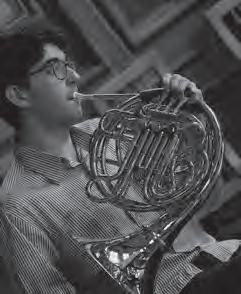
PhD S Aich, E K Bladon, S Carrillo Roas, I Chung, K A Ciazynska, S J Gadomski, S M Graham, Z F Habib, P M Hanji, D J Hoey, F Hrnčiřík, T J L Humphrey, A D Ialongo, R Irvan, H K Jameson, W Jia, I A Jones, M M Kalenak, T C Kappes Reveco, A B Kennedy, S H Khan, O J Klein, A Kontogiannis, M L Labrunie, Z Liu, T E Loman, C McCague, J F Melo, B N Mercado Saavedra, A Mohammed Karim, A Mulard, O L Panetta, H Pavey, S Petchrompo, C N Roberts, I Rosen, A D Rossiter, C J Runyan, M C Seag, G Sorrentino, S N M Spurrier, B J Utting, M Vreeswijk, E S Vriend, S-C You
LLM: B Batra, M E S Faustin-Clenaghan, J D Fong, E E Gluer, F H. Avdić, A Khalifi, T Y J Lam, N Nema, T Rojmahamongkol, J B Shah, A Statsenko, E S Watson
MCL: R C Chan, M W J Ong
MRes: A Al-Deka, H Bilboe, C Y Mok, R D Petrie, A N Thibaut
MPhil: D C Aguilar Yáñez, E Akpomudje, N Aksentijevic, S M Alert, H S F Alsharif, E Bashkova, H Basi, A Bastianelli, K Baughn, C R Bennett, J J Berger, F Bernasconi, C M Beynon, A A Bhojani, N H Binti Abid, C Boy, H Cao, M Cao, Q Cheng, Z Cheng, D H Y Chu, K L Clark, M J G Clement, D W Collison, P Córdova Zelinski, L B Czacharowski, D Davidson, R S Demchuk, P Dent, C Denton, J Denton, A Devaprasad, S O E Diaz-Cuffin, D D Dineen, S Dong, C J Doyle, K S Egle, W Y Eng, E-K Eustratiou, L Flahive, J Fleischer, Y Ge, A R Goenka, A P Grigsby, K F J Groß, Y Gu, L Hadziomerovic, S Haque, M H Harms, O Hawkins, T Heinrich, E Hernandez Hurtado Esquilas, B M Hilton, L L S Ho, I C Hoover, I Horodinca, J Hui, G T Hunt, J Ibarra, J J Isacowitz, D Kadich, Y C Kahyaoglu, A A Kanan, O T Kaplan, R T Kfuri Rubens, Z Khalid, A Khan, K Khatra, J C Knoerzer, M I Köhler, T H N Kokken, G Kundalia, H L H Kwan, K S Lau, I A Levy, H Li, K Li, M Li, Z Li, B Lines, A H Y Liu, H Liu, M Liu, Y Liu, M Lu, W Lu, W Luo, J Lush, G Lyubimova, I K Macleod, C
P Manley, J H Martin, S Z Masud, E C Minogue, V M Mischley, A E Morgan, Y Mori, A Murphy, J Nemer, J O’Shea, E S Owusu-Nepaul, J R L Pendleton, F Peng, D Pistner, C Potier, Y Qi, G Rajesh, E Reardon, T K Rich, S Richardson, J M Rickard, B Roka, K N Rowe, D Salinas De Los Santos, P Savery, T S Senthilnathan, C M Sheeran, A Smail, D Smith, T Y So, Z Song, E M L Sosa El Fakih, C Staller, A Steele, J Z Sultan, K Sultanov, H Sun, J Tian, L Tolu, I M Topper, I-M Ungureanu, C F Vanderkar, A Vogt, L K Völk, C V R Wade, C Wang, C S Wang, M Wang, Q Wang, R A Waters, J Wei, H Weng, A Widdicombe, S F Wilson, J L Wiseman, X Xia, E Xiao, K Xie, R Xu, Y Xue, W Ying, T Zhou, N Y Zhu
MASt: S W Close, N Cording, S G Fitzgerald, Z Gao, M Husein, V Karumanchi, O J Lewis, L R Lukačević, A E Maris Natera, J Pérez Zarraonandia, A Shapiro, J H Skelton, R Thakkar, D Tsarev, I Varnas
MBA: D M Ong’angi MFin: I Kovaykina, R K Pothukuchi, J Zhang MAcc: B Chaturvedi
MEd: M Carlyle MB: J Dempsey, M M Graczyk, A Islam, A A Khan, A Kisat, S D Kumarasiri, C M Lam, L Nagy, G H Nishimura, M Pandiaraja, B N Ryan, S E Watkins, L Zh VetMB: E Broadbent, Z Child, G Craft, M L E Lai, S Pearey, N Y Schwartz, N S Siddiqui, L Steele, E J Stephenson, S L Yuen
UNIVERSITY PRIZES FOR ACADEMIC EXCELLENCE
Department of Pharmacology Prize: N Go Donald Wort Prize: D Sandell (Music) Junior Scholefield Prize: F di Castiglione (Music) Whewell Scholarship in International Law: E Watson Law Faculty Prize for Law of WTO: E Gluer Law Faculty Prize for Law of Armed Conflict, Use of Force and Armed Peacekeeping: E Watson Law Faculty Prize for Corporate Insolvency Law: A Khalifi C.J. Hamson Prize for Aspects of Obligations (jointly): C Coleman (Law) William Vaughan Lewis Prize (Geography): K Biggs Williams, C McIlree, J Pearson, K Taylor-Powell Faculty of Divinity Teape Prize: E Hain.
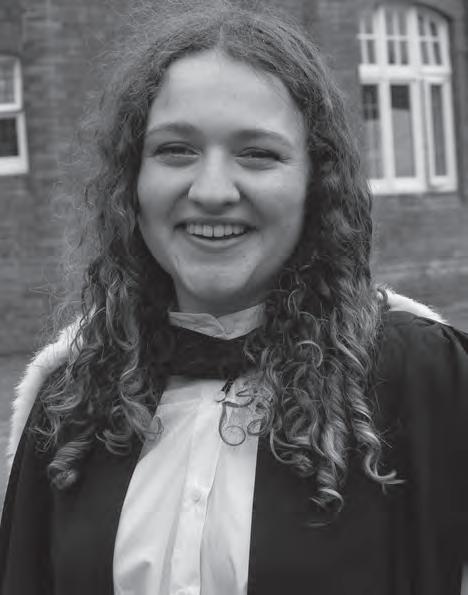


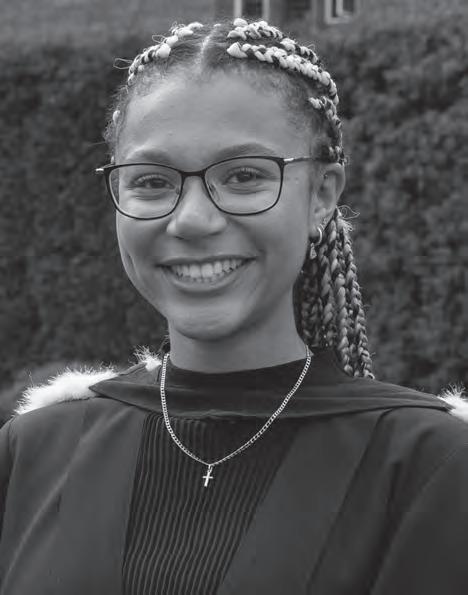
Barbara Wrigley Prize : H Skye for her poem ‘May is a promise’ Hammond Science Communication Prize : C Ou (Judges’ Prize), F Twarowski (Runnerup), S Morine (Audience Prize and Abstract Prize), C Owen (Pathology Prize) Humanities Writing Prize : F Websper and S Woolley (Joint First Prize), L Strathern (Third Prize), P Collins, J Dolby, G Epstein-Lightman (Highly Commended) Jane Martin Poetry Prize : Luke Dunn (First Prize) for ‘Saltwater’ and Neva Ensminger (Second Prize) for ‘Please remind my mother it's not my fault’ and ‘my sister and i in genesis’ Mountford Arts and Humanities Communication Prize : H Abdelatti and I McLeod (Joint Judges’ Prize), A Harrison (Lawrence Room Prize), I McLeod (Audience Prize), H Abdelatti (Abstract Prize) Ridding Reading Prize : J Hanlon (Overall Prize), M Karinatan (Judges’ Prize), G Rajesh (Audience Prize) Rima Alamuddin Prize : J Hitchcock for the poem ‘Resorting to translation’ Tom Mansfield Memorial Prizes : I Benson and B Chan
Postgraduate Research Awards: A Gurney and Rhona Beare Scholarship: A Bastinelli
Anne & Caroline Wilson Scholarship: E Nott Chan & Mok Scholarship: C Y Fu
Doris Russell Scholarship: R Jamieson
Doris Woodall Studentship and J E Cairnes Scholarship: A Banerjee Elizabeth Stribling Award: P Desikan G M Gardner Scholarship: D Salmoiraghi Irene Hallinan Scholarship and Ruth Whaley Scholarship: S Lieblein Maria Luisa de Sanchez Scholarship and M T Meyer Scholarship: A Maris Natera M Lambrinudi Scholarship: E Watson M T Meyer Scholarship: J Davies
Pamela Thayer Scholarship: P Savery
Pfeiffer Scholarship: Z Huang Rosalie
Crawford Scholarship : R Armitage
Rosalie Crawford Scholarship and Diane Worzala Award: R Demchuck The Girton Singapore Scholarship: C C Hsu
Partner-Funded Postgraduate Research Awards: Cambridge International &
Dinah James Girton Studentship: S Choudhury Cambridge Opportunity
Master’s & Rosalie Crawford Girton Studentship: C Hammenga, J Napper, A Widdicombe, R Williams Cambridge Trust & Hong Kong Girton Studentship : S Y Ng Cambridge Trust & Joyce
Biddle Girton Studentship: T Crean
Cambridge Trust & Rosalie Crawford Girton Studentship: J Naish Chemistry Department, Cambridge Trust & Girton
Singapore Studentship: B Choy ESRC
DTP Studentship & Rosalie Crawford Girton Studentship: K Piccin Hebrew Studies, Cambridge Trust & Ida and Isidore Cohen Girton Studentship: L Völk NIAB, Cambridge Trust & Rosalie
Crawford Girton Studentship: A Damm
OOC AHRC DTP & Pamela Tayer Girton Studentship: J Gautron Rowan Williams Cambridge & Rosalie Crawford Girton Studentship: D Romero, I Vlasiuk ViceChancellor's & Rosalie Crawford Girton
PhD Studentship: E Campbell-Rowntree
Postgraduate Scholarships: 2023 – 24
Alice Violet Jenkinson : O Lewis (Theoretical Physics), G Ortame (Astrophysics), J Skelton (Theoretical Physics) Emily Davies (Health, Medicine and Society): A Kanan, H Murphy Lilias Sophia Ashworth Hallett (Law): E Gluer, E Watson Mary Higgins (Corporate Law): R Chan M T Meyer (Mathematics): Z Gao, L Lukačević, A Maris Natera, D Tsarev
2022 – 23 Emily Davies: D C Aguilar Yáñez (Criminology), C Beynon (History and Philosophy of Science and Medicine), M Clement (Classics), P Córdova Zelinski (Comparative European Literatures and Cultures), R Davies (Physical Sciences: Nanoscience and Nanotechnology), A Devaprasad (Criminology), C Doyle (Basic and Translational Neuroscience), E-K Eustratiou (Management), A Grigsby (Social Anthropology), M Harms (AngloSaxon, Norse and Celtic), J Hartmann (Advanced Computer Science), O Hawkins (Micro and Nanotechnology Enterprise), G Hunt (Developmental Studies), J Isacowitz (Engineering for Sustainable Development), Y C Kahyaoglu (Philosophy), W Kok
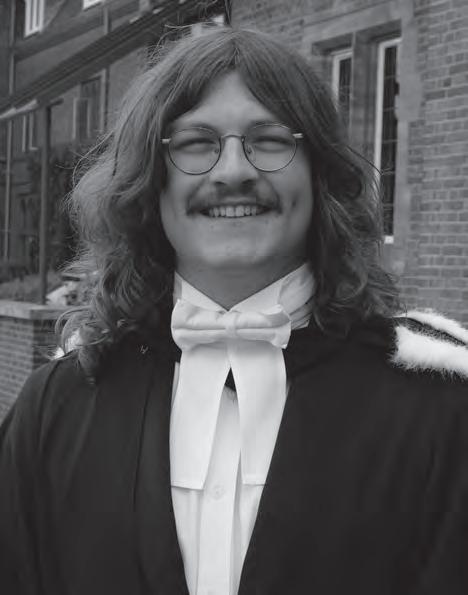

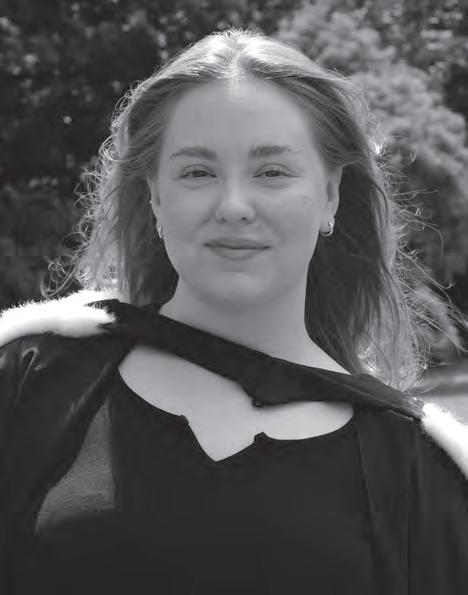

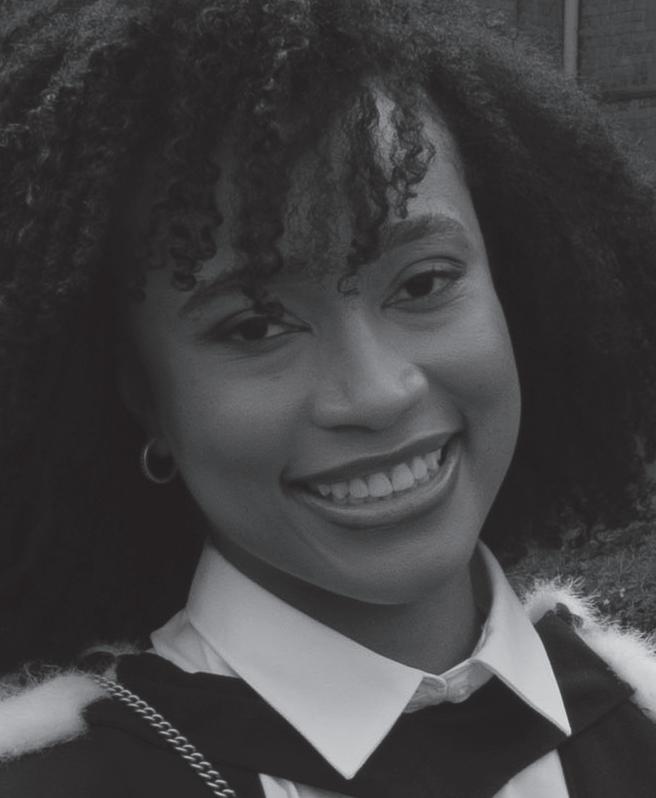
Finalist Scholarships: Alice Violet
Jenkinson (Natural Sciences): J Werner
Angela Dunn-Gardner: G Aston (Philosophy), M Averof (Human, Social and Political Sciences), C Chen (Psychology and Behavioural Sciences)
First Class Prizes (Finalists ranked in the top 25% of the First Class) Charity Reeves (English): M Crawford Gertrude Mather Jackson (Mathematics): M Nicholson
Janet Chamberlain (Geography): K Biggs
Awards (Economics), I Levy (Genomic Medicine), Z Li (Advanced Computer Science), J Lush (Classics), C Manley (Comparative European Literatures and Cultures), J Martin (English), A Morgan (English), J Nemer (Education, Globalisation and International Development), T Palmer (Classics), V Panagiotaropoulou (Criminology), D Pistner (Criminology), P Savery (English), C Sheeran (Basic and Translational Neuroscience), A Smail (Genomic Medicine), E Sosa El Fakih (Social Anthropology), K Sultanov (English), P Xu (Biotechnology), Z Yang (History and Philosophy of Science and Medicine), C Zhang (Education), P Zheng (Physical Sciences: Environmental Data Science)
Edith Lydia Johns (Natural Sciences): S Huang Emily Davies: J Brabin (Natural Sciences), W De Jonghe (Natural Sciences), A Dray (Natural Sciences), L Kesterton (Anglo-Saxon, Norse and Celtic), W Matthews (Anglo-Saxon, Norse and Celtic) Florence Ethel Gwyn (History): A Simmonds John Bowyer Buckley: C Forrest (Natural Sciences), A Khan (Clinical Medicine), A Kisat (Clinical Medicine), I Metcalfe (Natural Sciences), S Nayak (Natural Sciences), G Nishimura (Clinical Medicine), C Ramsay (Natural Sciences) Lilias Sophia Ashworth Hallett (Law) : C Coleman Maria Degani (Italian) : O GibsonWatt, C Lussiana, K McGreevy Mary Higgins (Law) : W Magalhaes Mary Sparke (Archaeology) : A Perrins, I Rennie, E Suckling M T Meyer (Mathematics) : C Clarke, M Nicholson, A Pietraszkiewicz, L Wilkinson Russell Gurney (History) : J Hanlon Sir Arthur Arnold : K Bawa-hellens (English), K Biggs Williams (Geography), E Carden (Architecture), L Court 2 (English), E Hall (Architecture), A Mukherjee (Economics), K Taylor-Powell (Geography), A Valentine (Geography), M Wright (Economics) Sir Francis Goldsmid (Manufacturing Engineering) : P Jiang, J Slimmon Sophia Turle : M Crawford (English), E Hain (Theology, Religion and Philosophy of Religion)
Todd Memorial (Modern and Medieval Languages) : R Nolten
Finalist Prizes: Senior College Prizes 2023 — 24 Thérèse Montefiore Prize: K Taylor-Powell (Geography) Laurie Hart Prize: K Biggs Williams (Geography)
Director of Studies Prize for Outstanding Achievement: N Go (Natural Sciences) Tutors’ Prize: M H Lone (Law)
2022 — 23 Thérèse Montefiore Prize: H Goolnik (Geography) Laurie Hart Prize: W Gilchrist (Economics) Tutors’ Prize: Z Copeland-Greene (Classics)
Williams Marion Bidder (Natural Sciences (Biological): C Forrest Mary Arden (Law): C Coleman May Smithells (Mathematics): C Clarke, A Pietraszkiewicz Thomas & Elizabeth Walton (Law): W Magalhaes
Achievement Awards (Finalists ranked in the top 10% of the Upper Second Class)
Ellen Delf-Smith (Natural Sciences): S Weersing Ida Freund (Natural Sciences): A Swarup Gwendolen Crewdson (Natural Sciences): K Robinson Lilian Knowles (Economics): B Lu Margaret Hastings (Law): R Misra Marion Bidder (Natural Sciences): A Davies
Undergraduate Scholarships: Alice Violet Jenkinson (Natural Sciences (Physical)): G Bernardi, M Budd, M Cespa, A Gibbon, Z McGuire, F Peake, L Pertl, W Royce, A Tu, H Zhang Amelia Gurney (Classics): J Hitchcock Edith Lydia Johns: J Lee (Medical Sciences), H Wells (Veterinary Sciences) Emily Davies: O Martyniuk (Anglo-Saxon, Norse and Celtic), K Sin (Psychological and Behavioural Sciences) Florence Ethel Gwyn (History): S Belz, L Brooke Henry Tomkinson: P Bowater (Manufacturing Engineering), N Coombs (Land Economy) Jane Agnes Chessar (Classics): L Quentin Jean Hunter (Modern and Medieval Languages): H Brand, F Ellis, L Howes, N Miller, I Richards John Bowyer Buckley: N Go (Natural Sciences (Biological)), S Huang (Natural Sciences (Biological)), M Mak (Medical Sciences) Mary Graham (Asian and Middle Eastern Studies): J White Mary Sparke (Archaeology): A Harrison, E Koral M T Meyer (Mathematics): T Cross-Zamirski, J Hickingbotham, M Stear Rosalind, Lady Carlisle (History and Modern Languages): J Butler-Cole Russell Gurney (History): R Morley Sir Arthur Arnold: J Aw (Economics), T Coates (Economics), V Rikunov (Economics), P Santarius (Geography) Sir Francis Goldsmid (Engineering): L Bolam, K Dai, O Flavin, Z He, K Shah, T Treutenaere Sophia Turle: E Clare-Hunt (Music),
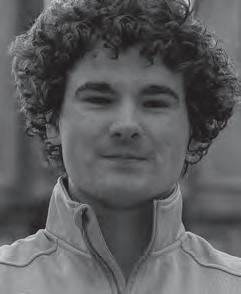
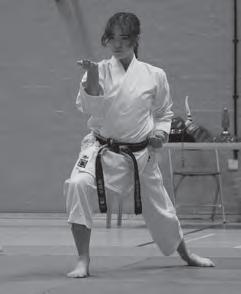


H Cruft (English), F di Castiglione (Theology, Religion and Philosophy of Religion), I McLeod (English), D Sandell (Music), E Sharkley (English) William Menzies (Classics): H Mauldridge
Undergraduate Prizes: First Class Prizes (Undergraduate examination candidates ranked in the top 25% of the First Class)
Alice Zimmern (Classics): J Hitchcock Appleton Cup (Medical Sciences): M Mak
Christina Barnard (Anglo-Saxon, Norse and Celtic Studies): O Martyniuk Edith Neal (Natural Sciences (Biological)): N Go Eileen Alexander (English): E Sharkey
Elizabeth Hill (Modern and Medieval Languages): H Brand Gwendolen Crewdson (Natural Sciences (Physical)): J Werner Layla Adib (Natural Sciences (Physical)): G Bernardi Phyllis Tillyard (Music): D Sandell Rajalakshmi Madabhushi (Engineering): O Flavin Satyanarayana
Madabhushi (Engineering): Z He
College Music Scholarship : L Armitage (trumpet) London Girton Association Award: G Kennedy (piano) Daphne
Bird College Instrumental Awards: R Armitage (trumpet), E CampbellRowntree (harpsichord and piano), I Chan (cello), J de Souza-Brazil (cello), I Graham (viola), C Howdle (violin), M Lowe (harpsichord), L Salazar Gómez (piano), M Scrivener (piano), A Titcombe (piano) Organ Scholarships: G Kennedy, B Nolan University Choral Awards : G Burford, E Clare-Hunt, P Dawid, C Falls, E Hooper, S Kileff, M Lowe, H Mauldridge, G Nickson, O Napier, J Richards, D Sandell, M Scrivener, F Sutaria, S Vasieva, University Instrumental Awards : L Armitage (trumpet), R Armitage (trumpet), C Howdle (violin) Siem Music Prize: D Sandell
Adela Marion Adam: J Hanlon Charlotte Rycroft: A Corlett, A McMullan Sidney and Marguerite Cody (Postgraduate): E McCaffrey, Z Coady College Travel Award: G Bernardi, D Sandell, M Wright Dorothy Chadwick: L Howes, J
Whiteley Dorothy Tempest: A Bates, S Nayak Edith Helen Major: H Maddock, C O’Kane, R Sail, J Thompson, C Yang
Eileen Ellenbogen: A Perrins E M and F A Kirkpatrick: J Whiteley E M Pooley: D Hobbs Harry Barkley (Clinical Medicine
Electives): N Carter, B Davison, C Howdle, A John, C O’Hara, M Wickramarachchi J K Brightwell: N Chandra Bose, C Clelland, R Croft, F di Castiglione Judith Eccleshare: A Dray, I McLeod, I Metcalfe, A Reale, A Treasure K J Baker: S Allen, B Harnett, K Spurlock Kythe Waldram: R Pettifer Marina Shakich: E Honey Marion Blackwell Hird (MML): C Falls, N Miller, L Prince, O Thornton Mary Morrison: V Filip, I Hammond, A Harris, P Jackson
Monica Wilson: A Kennedy, E Sparrow
Rosemary Delbridge: C Thomas Ruth Morgan (MML): N Brauer-Maxiaea, M Guha, D Hobbs, L Howes, L Prince, C Williams Sheila Lesley (Law): H Abdelatti, D Frandsen, A Harris, J Magomba, A Ngai Sheila Spire: A Bastianelli
Diana Lees-Jones Sports Award: J Homann, H Murphy, L Nagy Joan M McGrath Sports Award: G Langley, C Weatherhogg Robin Sports Award: A Corlett, E Honey, P Santarius Archery: P Dolan Athletics: O Aneju, S Weersing Badminton: R Meng Basketball (Men’s): L Howes, L Lukačević, O E Oyewole Basketball (Women’s): N Go Cricket: G Langley Cross Country: Z Heaney Brufal de Melgarejo Dancesport: C Forrest Eton Fives: E Collinson Equestrian: L Hinde Football (Men’s): B Cohen, J Hickingbotham, R Linney Karate: M Darmon Gymnastics: A Strait Hockey (Women’s): C Haspel, C Lord, Z Wedgewood Judo: J Homann Lacrosse (Women’s): R Wald Mixed Martial Arts: J Vasireddy Rowing: H Murphy Rugby Union (Women’s): C Weatherhogg Rugby League (Men’s): M Eckes, E Hall, L Tedesco Rugby League (Women’s): C Haspel Shooting: P Santarius Swimming: I Chadwick, N Go, A Wignall, A Woolley
Target Rifle: L Nagy Tennis: D Mentiply, L Trepanier, R Wald Triathlon: A Corlett, A McMullan Water Polo: A Corlett, E Honey, L Sutherland.
When BBC Radio 4’s Woman’s Hour celebrated its 75th birthday on 7 October 2021, they got wind of the fact that the original Producer of the first-ever episode of the programme in 1946 was still alive. At the age of 104, ‘the incredible Diana Gayford’ was interviewed by presenter Emma Barnett for a special anniversary edition, which proved such a hit with listeners that it was selected for rebroadcast on Pick of the Week
My mother Joan Diana Wilson was born on 15 January 1917, the daughter of Maurice Wilson, a doctor, and his wife Aileen. Because of the First World War, she saw her father for the first time only on her third birthday when he returned home from service in the Middle East, with an MC. She began her education in the village hall at Stone in Staffordshire with four other girls and a governess, but at 11 she was sent to Cheltenham Ladies’ College where she thrived. Being strong academically she won a place at Girton and matriculated in 1936 to read English. ‘I had a pretty hectic social life, fell in love for the first time and managed to get a degree in spite of that!’ she recalled. She also felt that it prepared her for what was to come, as within three months of leaving, the Second World War began.
Volunteering as a nurse, Diana fell in love with a trainee bomber pilot. When he was killed on a raid over Berlin it was a devastating blow and, on the rebound, she made a disastrous but short-lived marriage to another man. In 1941 she joined the Auxiliary Territorial Service (ATS) and was commissioned as a Second Lieutenant, working in training and education for the Army Bureau of Current Affairs (ABCA) whose work was intended to improve political engagement and understanding of the war among servicemen and women through discussion groups, pamphlets and displays. As the war progressed issues of post-war reconstruction, social justice and nationalisation came to the fore among attendees. Diana travelled all over the country for ABCA, becoming the youngest Major in the ATS, spending much of her spare time, particularly the early years of the war, writing to parents of friends who had been killed. She returned one evening after an ABCA trip to discover her flat in Regent’s Park had been reduced to a pile of rubble.

(1917 – 2023)

Words: Bob Gayford
Aged 80, Diana fearlessly moved to Chelsea where she threw herself into all the culture which London had to offer. When the invitation from Radio 4 came in 2021, she spoke with great clarity and amazing recall.
At the beginning of 1945, aged 28, Diana was posted to Scottish Command HQ in Edinburgh in charge of all ATS Education in Scotland. It was during her work there that she met her future husband Dudley Gayford. Once demobbed she got a job at the BBC as a Talks Producer for which her ABCA experience proved ideal. Mostly she worked on the Home Service’s new programme for its female listeners, Woman’s Hour. The format was a series of short, live talks, with 15 minutes at the end for a story. She was responsible for finding speakers, editing their scripts, conducting sound tests and rehearsals and putting on the show.
Initially the programme concentrated on domestic matters for women at home –cooking, hairdressing, fashion and childcare. However, Diana was at the forefront of a group at the BBC who realised that women’s horizons had broadened as a result of the war and, in the face of intense opposition, she began to include talks about careers and appropriate part-time jobs (including the fitting and selling of corsets and bras). Her talks also covered simple economics which led to a complaint from Conservative Central Office of left-wing bias in the programme, when only a Labour speaker could be found. Her greatest excitement came when she managed to obtain Eleanor Roosevelt as a speaker. Woman’s Hour was a great success. ‘There is nothing women are not interested in’ she told Emma Barnett in 2021, though of the word ‘feminist’ she declared: ‘women can do things without being backed by a label’.
She married Dudley in 1947. Nine months later they moved to Germany at the request of the British government so that Dudley could help re-establish the German leather trade and Diana’s budding radio career came to an end, much to her regret. Bob was born there (Diana having been provided with a revolver while pregnant, as well as a policewoman escort in difficult, post-war Cologne). The family returned to the UK in the early 1950s and Diana settled into domesticity first in London and then in Formby, Lancashire. Nevertheless, she undertook O-Level examination marking and inspections for the University of London, became involved with the local council, and was a magistrate for 20 years. After she was widowed in 1972 (Dudley was 16 years older than her), golf, bridge and world travel featured increasingly in her later life as well as devotion to her grandchildren (and eventually a great-grandchild).
Aged 80, Diana fearlessly moved to Chelsea where she threw herself into all the culture which London had to offer. When the invitation from Radio 4 came in 2021, she spoke with great clarity and amazing recall. She lived in her own flat with limited assistance until five weeks before she died, and was still using her laptop right to the end. Her memorial service took place on what would have been her 107th birthday and Woman’s Hour featured a short but heartfelt tribute to her.
Elizabeth Jeffreys was an academic specialising in the literature, culture and history of the Byzantine Empire, from the 4th century to 1453 and beyond. She held the Bywater and Sotheby Professorship of Byzantine and Modern Greek language and literature at the University of Oxford from 1996 to 2006 and was a Fellow of Exeter College. Her distinctive scholarly contributions were admirably matched by her energy and purposefulness in the promotion of her subject, nationally and internationally.
Elizabeth Mary Brown attended Blackheath High School for Girls, before coming up to Girton in 1960 to read Classics. Already in her undergraduate years, her intellectual curiosity led her to attend lectures on Byzantine romances. After graduating she proceeded to Oxford to take a BLitt; her thesis was a comparative study of medieval French and Greek romances. While she was at Oxford, she attended classes to extend her knowledge of Modern Greek, thus setting the scene for her later career.
In 1965 she followed, one might think, a more traditional path: she married Michael Jeffreys, whom she had met when he was an undergraduate at Peterhouse, and took up a post as a classics teacher at Mary Datchelor School in London. The latter occupied her for only a few years, but her marital – and professional – partnership with Michael lasted for the rest of her life. She was appointed a senior resident fellow at the Warburg Institute in 1969 and began to identify herself as a Byzantinist, initially continuing her study of the romance genre, to which she regularly returned. One of the early fruits of her research was a seminal article she published jointly with Michael in 1971 in the journal Byzantion: ‘Imberios and Margarona: the manuscripts, sources and edition of a Byzantine verse romance’.
Research continued, for both of them, supported by fellowships at Dumbarton Oaks, the pre-eminent centre for research in Byzantine Studies, located in Washington DC, and then at the University of Ioannina in Greece. In 1976 an even bigger upheaval occurred in their lives: Michael was appointed to a lectureship at the University of Sydney and they relocated to Australia, together with their daughter Katharine, who had been born while they were at Dumbarton Oaks. Elizabeth linked up with the few other Byzantinists in Australia and they began to consider forming some kind of group. In 1978 she was appointed to a visiting fellowship at the Humanities Research Centre of the Australian National University, which gave her a springboard to promote her plans. Together with Michael and another colleague, she organised the first Australian Byzantine Studies Conference in Canberra. Its success led not only to the publication of the papers, edited by the trio, as the first volume of a new series, Byzantina Australiensia, but also to the formation of an Australian Association, affiliated to the international committee for Byzantine Studies. During this period she also co-ordinated an ambitious research project on the 6th-century chronicle of John Malalas, which resulted in a translation of the text with commentary (published 1986). A separate volume of related studies would appear in 1990. Elizabeth was the lead author of both volumes.

(1941 – 2023)

Words: David Holton
Elizabeth was a scholar of the highest calibre, but not of the ivory tower variety... an excellent collaborator, totally reliable, committed and collegial'.
It is widely acknowledged that the rapid growth of Byzantine Studies in Australia would not have happened without Elizabeth’s inspiring energy and Michael’s enthusiastic support. He would soon (in 1983) be elected to the newly established Chair of Modern Greek at Sydney, which imposed new loyalties and obligations. Elizabeth’s research continued to flourish. Following on from the ANU fellowship there were further posts at the Universities of Melbourne (1987–89) and Sydney (senior resident fellow, 1990–95), along with a series of teaching commitments. She had turned her attention to two of the lengthiest texts in latemedieval Greek vernacular literature. The first was the subject of a long-standing (and long-distance) collaboration with Manolis Papathomopoulos, whom she had known since her time in Ioannina: a Greek verse adaptation of the Roman de Troie, extending to over 14,000 lines. Their critical edition – the first ever – was published in 1996. In a recent article (2017) she argued persuasively that the Greek version was produced in the Frankish Peloponnese between 1267 and 1281, almost a century earlier than previously thought. The second big text was the Byzantine epic-romance of Digenis Akritis. She edited two widely differing versions of the romance, with facing translations (CUP 1998) – no mean achievement, given the linguistic and textual difficulties.
By this time Elizabeth had taken up residence in Oxford, although Michael continued to occupy his Sydney chair for a further four years and they met only during vacations. Her election to the Oxford chair had been greeted with some surprise: she had never held a tenured university post and she lacked a PhD. Her explanation for the latter was that a doctorate was not seen as the normal next step in the 1960s when she began her research career. It was undoubtedly an inspired appointment. Her activities far exceeded what was (or used to be) expected of the holder of a named chair. She taught intensively, organised seminars and conferences (notably as co-organiser of the 21st International Congress of Byzantine Studies held in London in 2006), chaired professional bodies, edited conference proceedings and collective volumes, and so on. She never shied away from tasks that might be seen as onerous or less creditworthy, such as book reviews or research surveys, translation of key texts (her Four Byzantine Novels inaugurated a new series), or assembling and editing papers for a Festschrift, as she did for the doyen of Byzantinists, Sir Steven Runciman. If she thought a job would benefit students or scholars, she did not hesitate to take it on. She also served as Sub-Rector of Exeter College from 1997 to 1999.
After her retirement in 2006 Elizabeth simply carried on with her research. She held a Leverhulme Emeritus Fellowship in 2008–9, continuing to work on the 12th-century court poetry attributed to Manganeios Prodromos. She co-edited the authoritative Oxford Handbook of Byzantine Studies (2008), described by one reviewer as ‘a magnificent work which will be an invaluable help to all students of Byzantium’, and maintained a steady output of articles on subjects covering a broad chronological and thematic spread. Honours naturally came her way: she was a Fellow of the Australian Academy of the Humanities and an Honorary Fellow of St Anne’s College, Oxford. Two Festschrift volumes were dedicated jointly to her and Michael, one in Australia and a massive one in the UK.
Elizabeth was a scholar of the highest calibre, but not of the ivory tower variety. Nor was she one for vanity projects. The prefix ‘co-’ occurs often in her list of publications because she was such an excellent collaborator, totally reliable, committed and collegial. She was a good friend to many in many countries: kind, thoughtful and hospitable are the epithets that come to mind. But she could be tough when a principle was at stake and she had a developed sense of duty, as well as a passion for her subject, to which her life’s work has contributed so much of lasting value.
Brian wore his academic success lightly; one supervisor mentioned that on meeting Brian for the first time he seemed nonchalant, so was pleasantly surprised to find that his essays were ‘very, very, very good’!
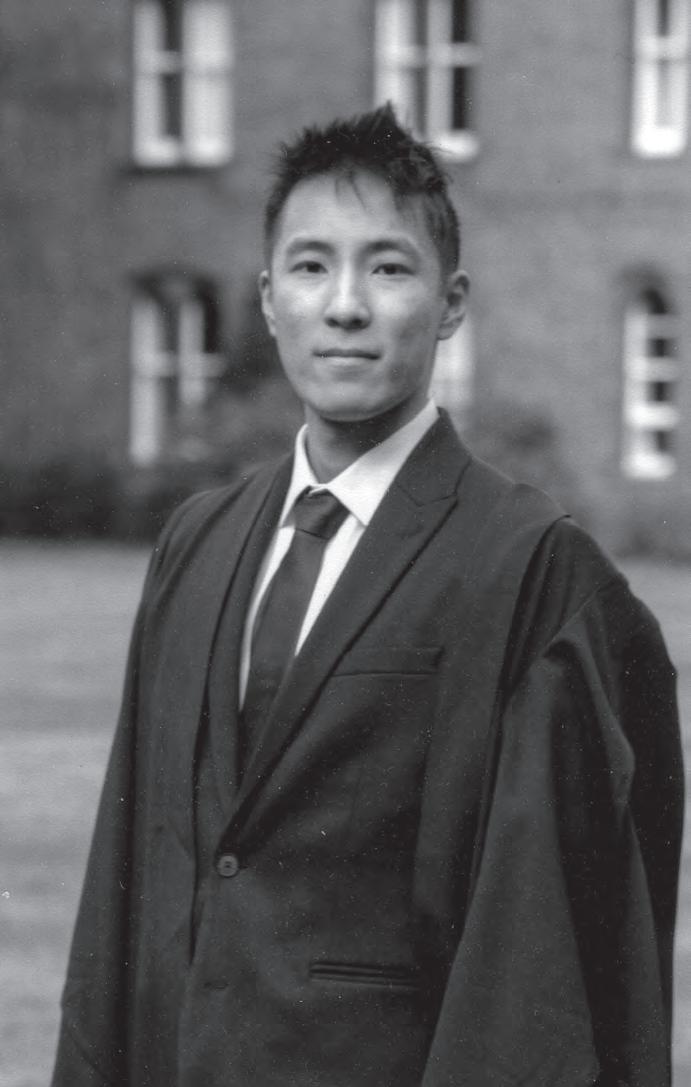
Obituaries
(2000 – 2023)
Brian Lee arrived at Girton in October 2020 to study for the Veterinary Sciences Tripos, one of the freshers whose first year was impacted by lockdowns, remote study and restricted movement due to Covid-19. Nevertheless, Brian settled in well, both in his studies and at Girton, of which he was proud to be a member.
I served as Brian’s Tutor and always enjoyed talking to him. During that first year marked by isolation, he would regularly drop in to my online office hour for a quick chat; I found him to be mature and thoughtful, with a wry sense of humour. As we moved out of pandemic restrictions during 2021 and into 2022, Brian was able to enjoy more of the opportunities to be found in Cambridge. Although he took up judo only in his second year of studies, Brian nonetheless still found the courage to compete in a semi-varsity match against much more experienced opponents! He also found love at Girton in the form of Lily, another vet student in his cohort.
Brian excelled in his academic work. His supervisors noted that he was intelligent, engaged and well prepared for classes. Brian wore his academic success lightly; one supervisor mentioned that on meeting Brian for the first time he seemed nonchalant, so was pleasantly surprised to find that his essays were ‘very, very, very good’!
Brian had sat his A-levels and applied to Cambridge a year later than his peers because of extensive treatment for cancer which had been diagnosed when he was 17 years old. Unfortunately, the cancer returned in 2022, as Brian was nearing the end of his second year of studies. Despite the setback, Brian remained fiercely committed to his academic work, switching during the academic year 2022–23 to the Part II Natural Sciences Tripos, where he could pursue an interest in Biological and Biomedical Sciences whilst undergoing treatment. Although his health was failing, meaning that he had to rely on use of a wheelchair, Brian graduated at Senate House with his cohort in late June 2023. Sadly, he died four weeks later.
In collaboration with Lily, in January 2024 a small candlelit memorial event for College members and Brian’s family was held in the College’s new sensory garden. A newly planted climbing rose, Rosa Ghislaine de Féligonde, was dedicated to this brave and extraordinary young man. We look forward to seeing it grow and bloom.
She also wrote several books about London livery companies which resulted in her being given the Freedom of the City of London in 2012: she was delighted with this recognition of her dedication and love for her subject.
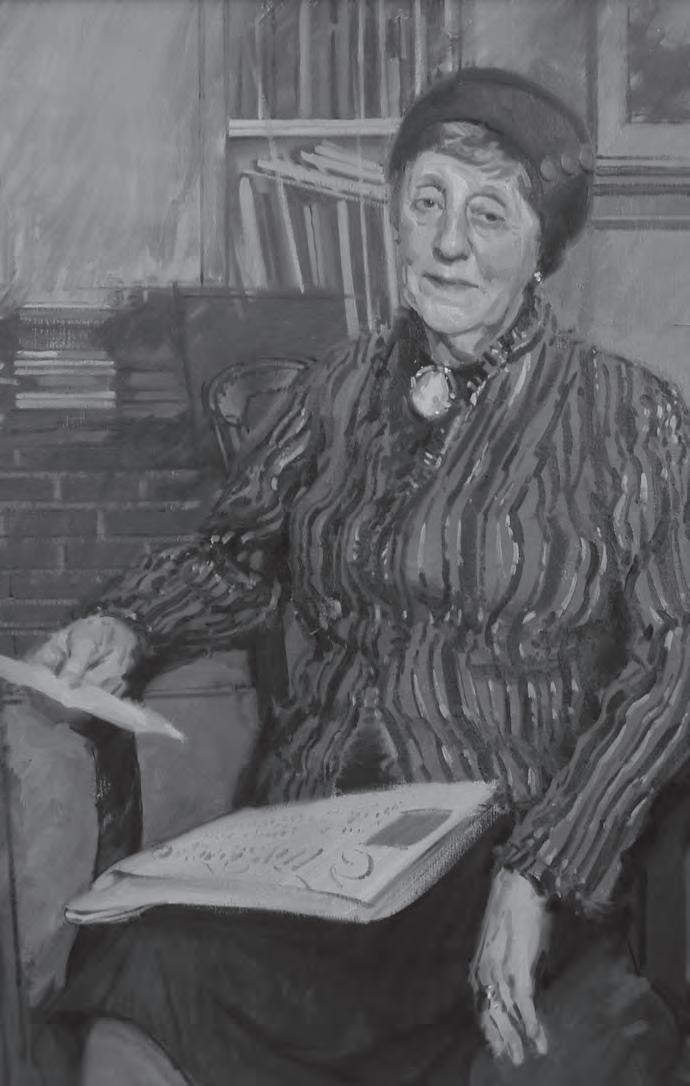
(1930 – 2023)
Obituaries
Portrait by: Andrew
Words: Hilary Goy (1968 Classics)
Barbara’s career is well known to many of her generation: a pupil at Lady Eleanor Holles School, Hampton; a history student at Girton; a historical researcher, teacher, school inspector and author. In her retirement she was active in U3A Cambridge, the Heraldry Society, the Cambridge Society, Soroptomists International, the local National Trust and the Cambridge Local Girton Association. I am sure this list is not exhaustive.
Barbara was born in January 1930, the daughter of Dr Norman Megson, a scientific civil servant and his wife Gladys, a teacher. She came up to Girton in 1948, just as women were first granted the right to graduate from Cambridge, and she recalled in later life ‘that glorious autumn day when the Queen Mother became the first women to receive a Cambridge degree.’ She remembered the birth of King Charles III too, also in her first term, which was celebrated that night with a toast in College. In a later age, she might have gone on to postgraduate study in History, but instead she became the London-based research assistant of a Harvard professor, then had a stint as a cataloguer for the Picture Post image library. She followed this with a career in education but with history always her main hobby and leisure occupation.
I knew Barbara in her retirement when she moved to Cambridge and tackled her many interests with zeal and consummate organisation and professionalism. As Chair of the Cambridge Local Girton Association she was full of plans and ideas, notably to trace the lives of the ‘lost generation’ of students who were at Girton between 1939 and 1945. The Second World War had interrupted information-gathering with the result that their entries in the Girton Register were pitifully short. Barbara braved the College Council to gain permission to start research on these students as quickly as possible as there were obituaries appearing with frightening regularity. She roped me into the project and we sent out a questionnaire which she called an ‘aide-mémoire’, and awaited replies.
The information gained was fascinating as Girtonians had taken part in all kinds of enterprises particularly during the war. At the conclusion of our work, a lunch was held in the College for contributors. Barbara gave a splendid speech which was greeted with a rousing cheer especially from the Bletchley Park brigade, reunited after many years, their vital contribution at last acknowledged after a long embargo. In 2009, the first volume of The Girton Project Journal, ‘Girtonians and the World Wars’, was published with reminiscences from those ‘aide-mémoire’. This has recently provided material for the History Tripos topic ‘Women in Cambridge, 1900-1950’.
Books, whether Barbara was writing or reading them, were always at the centre of her life. She co-authored Children in Distress (Penguin, 1968), with Alec Clegg, Chief Education Officer of the West Riding, a book which was subsequently used in University teaching, and English Homes and Housekeeping: 1700–1960 (Routledge and Kegan Paul, 1968). She also wrote several books about London livery companies which resulted in her being given the Freedom of the City of London in 2012: she was delighted with this recognition of her dedication and love for her subject. But for us Girtonians, her most memorable work is Girton College, 1869–1959: An Informal History (Heffer, 1961) written with Jean Lindsay, Girton History Fellow.
In addition to her many scholarly interests, Barbara was a keen collector of antiques, as the silver she gave to the College attests. In 2009 she successfully bid at a Girton charity fundraising auction to be painted by the renowned artist Andrew Festing RP. His portrait of her shows the elegant, intelligent gaze of a proud Girtonian. She also appreciated fine food and wine as well as a good joke. On one occasion she took me to her London club, the Athenaeum. As we entered I said, ‘How amazed my father would have been to see me here.’ Barbara replied, ‘So would mine.’
Collectively, her body of work stands as a trailblazing modern engagement with Indian traditions which did much to disseminate its culture with care, respect and a committed refusal to rely on overused, outdated stereotypes.
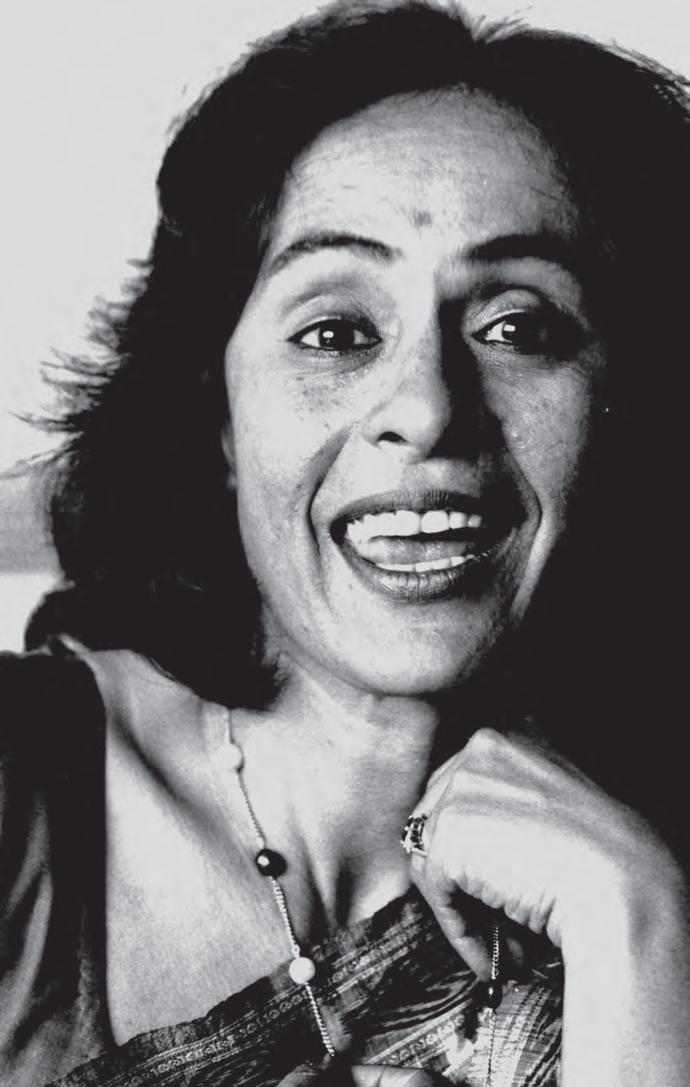
(1943 – 2023)
Words: James Riley, Official Fellow
After graduating from Girton with a degree in English Literature, Gita Mehta spent the remainder of the 1960s working in television production. In the early 1970s she became a war correspondent for NBC and gained acclaim for her coverage of the Bangladesh Liberation War, reportage which resulted in the well-received documentary Dateline Bangladesh (1971). Following this, Mehta continued to work in journalism, regularly writing on India and Indian politics for the New York Times and many other publications. In this respect she was continuing the work of her father, the Indian politician and independence activist Biju Patnaik. In 1979, she established herself as an author with the publication of her first book and the one for which she remains best known, Karma Cola Carrying the subtitle ‘Marketing the Mystic East’, Karma Cola was an incisive, witty take on the spiritual revolution of the 1970s that saw westerners in their droves head out to India in search of enlightenment at the feet of various ‘gurus’. The ‘hippy trail’ as it was known, had been in full flow since the late 1960s, with more adventurous travellers in the 1950s making their way to the likes of the Sri Aurobindo Ashram in Pondicherry, South India. It was the later success of Ram Dass’s book, Be Here Now (1971), however, that generated considerable western interest in yoga, Hinduism and Indian spirituality more generally. Ram Dass, born Richard Alpert, was a colleague of Timothy Leary at Harvard before he travelled to India in 1967 to work with the teacher Neeb Karori Baba. His book was intended as a practical guide, but it also further embellished the trope of the western spiritual ‘seeker’, those who look to the ancient ‘East’ as a romantic territory in which they can somehow find themselves. It was this trend that Mehta set out to critique. Unlike essays like Tom Wolfe’s ‘The "Me" Decade’ (1976), Karma Cola was not so much disparaging of a newfound public interest in spirituality, but rather its exploitation and marketisation as a ‘lifestyle’. In this way, Karma Cola echoed some of the thinking of Edward Said’s Orientalism (1978) insofar as its criticism was reserved for the commodification of Indian spirituality, the way the west sought to package and re-sell the east and its religious practices.
Speaking to India Today in 1980, Mehta gave a typically 1970s account of the book’s genesis. She was at a ‘cocktail party’, most likely in New York, one of the many functions, soirées and gatherings she would attend and host along with her husband, Sonny Mehta, who would, by 1987, become Editor-in-Chief at Alfred A. Knopf. Mehta describes how at this particular mid-1970s party, ‘a guy grabs hold of my sari, pulls me in and says, “Now here’s the girl who’s going to tell us what Karma is all about.”’ Replying to this, at best condescending at worst nigh-on harassing, gesture, Mehta said ‘Karma isn’t what it’s cracked up to be.’ Impressed, the guest told her she had the makings of a book. As Mehta tells it, he turned out to be a publisher, the President of Bantam Books.
Karma Cola was an international success. Mehta went on to cement her reputation as an author with the historical fiction Raj (1989), the short story collection A River Sutra (1993), the essay volume Snakes and Ladders (1997) and the cultural study Eternal Ganesha (2006). Collectively, her body of work stands as a trailblazing modern engagement with Indian traditions which did much to disseminate its culture with care, respect and a committed refusal to rely on overused, outdated stereotypes.
Edith Mary Smallwood, Professor of Romano-Jewish History, was born on 8 December 1919 to Frank Smallwood, senior master of Godalming Grammar School and his wife Edith.
From early childhood, it was recognised that Mary was exceptionally bright. She attended the Mary Datchelor School for girls in Camberwell, where she excelled in her studies and where she became fascinated by Latin, Greek and ancient history. In 1939 she came up to Girton College on a Mary Gurney scholarship. She earned a double first in Classics, as well as distinction in Greek verse composition in Part I of the Classical Tripos, only the second woman ever to have reached that level. She graduated with distinction and a number of prizes in 1942.
After completing the Cambridge Teacher’s Diploma in 1943, she taught for four terms at the Alice Ottley school in Worcester, which was a challenging experience, and then for five terms as a temporary assistant lecturer at Liverpool University. In 1946, she returned to Girton to do research and was the holder of various scholarships, including the University’s Craven Studentship. In 1948 she became Katharine Jex-Blake Research Fellow at Girton, completing her PhD in 1951. Her thesis was on political relations between Jews and Romans from Pompey to Constantine, 63 BC to AD 312, which later she rewrote and published as The Jews Under Roman Rule (Brill, 1976, second edition 1981).
Additionally, Mary wrote a number of articles for scholarly journals; contributed to some composite works; and wrote two books for teachers and students − each with a collection of some 400 documents (inscriptions, coin legends and papyri) for the reigns of (Gaius) Caligula, Claudius and Nero in the first book (published in 1966) and for the reigns of Nerva, Trojan and Hadrian in the second (published in 1967); revised Geoffrey A. Williamson’s Penguin translation of The Jewish War by Josephus (published in 1981); and translated Philo’s The Embassy of Gaius with commentary (published by Brill in 1961): which she viewed as her best work.


Words: Penelope R Hall
Mary earned a double first in Classics, as well as distinction in Greek verse composition in Part I of the Classical Tripos, only the second woman ever to have reached that level. She graduated with distinction and a number of prizes in 1942.
In 1951, Mary went to Queen’s University of Belfast, beginning there as a lecturer in the Latin department and ultimately gaining a personal chair in Romano-Jewish history, which she held until retiring in 1983. While at Queen’s, Mary took on some temporary exchange posts, lecturing at the universities of Ibadan, Nigeria, twice in Cape Town, and at the Institute of Advanced Studies at Princeton. In the 1970s, Mary began work with the Open University as it developed its course in Classics, serving as an external consultant and an examiner. In addition, she tutored many students there who were struggling with their studies, helping them to achieve passing grades. She also contributed to the OU’s course materials, writing Rome: The Augustan Age for Units 15 and 16, published in 1982.
Mary was always aware of what was happening in the world around her. As a young woman, she had volunteered as a counsellor at summer camps for displaced girls, many of whom were Jewish children who had escaped to England during the war. While in Belfast, she supported the non-sectarian Alliance Party during the Troubles. Although she was definitely a distinguished scholar, Mary was also a very practical person who was capable of knitting jumpers and socks; making dresses and coats for herself, her sister and her nieces; producing blankets and baby layettes for charity; and tending a lovely garden. As an active member of Christ Church Morningside Edinburgh in her retirement, she was faithful at visiting the sick and those who were housebound, often taking along some homemade marmalade or delicious lemon curd, which was also always welcomed by friends and visitors to her home. In 2001 as part of the celebration of its 125th anniversary she updated and rewrote a brief history of the church, published in-house.
In retirement, Mary pursued more studies in Hebrew and world geography, travelling on academic tours in Britain, Europe, Canada, and Asia. She regularly attended the meetings of the Edinburgh branch of the Classics Association. Since childhood, she had always been musical, and took piano lessons for many years while in Belfast. She continued her interest as a regular subscriber to the concerts of the Scottish Chamber Orchestra, attending many operatic productions, ballets, other musical events, and often journeying to weekends dedicated to singing Gregorian chant, led by the conductor and musicologist Mary Berry, a fellow Girtonian (1935 Music) and founder of the Schola Gregoriana of Cambridge.
Professor Smallwood died on 4 September 2023 at Cluny Lodge Care Home in Edinburgh at the age of 103. She was a remarkable woman who left an indelible mark on the lives of those who knew her as teacher, mentor, encourager, and friend.
1930 – 39
GAYFORD. On 1 December 2023, Joan Diana (Wilson) MA (1936 English). See Obituaries
SMALLWOOD. On 4 September 2023, Edith Mary MA (1939 Classics, 1948–51 Research Fellow) PhD (1951). See Obituaries
1940 – 49
CARTWRIGHT. On 25 August 2023, Joan (Edmonds) MA (1949 Classics)
CHILD. On 3 October 2023, Margaret (Bond) BA (1944 History) MBE. Margaret was at Girton during the last years of the war where she formed close friendships that lasted a lifetime as well as meeting her future husband, John Child, a fellow history student. It was a happy time and she was proud of being a Girtonian. After a few years in London, John and Margaret came back to Cambridge and brought up their five children there. Margaret trained with the National Marriage Guidance Council in her late 20s and, as the children grew older, devoted more time to her career, becoming a tutor and a member of the National Executive, contributing to training and decision-making. On John’s retirement in 1987 they moved to Southwold and this was their home for the next 35 years. Margaret continued to be a counsellor and supervisor in retirement and was awarded an MBE in 1998. Both lived into their 90s and continued cycling into their 80s.
COLLINS. On 29 July 2023, Rona (Mottershead) MA (1947 Geography). Rona often spoke warmly of her days at Girton where she made a number of lifelong friends. She entertained family with a number of hair-raising stories, of which a favourite was her ill-framed advice on how to boil an egg which apparently led a future queen of a Middle Eastern state to set fire to part of the College.
CONN. On 4 December 2023, Mary (Sumner) BA (1947 Geography, 1948 Archaeology and Anthropology). After graduating Mary joined the Newcastle office of Price Waterhouse and in 1967 married Bob Conn, a chartered electrical engineer, who predeceased her in 1989. She travelled extensively in Europe and her wide range of interests included plants, geology, politics and local history.
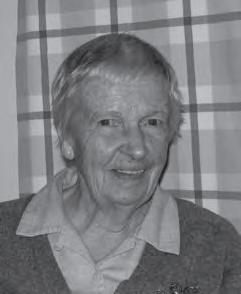

CHILD, Margaret (Bond) BA (1944 History)
CONN, Mary (Summer) BA (1947 Geography, 1948 Archaeology and Anthropology)
DAVOLL, Helen (Frenkel) BA (1943 Natural Sciences) PhD (1946 Chemistry)
DUNCAN, Joan Margaret (Salmon) MA (1946 History)
HULME, Marjorie BA (1941 Moral Sciences)
WILLIAMS, Vera Florence (Grubb) MA (1944 Classics)


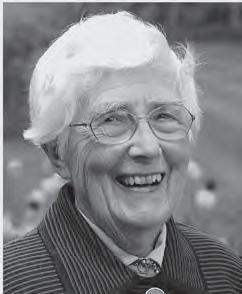

DAVOLL. On 12 November 2023, Helen (Frenkel) BA (1943 Natural Sciences), PhD (1946 Chemistry). Helen, the daughter of Russian émigrés, met and married John Davoll while undertaking her doctorate. After two years working in New York, they settled in Shepperton, Middlesex. In the 1960s Helen returned to work in the library at the Milk Marketing Board until she and John retired to Great Bookham in 1991. After John died in 2009, Helen continued her involvement in village activities including the local residents’ association, Scottish dancing, U3A and then U4A. Throughout her life she enjoyed gardening and the countryside, dating back to the 1940s when her school was evacuated to Tintagel. She was a Guardian reader for 70 years, and lived in her own home until near the end.
DUNCAN. On 27 June 2023, Joan Margaret (Salmon) MA (1946 History). Joan won a blue and captained the Women’s Lacrosse team while at Girton and afterwards trained as a teacher in London, before teaching history at St George’s Ascot, then Ashford School, Kent. In 1957 Joan went out to work at the newly opened Arundel School in Salisbury, Rhodesia. Arundel was a progressive school which aimed to improve and expand girls’ education; it soon found fame for producing the best public exam results in Africa. In 1961 Joan married Jimmy Duncan, and together they moved back to the West Country. For the following 60 years Joan lived in Winscombe, raising four children and nine grandchildren, and devoted most of her efforts to the garden, the church and the community.
ELLIOTT. On 8 April 2024, Jacqueline Edith Hind MA (1948 Mathematics). Jacqueline had a successful and varied career after Girton, going on to gain a PhD in Miami and teach in various schools, colleges and universities including many years in America, the Bahamas and later for the Open University in the UK. She died aged 94, with her sister Patricia (1946 Mathematics) by her side.
GRAY. On 8 January 2024, Hilda MA (1947 Natural Sciences)
HULME. On 28 January 2024, Marjorie BA (1941 Moral Sciences). After teaching
at the Collegiate School Blackpool, and Wade Deacon Grammar School Widnes, Marjorie—who has died aged 101—became Headmistress of Leigh Girls’ Grammar School near Wigan at the youthful age of 32. In 1961 she was appointed Headmistress of Withington Girls’ School Manchester where she stayed until her retirement in 1985. Marjorie had rowed stroke in the Cambridge University Women’s VIII, so it was no surprise when in 1946 she helped to found the Girton and Newnham Association of Old Students. This later became the Manchester Association of Cambridge University Women (MACUW). It was finally dissolved in November 2022 after 76 years. For much of that time Marjorie was on the committee, serving as Chair for a while. Her many pupils and former colleagues recall a shrewd, smartly turned out, humorous and very effective school leader and manager who was an inspiring role model. She continued to complete The Daily Telegraph cryptic crossword and do Sudoku long into her retirement, walking to the newsagent daily for exercise.
HUMPHREYS. In January 2023, Joyce (Bosomworth) BA (1945 Natural Sciences)
MEGSON. On 16 December 2023, Barbara Elsie MA (1948 History). See Obituaries
SANDERS. On 30 May 2023, Barbara (Camplejohn) MA (1948 History)
WILLIAMS. On 15 December 2023, Vera Florence (Grubb) MA (1944 Classics). Vera was born and grew up in the Walworth area of south London, the daughter of a postal worker. When war broke out, 13-year-old Vera first stayed with relatives in West Sussex, then joined her school near Yeovil in Somerset. While there, Vera gained a place at Girton to read Classics, although she had studied little Greek and in spite of the family home being struck by a small incendiary bomb while she was staying there on the eve of her interview. At Girton, Vera made life-long friendships and went on to teacher-training in Oxford. She taught Classics at Wakefield and Bromley High Schools, then joined the staff at the Senate House, University of London in the department of Extra-Mural Studies.
Vera married Frank Williams, a chartered engineer, and they had two children, Robert and Sarah (1985 Classics). Vera returned to teaching at Charles Edward Brooke School, where she had been a pupil, until her retirement. Vera enjoyed touring holidays in the UK and France, and was a keen gardener and visitor to museums and galleries.
1950 – 59
ANSTICE. On 26 March 2024, Judith Mary (Williams) MA (1955 Mathematics) For many years Judith was the Secretary and Girton representative of the Manchester Association of Cambridge University Women (MACUW). She was one of the founders, in 1961, of INTINCO LIMITED (International Investment Computers). Later she taught A-level Mathematics and Computer Studies at Altrincham Girls’ Grammar School and Withington Girls’ School. An outstanding wife, daughter-in-law and mother, her entire life was devoted to women’s and girls’ educational opportunities.
AXFORD. On 28 September 2023, Wendy Anne (Camps) MA (1951 MML)
BAINBRIDGE. On 20 March 2023, Peta Margaret Celia (Lawrence) BA (1955 MML)
BARKER. On 21 November 2023, Helen Mary (King) MA (1959 Natural Sciences, 1961 Archaeology and Anthropology). Helen followed Girton with a PGCE from UCL and then taught science at Wycombe High School, and St Albans and Ipswich High Schools. She married Alan Barker (who was at Trinity) in 1966, climbing Mount Kilimanjaro on their honeymoon and then moving to Suffolk, where they built a house and where Helen created a beautiful, wild garden, indulging her lifelong passion for botany. While raising their family of three, Helen immersed herself in the Girl Guide movement. She was County Commissioner for Suffolk in the 1980s, then organised and ran regional and international training camps, and was elected to the UK Council in 1990. In 1991, she became Chief Commissioner and later President of British Guides in Foreign Countries. She was Chair of Governors at a local school, on the Board of Ipswich Hospital Friends and was involved in the Suffolk
Gardens and Suffolk Historic Churches Trusts. She was recognised with an MBE for services to the Community in 1998. Perhaps her most significant role was in spearheading the creation of the Dominic Barker Trust for Research into Stammering, in memory of her elder son. She was a loving and much-loved wife, mother, and grandmother of three.
BARKER. On 27 January 2024, Sheila Margaret (Moore) MA (1953 Geography). Sheila, a hockey blue, followed Girton with a PGCE at the Institute of Education in London, and then taught at Lord Digby's School, Sherborne; Nelson College for Girls in New Zealand; and as Head of Geography at Barrow in Furness Grammar School. She married Charles, an RAF officer, in 1968 and lectured at Hereford College of Education. Settling in the south-west again where she taught until retirement, she enjoyed foreign travel, her dogs, visits to Cornwall and gardening at home in Somerset.
BROWN. On 26 November 2023, Alison De Bois (Roberts) BA (1958 Archaeology and Anthropology)
BURCH. On 25 July 2023, Ann Lindsay MA (1958 Mathematics)
CHALLIS. On 16 October 2023, Rosalie Ann (Hughes Jones) (1957 MML). Rosalie was ahead of her time in having a portfolio career. After graduating, she did a secretarial course and then an MA in French at King’s College, London (which she gained with distinction). She worked variously in higher education, journalism, publishing, and the charity sector. Her first marriage ended in divorce, and it was while working for the Good Book Guide that she met her second husband, the photographer John Challis. Rosalie was a devoted Girtonian and a generous benefactor to the College. The elegant chairs used on High Table were among her gifts.
CHANNELL. On 28 November 2023, Sonia MA (1955 Natural Sciences). After graduating, Sonia studied clinical medicine in London and did her junior rotation in Whitechapel before working at the Northern General Hospital in Edinburgh. She completed her GP training in Milton Keynes before returning to Edinburgh to practise as a





GP. She became a partner in 1973 in The Long House Practice in Trinity, serving the community there for over 20 years, a solid, reliable hard worker generous with her time. Outside work she kept up with many friends, always showing a genuine interest in their families and known as Aunt Sonia to a number of children. When she was younger she was an active hill-walker, and after building her own house in Trinity she became an avid gardener. She was also an excellent seamstress, making bridesmaids’ dresses for a friend's daughters, and she travelled extensively. She is survived by her sister Clare.
CLARK. On 5 August 2023, Fiona McKenzie (Mill) MA (1956 Economics, 1957 Law). Following Girton, Fiona worked for several years at the legal publisher, Sweet & Maxwell, where she met and married Charles Clark. Soon they had four children under two and a half and for the next 20 years the focus of her energy and interest lay with her family. She was the rock on which Charles built his distinguished career as a publisher and copyright expert, and her pleasure in her children and grandchildren’s happiness and achievements was tangible, though her part in it all she never claimed. Later, she became Secretary of the Royal Literary Fund, a magistrate, a trustee of King’s College Hospital and took on numerous other voluntary roles. Friends, including Caroline Moseley (Hanson, 1956 English), remember her as hugely bright, confident, honest, loyal and utterly reliable with a lawyer’s mind and a dedication to the public interest. She loved concerts, Suffolk, walking, books and good food, and is survived by her children and grandchildren.
sitting in West London, including specialist work in the Family Courts. This led to her volunteering in schemes both to increase literacy in children, and to help parents in prison keep up links with their children by reading stories which were then taped and sent home. Without a doubt, hers was a life well lived: spreading her love of English Language and Literature that had been honed at Girton and including considerable public service. The great sadness of her life was that her daughter, Casso (Cassandra), died while working abroad for VSO as a forester in 1991. Pamela is survived by her other children Caroline and Jethro, and her granddaughter, Olivia.
ANSTICE, Judith Mary (Williams) MA (1955 Mathematics)
BARKER, Sheila Margaret (Moore) MA (1953 Geography).
CHALLIS, Rosalie Ann (Hughes Jones) (1957 MML)
CHANNELL, Sonia MA (1955 Natural Sciences)
DARKE, Dorothy Marie (Meyer) MA (1951 Geography)
CLUNIES-ROSS. In 2023, Pamela Averil (Ingram) MA (1954 English). At Girton Pamela made friendships which lasted all her life. She worked as a publisher, first in the USA in the 1950s and then in the UK. After some years raising her family, Pamela retrained as a librarian and was Director of the Poetry Society for many years, then a freelancer organising various literary events, co-creating Mare's Nest Publishing and working as a director of the Anvil Press. She became a magistrate
CORNWELL. On 1 February 2024, Hilary Margaret (Lord) BA (1951 Natural Sciences) DARKE. On 11 January 2024, Dorothy Marie (Meyer) MA (1951 Geography). Dorothy, the daughter of a Jewish leather manufacturer who had escaped to England just before the war, made history at College when in her second year she decided to marry Michael Darke (son of the composer Harold Darke). Girton did not then accept married students, but she somehow persuaded her tutor, Alison Duke, that it would be a waste of money if she did not complete her studies. She therefore graduated in 1954 with a degree as well as a husband and a hockey blue. She was a person of passionate commitments and mischievous humour, who wrote poetry and loved to tell stories and sing. The whole family was musical, and Dorothy organised many concerts and youth orchestras. She was also a part-time teacher and became coordinator of multicultural education for West Sussex. In her 60s she did an MA in Peace Studies at the University of Bradford and her thesis examined the stories of ten young Germans (including herself) who had fled to Britain to escape Nazi persecution, which she published as The Leaves Have Lost their Trees. A Quaker with ecumenical views, Dorothy was an enthusiastic supporter of Neve Shalom/ Wahat al Salam, the model Peace Village in Israel where Jews and Arabs live together. When Michael retired the couple moved to Oxford where Dorothy became an active member of the Oxford Region Girtonians. She is survived by her four children and many grandchildren.
EDWARDS. On 29 March 2024, Rosemary Ann (Moore) BA (1955 Economics) MBE
FARRINGTON. On 22 January 2024, Mary Valerie (Poole) MA (1957 MML). Energetic and vivacious, Mary loved to share her enthusiasm for life and sense of fun with those around her. She joined the University Pentacle (Magic) Club, performing ‘Mammoth Memory’ in their 1958 summer tour of Germany alongside her future husband Ted (1957 Clare). Mary was an enthusiastic French teacher and had a lifelong passion for language and poetry. She was a keen gardener, cook and all-round Epicurean. She continued cycling well into her 80s. Mary will be missed by her four children Rachel, Ben (1985 Management Studies), Ruth (1994 Newnham) and Dan and eight grandchildren.
FOSTER. On 27 March 2024, Kathleen Sheridan (Bullock) MA (1952 English, 1953 Moral Sciences, 1955 Natural Sciences). After Girton Kay became a mental health research fellow at the Institute of Education, Cambridge, before marrying Christopher Foster who was a lecturer in Manchester, later Sir Christopher the eminent economist. They were married for 64 years and had five children and five grandchildren together, living in Oxford, the USA and London where Kay practised as a psychotherapist and as a magistrate in the City of London. Known for her wit and elegance, she was an avid reader, theatre and opera lover. Kay adored her time at Cambridge where she made her closest friends and kept them. She had fond memories of singing in a madrigal choir under Boris Ord and gave an acclaimed performance as Cressida in Peter Hall's CUADC production of Troilus and Cressida Her second daughter was named after her role. Her oldest son was named after her tutor Oliver Zangwill and her youngest daughter Melissa after a Greek fellow Girtonian. Cambridge was present throughout her life.
HUNTER. In February 2024, Margaret BA (1955 Natural Sciences)
HUTCHISON. On 26 December 2023, Mary (Spettigue) BA (1953 Law)
KILLICK. On 1 July 2023, Dorothy Margaret MA (1950 Classics)
LAWSON. On 6 November 2023, Katharine Anne (Bell) BA (1955 MML). Katharine met future husband Alan in her first week at Cambridge at a translation class. In their final year they were supervised together at Girton by the redoubtable Dr Alison Fairlie, special permission having been granted to Alan to enter College in the mornings to attend the supervisions. After graduating Katharine went to teach at Henley Grammar School. She married in July 1959 and left Henley when expecting her first child, Clare. Less than two years later she gave birth to twins, Robert and Marion. When they were nearly four she went part-time to Goffs Grammar School, Cheshunt. Later, she taught full-time at Stevenage Girls’ School which eventually was amalgamated with the Boys’ School under the name of the Thomas Alleyne School. She retired in 1995 with an enhanced pension, it being the policy of Hertfordshire County Council at that time to encourage experienced but expensive members of staff to retire. It suited her very well: she was able to get very involved with the care of the grandchildren but continued for some years to go back to Alleyne’s from time to time as a supply teacher. In 2003 she suffered serious head and knee injuries when a van drove into her as she was crossing a local road. These injuries affected, in particular, her vision and her sense of balance and at one time it seemed that she would never walk again. However, her determination was such that after three months she was able to return to her normal activities, including sailing with Alan on the River Blackwater and singing with the Hertford Choral Society, of which she was a longstanding member. Throughout the whole of her life she remained in touch with her contemporaries at Girton, in particular Peta Bainbridge (Lawrence) and Gabrielle Graham (Kerr). She is survived by Alan, Clare, Robert, and six grandchildren.
LEIGH. On 24 December 2023, Rosemary Renée (Furze) BA (1954 Geography)
MONCASTER. On 30 June 2023, Gillian Ann (York) MA (1957 English)
SCHOFIELD. On 5 September 2023, Jennifer Anne (Plowman) MA (1950 English). Jennifer dedicated her life to

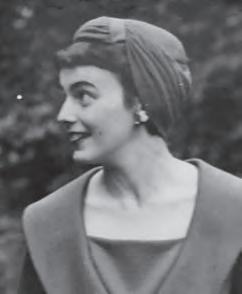
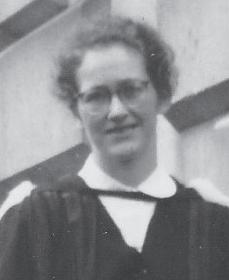


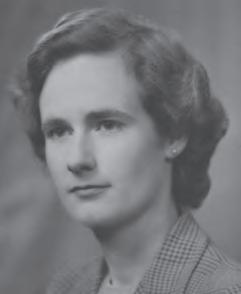
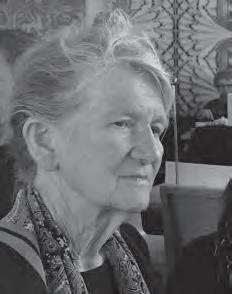
FARRINGTON, Mary Valerie (Poole) MA (1957 MML)
FOSTER, Kathleen Sheridan (Bullock) MA (1952 English, 1953 Moral Sciences, 1955 Natural Sciences)
LAWSON, Katharine Anne (Bell) BA (1955 MML).
SCHOFIELD, Jennifer Anne (Plowman) MA (1950 English).
UNMACK, Eleanor (Tait) MA (1958 Classics).
WALLACE, Flora Rosalie (MacLeod) MA (1952 Music).
CHILLINGWORTH, Ann Cameron (Duff) BA (1961 English).
teaching. She was Headmistress of Bromley and Portsmouth Girls’ High Schools (both Girls' Day School Trust) and earlier in her career had taught English at Haberdashers’ Girls and Eliots Green Grammar School. She loved her pupils and was a great advocate of girls’ education. Jennifer was also an authority on Capt W E Johns and Biggles. She loved travelling, wrote poetry and adored her cats. Together with her husband Allan, she was a strong advocate of TEAM (The European Atlantic Movement). Her deep knowledge and love of art, culture, literature and poetry were inspiring and live on.
SCOTT. On 19 September 2023, Shirley Frances (Wiltshire) MA (1954 History)
SEABRIGHT. On 30 June 2023, Diana Bartlett (Fairbairn) BA (1951 English, 1952 Theology and Religious Studies)
STANFORD. On 14 October 2022, Mary Gwynneth (Fish) BA (1957 Geography)
UNMACK. On 5 February 2023, Eleanor (Tait) MA (1958 Classics). After marrying lawyer Tim Unmack in 1966 and moving out of London, Eleanor threw herself into the work of her local RSPCA centre, in all its aspects. She was tireless in rehoming rescued creatures: son Neil remembers her suggesting to one of his school friends that his family could accommodate a boa constrictor. Horses she took herself if she could, and personally oversaw their return to health in the fields and stables adjoining her home. In addition, and like her mother Margaret Tait (Gray, 1928 Geography), she worked as a trustee of the RSPCA, being re-elected over many years. She kept her spirit of adventure. Gillian Lachelin (1958) remembers shared holidays, always hugely enjoyable, if at times slightly alarming, with elephants in East Africa and sea rocks in Turkey looming rather too close on occasions. Especially memorable was a trip through Kyrgyzstan with its spectacular mountains, lakes and flowers.
WALLACE. On 13 May 2024, Flora Rosalie (MacLeod) MA (1952 Music). Flora was born in Catterick and came up to Girton as organ scholar in 1952, like her mother Rosalie MacLeod (Wetton, 1919 Modern Languages). She always remembered her time at Girton with
great fondness. Highlights for her were her production of Handel’s Athaliah conducted by Ann Eminton in 1954 and of the Toy Symphony, involving several Girton Fellows. After graduating Flora taught piano and was a pianist and performer. She married Charles Wallace in Edinburgh in 1956 and leaves four children and four grandchildren.
WARD. On 22 March 2024, Patricia Jeanette (Nobes) BA (1951 History)
CHILLINGWORTH. On 25 May 2023, Ann Cameron (Duff) BA (1961 English). Ann was originally from Tyneside, remaining closely interested in the North East throughout her life. While at Girton she became a member of the newlyrevived Cambridge University Women’s Boat Club and rowed in the VIII that beat Oxford on the Isis in 1964. Her family still proudly displays her commemorative oar on the wall. In her years at Girton, Ann gained lifelong friends who have met together regularly since graduation.
DAVIES. On 31 December 2021, Hilary (Waters) MA (1966 Natural Sciences)
JEFFREYS. On 12 September 2023, Elizabeth Mary (Brown) MA (1960 Classics). See Obituaries
KERSLAKE. On 7 February 2023, Celia Jocelyn MA (1965 Oriental Studies)
KIRKBY. In March 2024, Christine (Billingham) MA (1961 English)
MCILWAINE. On 26 October 2023, Gillian Margaret (Leathem) MA (1964 Theology and Religious Studies, 1966 Classics). Gillian died peacefully aged 78 of dementia, after eight months of illness, having led a fulfilling and happy life. She greatly enjoyed her years at Cambridge, was a keen member of the Christian Union, and made friends who remained in touch to the end of her life. She is deeply mourned and greatly missed by husband Karl and sons Andrew and Nigel as well as all who worshipped with her at St John’s Church, Harborne, Birmingham.
MEHTA. On 16 September 2023, Gita (Patnaik) BA (1963 English). See Obituaries
NEIVA. On 3 May 2019, Ana Margarida Ribeiro PhD (1966 Natural Sciences). Ana returned to the University of Coimbra after her doctorate on the ‘Geochemistry of late-stage granitic rocks from northern Portugal’. Following the ‘carnation revolution’ of 1974 she moved to Brasilia before returning to Portugal in the late 1970s, first as Associate Professor at the University of Porto, then from 1983 as a Professor at Coimbra, her home town. She published widely and during a long career supervised 11 PhDs and 10 MSc students. She collaborated with researchers in 15 countries and with the Portuguese National Geological Survey as well as being a member of a number of international scientific academies. Her other great passion was her farm in S. Mamede de Ribatua, in the Douro Valley, where she never missed a wine harvest.
ROBERTS. On 23 February 2023, Anne-Marie (Mangham) MA (1969 History). A proud Eastender, after Girton Anne-Marie qualified as a solicitor and began work in private practice. She later rose to senior positions within the Legal Aid Agency. Then, for 14 years, she was a Deputy Clerk at the Solicitors’ Disciplinary Tribunal where colleagues recall a clever, funny and warm-hearted presence, dealing with those appearing before the Tribunal with compassion, empathy and fairness. Anne-Marie is deeply missed, and following its relocation to its new premises at 45 Ludgate Hill, the Tribunal named its number one court ‘The Anne-Marie Roberts Room’. Earlier this year her family unveiled the nameplate in her memory.
WIDDEN. On 7 December 2023, Susan Margaret (Paterson) BA (1963 Classics) While at Girton Sue met future husband Martin Widden, who was studying mechanical engineering at Trinity Hall. They married in 1966 and moved to Lancaster in 1972 when Martin was appointed to a post at the University. Sue became deputy manager of Lancaster Citizens’ Advice Bureau and a keen volunteer with Citizens’ Advice North Lancashire. She was trustee, membership secretary and newsletter editor of the Friends of the Judges’ Lodgings Museum in Lancaster, and a stalwart supporter of Lancaster Civic Society and of the Lancaster and District Homeless Action Service. Sue is survived by Martin, their sons James and Stephen and two grandsons.
WOODROFFE. On 11 October 2023, Rosemary Hain Miller (Colquhoun) BA (1967 Classics). After a year at Hughes Hall and a period living and working in London, Rosemary returned to her home city of Edinburgh. She qualified as a solicitor, working in private practice for some years before joining the Local Authority Ombudsman's office. During her time there she met Geoffrey, also a Cambridge classicist, and Professor of Consumer Law at Brunel. They were very happily married for some 18 years. They enjoyed travelling, often in connection with Geoffrey's work. Rosemary was an active trustee, Chair, committee member and supporter of a large number of organisations. Geoffrey predeceased her, and she is survived by her brother, sister-in-law and nephew.
AFZAL KHAN. On 18 July 2023, Zishan Ain MA (1977 History). Zishan, known as Mouse to her many friends, came from a well-connected Karachi family, and her father, uncle and two cousins had attended Cambridge. Her maternal aunt was a Girtonian too (Zarrin Bokhari, PhD 1961 English). Settling in Islamabad, Mouse was famed as a saloniste: elegant, sociable and with a love of art and collections (including collections of people). She founded Khaas (‘Special’ in Urdu), a contemporary art gallery and café, which became a notable


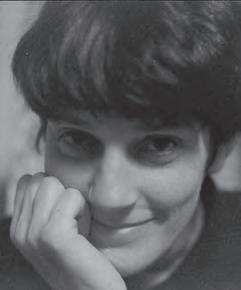

feature of Islamabad’s cultural scene. Her sister Shayan ‘Poppy’ (1982 History) joined her in managing it and over the years Khaas expanded into a place for free thinking where artists, musicians, curators and those interested in progressive politics could meet and talk. Mouse was also a tireless charity campaigner. When her sister died, she adopted her two nieces and brought them up.
DAWSON. On 6 January 2024, Shiona Catherine BA (1972 Natural Sciences)
DUNN. On 27 December 2023, Caroline Mary (Colley) MA (1973 Law)
EATON On 23 November 2023, Felicity Jennifer Margaret (Borrowdale) MA (1971 Natural Sciences), PhD (1974 Biochemistry). Margaret went from Girton to a varied career of industrial chemistry, scientific publishing and teaching secondary science, as well as raising two boys: David and Nicholas. She loved Scottish dancing, cars, black dogs and her Christian faith, themes that continued throughout her life. Times of illness limited her reach, but she spent her final years in Grangeover-Sands, Cumbria, sitting watching the bay weather roll in, running a local charity shop, driving a Bentley and later a Jimny, and embracing new adventures. Ever curious, perceptive, thoughtful, kind, funny, eccentric, generous and warm, she will be much missed.
enjoyed going on holiday with friends, including two she first met at Girton.
VENET. In 2023, Jane Frances (Holloway) BA (1974 Theology and Religious Studies)
WALKER. On 18 January 2024 Susan Lilian (Wren) MA (1972 Classics)
GBINIGIE-THOMPSON. On 28 January 2024, Oghenekome Abisoye MA MB BChir (2004 Medicine Sciences). Kome built her career as an academic GP in Oxford where she was a co-investigator and co-author of treatment trials for Covid-19. Kome’s inquiring nature contributed to her academic and professional excellence. She approached life with genuine joy and it was this, along with her gentleness, warmth, kindness, and mischievous sense of humour, that made her a much loved friend to many at Girton. She made the ordinary feel special, and her enthusiastic storytelling kept shared memories alive and vivid. Kome was singular, and has left an indelible mark on all who knew her. Family was everything to her, and she took pride in her Nigerian heritage. Her Girton friends were delighted to celebrate her marriage to Chris Thompson in September 2023 and are devastated that she was gone so soon after. They miss her very much.
MCILWAINE, Gillian Margaret (Leathem) MA (1964 Theology and Religious Studies, 1966 Classics)
WOODROFFE, Rosemary Hain Miller (Colquhoun) BA (1967 Classics)
KELLOCK, Cleo Olivia Roberts (Hall) MA (1976 ASNAC, 1977 Land Economy)
GBINIGIE-THOMPSON, Oghenekome Abisoye MA MB BCHir (2004 Medicine Sciences)
KELLOCK. On 10 June 2023, Cleo Olivia Roberts (Hall) MA (1976 ASNC, 1977 Land Economy). Cleo, a History Exhibitioner, was disappointed in the College, both academically and pastorally, but stuck at it and made friends for life, as well as meeting her husband (James Kellock, 1975 Trinity). Following Cambridge she joined the National Magazine Company as a fashion assistant on Cosmopolitan. She then became a sub-editor, the area in which she worked for the next 40 years, mainly on women's magazines. Married in 1984, Cleo had three boys in quick succession. As well as looking after the children she gained a BSc in Environmental Science at the University of Greenwich. She didn't surprise anyone by getting a First and the annual prize. Cleo was diagnosed with breast cancer in 2011; in the last few years she very much
LEE. On 30 July 2023, Brian Chi Ho BA (2020 Natural Sciences). See Obituaries
LIU. In June 2024, Xiao Ming (2019 PhD Clinical Biochemistry). Xiao Ming sadly drowned in an accident off the coast of Japan this summer.
Catering
Valeriia Afanasieva
Theodore Anderson-Besant
Crystal Bicknell
Stephen Butcher
Jonathan Christmas
Dawid Gabrysiak
Fabio Jeyakumar
Sandor Kapusi
Emma-Louise Leggett
Nicola Plumb
Colin Sizer
Arnas Skirius
Ian Stewart
Pawel Swieboda
Veronica Thompson
Deryn Warner
House Services
Adam Darnell
Dragos Reit
Human Resources
Nicola Edward
Tameekha Mukrani
Zuzanna Roberts
Gardens
Gemma Barron
Emma Peirce
Girton Global Programmes (GGP)
Angela Stott
Sarah Wordsworth
Porter’s Lodge
Carl Hodson
Maintenance
Lee Beddow
Stephen Scarr
Mistress’s Office
Freya Paulucci Couldrick
Library and Archive
Jude Brimmer
Nurses
Maria Gloag
Senior Tutor and Student Services
Angela Newman
Lydia Devonport
FAREWELL
Catering
Theodore Anderson-Besant
Christopher Cooper
Dawid Gabrysiak
Miguel Godoy Mandiola
Ioannis-Christos Gourgiotis
Tia Hamon
Julie Lister
Stella Ormrod
Nicola Plumb
Pawel Swieboda
Jasmine Touchent
Lalena Walkley
Deryn Warner
Gardens
Rachel French
House Services
Susan Burchell
Rafal Juszczak
Human Resources
Gwen Quigley
Claire Saunders
Maintenance
Adam Law
Stephen Scarr
Library and Archive
Arianna Koffler-Sluijter
Nurses
Jacqueline Isbister
Porter’s Lodge
Wayne Newton
Student Services
Tessa Doubleday
Postgraduate Students 2023-24 INTAKE 188
Total number of POSTGRADUATE STUDENTS 371
Undergraduate Students 2023-24 INTAKE 143 + 4 Foundation Year
Total number of UNDERGRADUATE STUDENTS 533
533 371 143 188 8
9
Postgraduates who went on to HIGHER DEGREES at Girton in 202324
Undergraduates who went on to POSTGRADUATE STUDIES at Girton in 202324
94 Emily Davies Bursaries totalling: £270K
£270,000
Three Margaret Barton Bursaries; the Bateman Bursary for Economics; the Elizabeth Brown Bursary; the Class of 1958 Bursary; the Class of 1970 Bursary; the Class of 1978 Bursary; the Class of 1981 Bursary; the Class of 1982 Bursary; three Class of 1985 Bursaries; two Class of 1990 Bursaries; the Juliet Dusinberre Bursary; the Margaret Norah Fulcher Bursary; the Sybil Lewis Bursary; the Jean Lindsay Memorial Bursary; the Ellen McArthur Bursary; two Dr Christine McKie Bursaries; six E Joan Miller Bursaries; the Northcroft Bursary; two Paresh Patel Bursaries; the Gillian Somerscales Bursary; two Anne and Caroline Wilson Bursaries; the Wittman Curry Bursary; and the Elma Wyatt Bursary
37 Other Undergraduate Bursaries totalling: £118K
£118,000
45 Student Support Grants from the Buss Fund totalling: £7,000
£7,000
4 Pioneer Awards totalling: £500
13 Rose Awards totalling: £8,000
38 Grants for academic-related costs, including second language learning, from the Academic and MB Thomas Funds totalling: £8,000
£16,500
8 Grants for second language learning totalling: £1,140
17 Student Support Grants from the Pillman Fund totalling: £4,500
46 Grants for academic-related costs from the Pillman Academic Fund totalling: £9,400
£15,040
Help us to BUILD A FUTURE in which every student flourishes at Girton. DONATE to our Annual Fund and be a part of:
Excelling in the academic life of the College should not depend upon a student’s financial situation. We want all students facing pressures around the cost of living to have access to support.
By adding further on-site welfare provision to support our Head of Welfare we will ensure that access to healthcare and wellbeing never prevents our students from reaching their potential.
Visit our website to find out more about our fundraising priorities. Alternatively, scan the QR code opposite with your mobile phone. www.girton.cam.ac.uk/annual-fund
A well-rounded education involves more than academic study. Our goal is to open up enriching activities in music, the arts, sports and more to all Girton students, whatever their financial situation.
Through the Girton Skills Programme, we aim to elevate our students’ approach to academic study and build crucial competencies for their careers.
. Preparing Girtonians for the future is our priority. Girton’s Careers Accelerator Programme inspires students to take charge of their career ambitions through workshops, internships, and volunteering.
One-off donation of:
Regular donation of:
Per month Per quarter Per year
The Annual Fund
Other (Please Specify)
Please contact the Development Office if you would like more information about specific funds or to discuss other aspects of your donation.
Standing orders can be set up via your own bank, either online or in person. If you choose to donate via standing order, please notify the College when you have done so, either by returning this form or by emailing: development@girton.cam.ac.uk
I would like to receive more information about leaving a gift to Girton College in my will. I have already included a gift to Girton College in my will.
0JG. Alternatively you can email the form to development@girton.cam.ac.uk Girton College likes to keep in touch with all our alumni and supporters and data held by the College will be used for alumni relations and fundraising purposes. For more details about how we use this information, please visit www.girton.cam.ac.uk/data-protection
I have donated by Bank Transfer. I enclose a cheque/CAF voucher made payable to Girton College.
Donate by Bank Transfer
Please return the completed donation form and Gift Aid declaration (if appropriate) to The Development Office, Girton College, Cambridge CB3
To donate via bank transfer, please add your last name and first name (space permitting) to the payment reference and transfer to the following:
Account Number: 40207322 Sort Code: 20-17-68
Barclays Bank PLC, St Andrew's Street, Cambridge CB2 3AA
SWIFTBIC: BARCGB22
IBAN: GB75 BARC 2017 6840 207322
Please notify the College when you have made your donation by returning this form, or by emailing the details to development@girton.cam.ac.uk
Donate with your Phone

Please scan this code with your mobile device to donate
Donate by Credit/Debit
Should you wish to give by credit or debit card or direct debit then please do so online at: www.girton.cam.ac.uk/giving. Or by calling the Development Office on +44 (0)1223 766672.
In order to Gift Aid your donation you must tick the box below. Please check all information is correct before signing and dating.
I want to Gift Aid my donation and any donations I make in the future or have made in the past 4 years to Girton College (Registered Charity Number 1137541)
I am a UK taxpayer and understand that if I pay less Income Tax and/or Capital Gains Tax than the amount of Gift Aid claimed on all my donations in that tax year it is my responsibility to pay any difference.
Signed:
Date:
Please note that HMRC requires charities to have the donor’s home address on the Gift Aid declaration. Please notify the Girton College Development Office if you want to cancel this declaration, if you change your name or home address, or if you no longer pay sufficient tax on your income and/or capital gains.
Name:
Year of Matriculation:
Address:
Postcode:
Telephone:
If you are a higher-rate taxpayer, please contact us for more information on tax-efficient giving.
2022/23 CROSSWORD SOLUTION
Sorting Out by Lex — Central row initially contains FAKE ROW FOR WEAK, each half of which may be rearranged to form the other; it is to be replaced by STRONG IS GIRTON, in which both halves are rearrangements of SORTING. Original answers to down clues: 3 blastema, 4 tartare, 7 ladino, 9 astare, 11 straik, 14 area, 15 chafe, 18 tawtiest, 20 pwned, 21 drapers, 22 flayer, 23 kennet, 24 oarage, 25 amen. Winners: John McCabe (1989 Mathematics), Rachel Omotani (Turner, 1967 Mathematics). Many thanks to Lex for setting four years of puzzles.
pp. 02, 104, 106 Phil Mynott; 09 (3) Reva Croft (4) J G Simpson of Cambridge, Girton College Archive, GCPH 3/1/1 (5) Girton College Archive, GCPH 11/23/50; 10 (2) Girton College Archive, acc 2324/01 (4) Girton College Archive, GCPH 11/1a/36; 13 (3) Rich Walker, ImageNorth;14 (1) Matthew Offeh; 16-17 Benedict Tuffnell/Row 360; 19 (3) Tamsin Elbourn-Onslow; 22 (1) Graeme Barker; 24-25 Maciej Pawlikowski; 30-31 Getty Images; 36-37 irisphoto1/Shutterstock; 42 Emily Cockayne; 50 Iyin Oshinowo; 94 (01) Giorgio Divitini (02) Alice Coyle (03) Luca Lukačević; 95 (04) Dik Ng (05) Anna Costa; 96 (06) Catriona Forrest (07) Ariana Strait (09) Taiyi Wang (10) Lucy Hinde; 122 Lizzy Maughan; 124 Jet Photography; 128 Greg White/Fairfax Media/Getty Images; 130 Penelope R Hall; and the friends and families of all those remembered ‘In Memoriam’. Other photographs were taken by the Mistress, Fellows and staff: Jimmy Anderson, Julia Andersson, Wayne Ardley, Emma Cornwall, Karl Dawson, Rachael Humphrey, Elisabeth Kendall, Freya Paulucci-Couldrick, Hannah Sargent and Hannah Westall.

The Cambridge Local Girton Association held talks in person and via Zoom throughout the year. In addition to those scheduled on Saturday mornings, two successful afternoon tea meetings were held to celebrate Christmas and the birthday of Emily Davies. We anticipated the academic year in August with a tour of Girton College Grounds led by Julia Andersson, Head Gardener, providing the opportunity to see the garden in its late summer glory, with the Emily Davies rose in bloom. The AGM was held in November and was followed by a talk from the Hon Dr Jocelynne Scutt on ‘Law and Literature’. Tim Sanders, saxophonist and session musician with Kick Horns for, amongst others, Eric Clapton, The Who, the Rolling Stones, Blur, Beyoncé and the Spice Girls, addressed the subject ‘You don't recognise me?’ at our Christmas Tea. In January, Dr Laura Abbott spoke about the complex issues involved in ‘Navigating the Challenges of Pregnancy in Prison’. A birthday tea for Emily Davies was held in April. In July Rachel Meller drew on her family history in a talk about her book, ‘The Box with the Sunflower Clasp: Uncovering a Jewish Family’s Flight to Wartime Shanghai’. The Association is indebted to Hilary Goy for generously hosting events and meetings at her home and via Zoom for those unable to attend in person.
E: clga@girton.cam.ac.uk
W: www.sites.google.com/site/cambridgelga
The London Girton Association visits usually have a cultural focus and often offer the opportunity to participate in a private group tour specially arranged for the London Girton Association. Highlights this year have included visits to Boston Manor House and the new Lambeth Palace Library as well as two very convivial coffee mornings hosted by LGA members. Boston Manor is one of London’s lesser-known gems, a fine Jacobean Manor House built for Lady Mary Reade in 1623 and recently restored; we had it to ourselves on a day when it is closed to the public. Lambeth Palace Library has been purpose-built to house the historic collections of the Archbishops of Canterbury, and we were fortunate to go behind the scenes to see the conservation studio. Our Book Circle has been running for over four years and has discussed over 60 books so far. We meet online to discuss a mixture of fiction and non-fiction. We are delighted to have been able to continue to support music at College through the London Girton Association Music Award.
E: lga@girton.cam.ac.uk
W: www.girton.cam.ac.uk/London-Girton-Association
While 2023/24 was very quiet, there are excellent plans afoot in the next 12 months for the Wales and the West Girtonian Association. There will be a talk in Bristol in November from the Mistress on Yemen, the Houthis and the Red Sea Conflict; an online lecture from a Girton Fellow in January 2025, shared with other branches; plus a political discussion event and an academic tour of the University of Bristol Botanical Gardens are in mind for the rest of the year. The WWGA looks forward to meeting familiar faces and encountering new ones. Everyone is welcome.
E: wwga@girton.cam.ac.uk
W: www.girton.cam.uk/wwga
Following the Mistress’s visit in April 2024 the New York Girton Association is keen to reinvigorate its activities. We would welcome hearing from any Girtonians who live, work or visit New York. Please email Emma Cornwall at the Girton Development Office to be added to the circulation list. We would also be happy to hear from any Girtonian who would like to speak at future events and/or who is interested in organizing an event.
E: e.cornwall@girton.cam.ac.uk
The Committee would be delighted to hear from any Girtonians based in Hong Kong. You can reach us by emailing Emma Cornwall at the Girton Development Office or by following our ‘Friends of Girton in Asia Pacific’ Facebook group.
E: e.cornwall@girton.cam.ac.uk
As well as regularly hosting events for visitors from College to Singapore there is now a WhatsApp group for Girtonians in Singapore. Please email Emma Cornwall at the Girton Development Office to be added to the group.
E: e.cornwall@girton.cam.ac.uk
Cover — 'Chateau Gaillard on the Seine' (1870) by Barbara Bodichon, Girton's co-founder. This watercolour was lent in 2024 by the College to the exhibition 'Now You See Us: Women Artists in Britain 1520-1920' at Tate Britain in London. (Girton College Archive 11/1a/33). Photographed by Maciej Pawlikowski.
